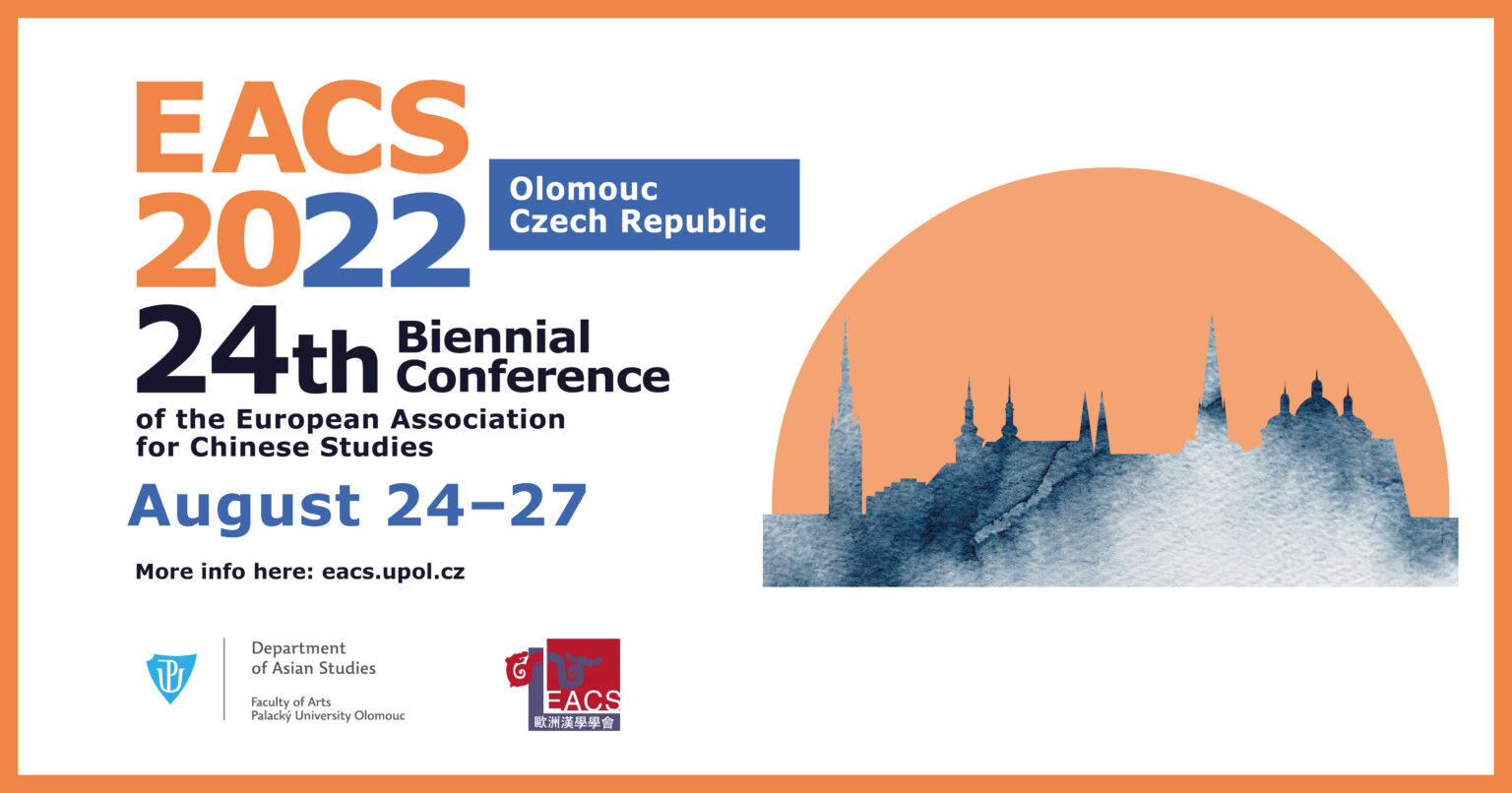In this section you will find announcements about all project-related activities: talks, conferences, guests, and virtual events.
A New Edited Volume
2023-11-22 00:00:00 +0000
A new edited volume in the series Jahrbuch der Deutschen Vereinigung für Chinastudien (Yearbook of the German Association for Chinese Studies) has just been published – and in it, three chapters written by members of the READCHINA team!
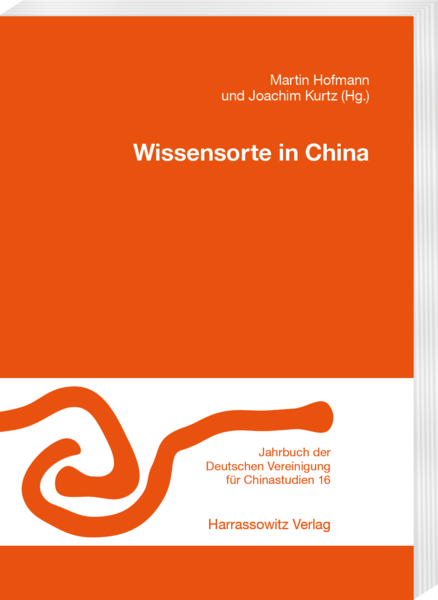
Edited by Martin Hofmann and Joachim Kurtz, the volume collects a dozen contributions related to the vast topic of ‘sites of knowledge’ and related questions of spatial dimensions of knowledge production and dissemination in China. For details on the book, see here. An Open Access version of all chapters will also be available a year after publication. In the meantime, if you are interested in reading any of the READCHINA contributions, simply get in touch with us.
Damian Mandzunowski’s chapter is titled: Factory State of Mind: Spreading “Three Ardent Loves” via Collective Reading Activities in Tianjin, 1983–1985, abstract:
Reading groups, the organizational structure arising from state-sanctioned collective reading activities, were a common occurrence in most workplaces of the People’s Republic of China from the 1950s until the 1990s. Industrial factories in particular were sites where knowledge was created, disseminated, and performed in reading groups in direct communication with the party-state’s subjects. This paper discusses the case of reading activities aiming to advance workers’ “ardent love for the motherland, for socialism, and for the party” in Tianjin in the early 1980s. By showing where the readings took place, analyzing what was read, and describ- ing the guidance of the activities, the paper reveals how the Chinese industrial space—a site for producing goods—became a site for producing political knowledge.
Eve Y. Lin’s chapter is titled “Cultural Biography of the “Avant-Garde”: Intellectual Bookstores and the Legacy of High Culture”, abstract:
The Nanjing-based bookstore “Librairie Avant-Garde” is an intellectual bookstore with cultural influence in contemporary China. Situated in a consumer society today, but also established as a place representing the high culture legacy of the 1980s China, this bookstore becomes a site where commercialization and the counter-drive of cultural autonomy intertwine. The ideal of cultural autonomy, embedded in the 1980s high culture legacy, is evoked by the bookstore in its employment of the mutating concept of the “avant-garde” over the years. This paper takes the bookstore as a case study to consider China’s high culture legacy since the 1980s. From the perspective of a cultural biography of places, the paper argues that, rather than causing a neat rupture in China’s cultural field, the ever-broader extent of commercialization in post-Mao China’s social life since the 1990s does not replace its high culture legacy as much as it casts the latter into a prolonged process of adjustment with the consumer culture. As a result, distinctions between the highbrow and the popular, modernism and postmodernism, spiritual autonomy and consumerist self-indulgence have become highly ambiguous in post-1990 China.
Lena Henningsen’s chapter is titled “Fictional Texts as Sites of Knowledge: From Intertexts to Transtextuality”, abstract:
Many fictional characters in Chinese literature are avid readers of literary prose, poetry, fiction, and nonfiction. This establishes a distinct web of texts, and thus patterns of intertextuality. Their reading acts often characterize these fictional characters. In literary texts produced after 1949, they are positioned clearly within the ideological framework set up by the literary dogma of the CCP. This dogma called upon the readers of fiction to emulate literary heroes. Using this as a starting point, I analyze the short story “Banzhuren” (The Class Teacher) by Liu Xinwu, published shortly after the Cultural Revolution (1966–1976). The multitude of texts read and discussed within this piece of fiction clearly locates the story within the literary and intellectual cosmos of the time. Moreover, the intertexts transform the story into a site where literary knowledge is debated, contested, and produced. Reading acts thus produce a site of knowledge within the fictional narrative. The short story offers interpretations of the intertexts and attains distinct meaning through the various texts referred to and discussed. At the same time, the interpretations of these intertexts mirror how the readers of “Banzhuren” may have perceived them. The short story and the texts referred to form what I call a “transtextual space.” Taking into account the fictional nature of the text, I argue that this particular type of transtextuality creates distinct imaginary spaces.
Happy reading!
Lena Henningsen to present the READCHINA and ChinaComx ERC-projects on 16 Nov. 2023 in Cologne
2023-11-10 00:00:00 +0000
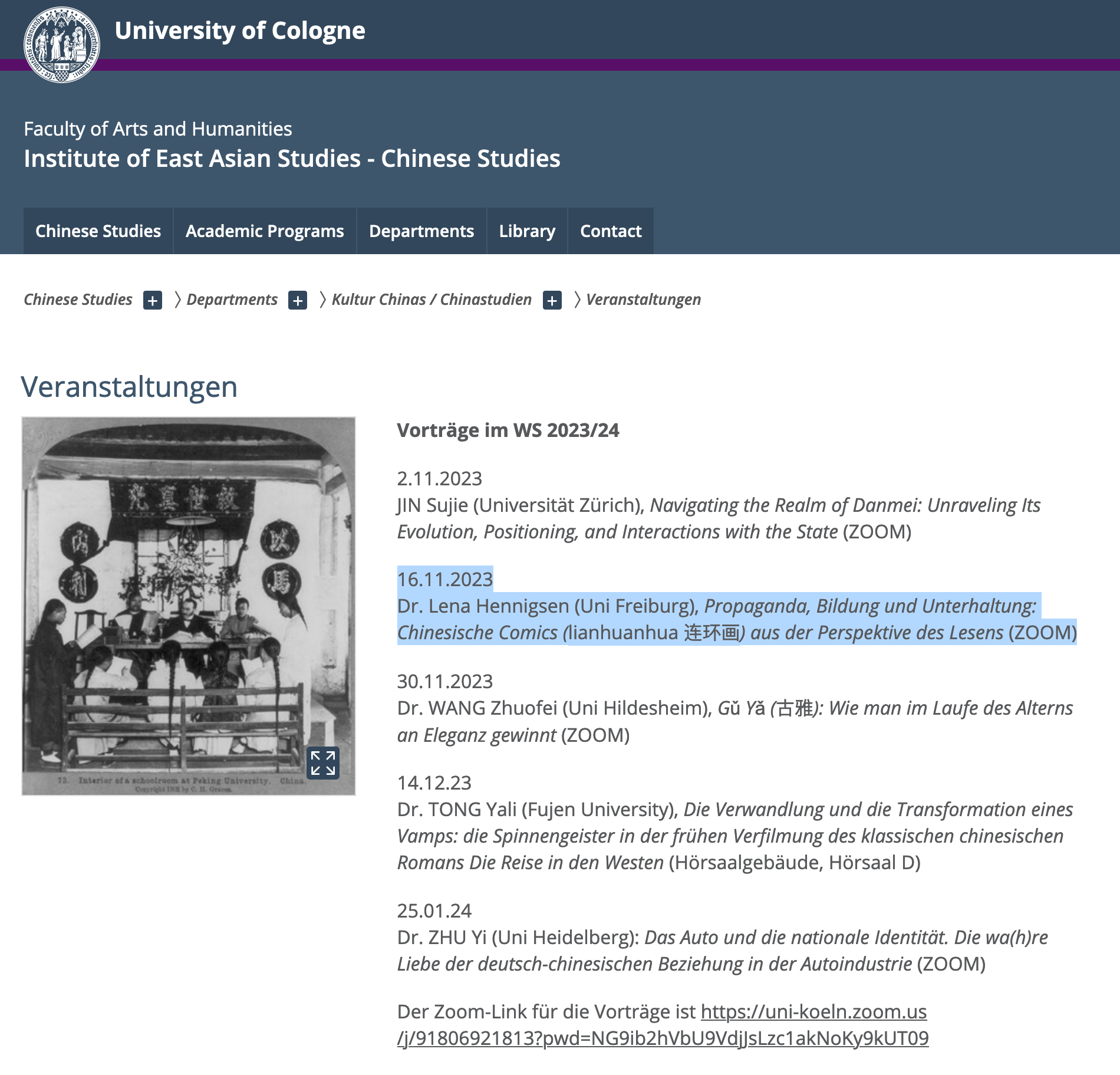
The coming Thursday, 16 November 2023, Lena Henningsen is giving a talk at the University of Cologne in which she will present about both the READCHINA project——which is sadly drawing to an end——and her upcoming new ERC-funded ChinaComx project, which is set to commence in January 2024.
The talk is titled „Propaganda, Bildung und Unterhaltung: Chinesische Comics (lianhuanhua 连环画) aus der Perspektive des Lesens“ and will take place on 16.11.2022 at 17:45 via Zoom, for the link click here.
Lena Henningsen will present READCHINA’s DH projects in Aix-en-Provence on September 4th, 2023
2023-08-24 00:00:00 +0000
On the 4th of September 2023, Lena Henningsen will present READCHINA’s DH projects on a workshop in Aix-en-Provence, hosted by the ERC project “Elites, Networks and Power in Modern China”. The topic of the presentation is “Reading Practices in the People’s Republic of China: Digital Tools developed by the ReadChina Project”.
Find the workshop online here.
New Translation by Damian Mandzunowski and Liu Chang Online Now in Revisiting the Revolution No. 3
2023-06-28 00:00:00 +0000
The new issue of Revisiting the Revolution brings Liu Yajuan’s study of the “Zhang Shunyou Incident,” in which Liu connects local and central politics through a granular exploration of the making (and unmaking) of a national model. Initially published in June 2013 as 「张顺有事件」:一个典型的「树典型」个案 in 中央研究院近代史研究所集刊, 第84期 (2013): 159-200, the article reads between the lines of official narratives, revisiting often overlooked sources (such as local media outlets or comic strips) to inspect the relation between the individual and the collective in political campaigns.
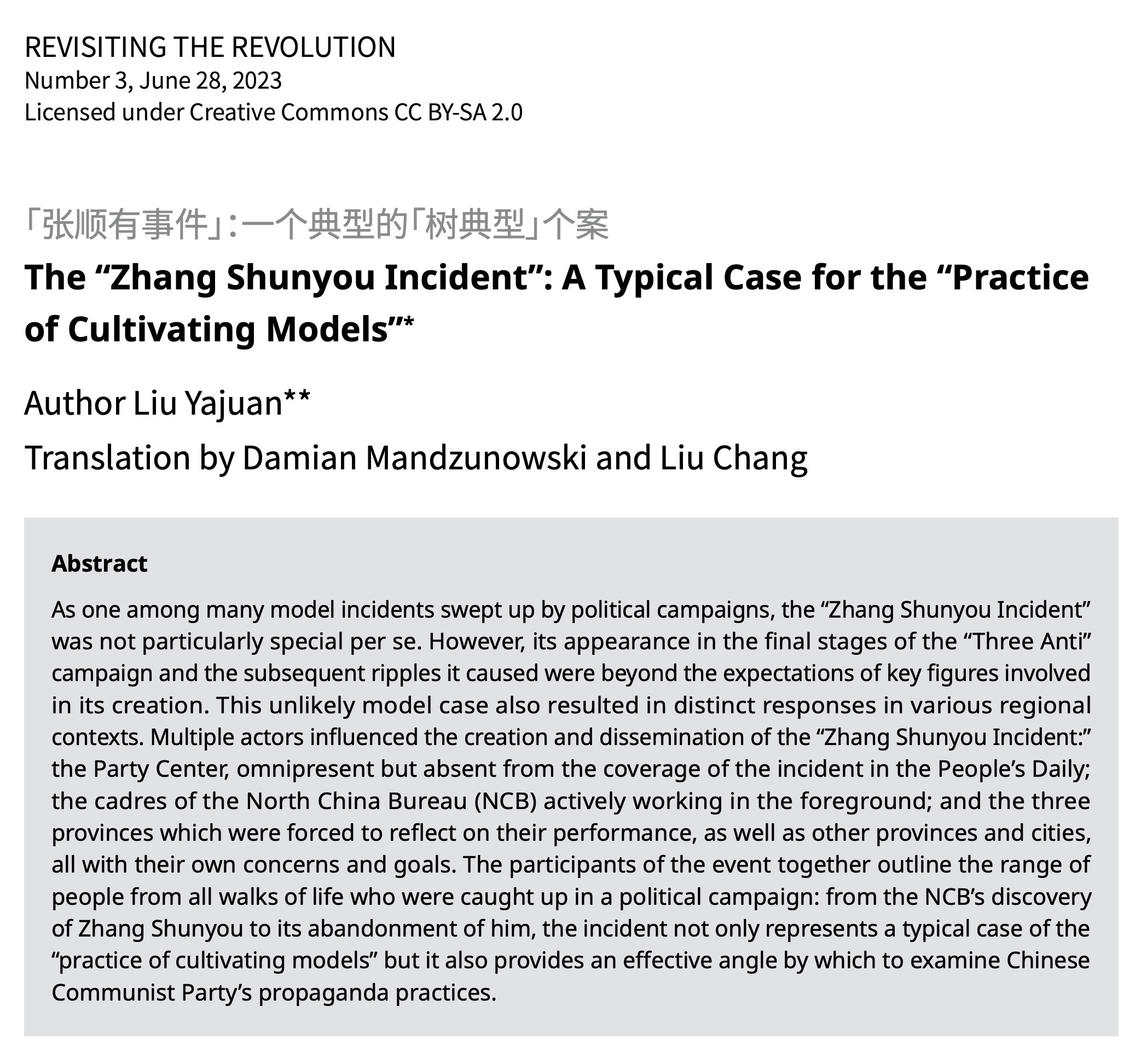
Read the translated article online here, or download a PDF version here.
From the Translator’s Introduction:
The historian Carlo Ginzburg once wrote that his particular approach to narrating the past in great detail was inspired by Leo Tolstoy’s “conviction that a historical phenomenon can become comprehensible only by reconstructing the activities of all the persons who participated in it.” In a similar way Liu Yajuan, in a new postscript written at the occasion of the present translation of her article, acknowledges that, while common people may have only little direct impact on big historical events, it was them who actually lived day-by-day through the periods we are researching. And so, Liu’s article narrates the ups-and-downs in the life of a smalltown worker in the early People’s Republic of China (PRC)—while, at the same time, also presenting a detailed case-study of Chinese Communist Party (CCP) propaganda work in the 1950s, in particular during the “Three Anti” and “Five Anti” campaigns of 1951-52. By retelling how one rural worker’s attempt to denounce his former boss for counterrevolutionary crimes is met with indifference on the part of local bureaucrats, and by showing how the repeated setbacks resulted in his story getting picked up by regional and even national propaganda apparatuses, Liu urges the reader to think about the ways common life and grand politics intertwine. Moreover, by burrowing into a dozen regional and local newspapers from across the country, Liu draws on media sociology’s attention to the historical process in order to shed new light on the machinations behind the production of political role models in the PRC.
Lena Henningsen Interviewed About Lianhuanhua for UNIversalis-Zeitung
2023-06-23 00:00:00 +0000
Lena Henningsen has been interviewed in the magazine (UNIversalis)[https://www.kulturjoker.de/impressum-kontakt/] about Chinese comics of the Mao era, the new ERC project about it and all things lianhuanhua, read the intervew (PDF download, in German) here.
Lena Henningsen will present at the Oxford Comics Network Conference "Comics and/as Resistance" on 22-23.06.23
2023-06-20 00:00:00 +0000

Lena Henningsen will take part in a large conference titled “Comics and/as Resistance” as part of the Oxford Comics Network Conference on Thursday 22 June and Friday 23 June 2023, in person at the University of Oxford (UK) and online. She will present a paper on “Lu Xun, an icon of resistance: Modernist author turned revolutionary fighter?”
This conference brings together a wide range of scholars and creators to explore the poetics and politics of resistance within comics and graphic literature. It is organised by the Oxford Comics Network at the University of Oxford (UK), a research network exploring the power, politics, and potential of the comics form. The conference is generously supported by The Oxford Research Centre in the Humanities and St Edmund Hall, Oxford.
To register to attend selected panels online, please use the Eventbrite booking page, or contact the conference organisers at comics@torch.ox.ac.uk.
Lara Y. Yang to Deliver a Talk About Archaistic Book Culture at the University of Exeter on 14 June 2023
2023-06-10 00:00:00 +0000
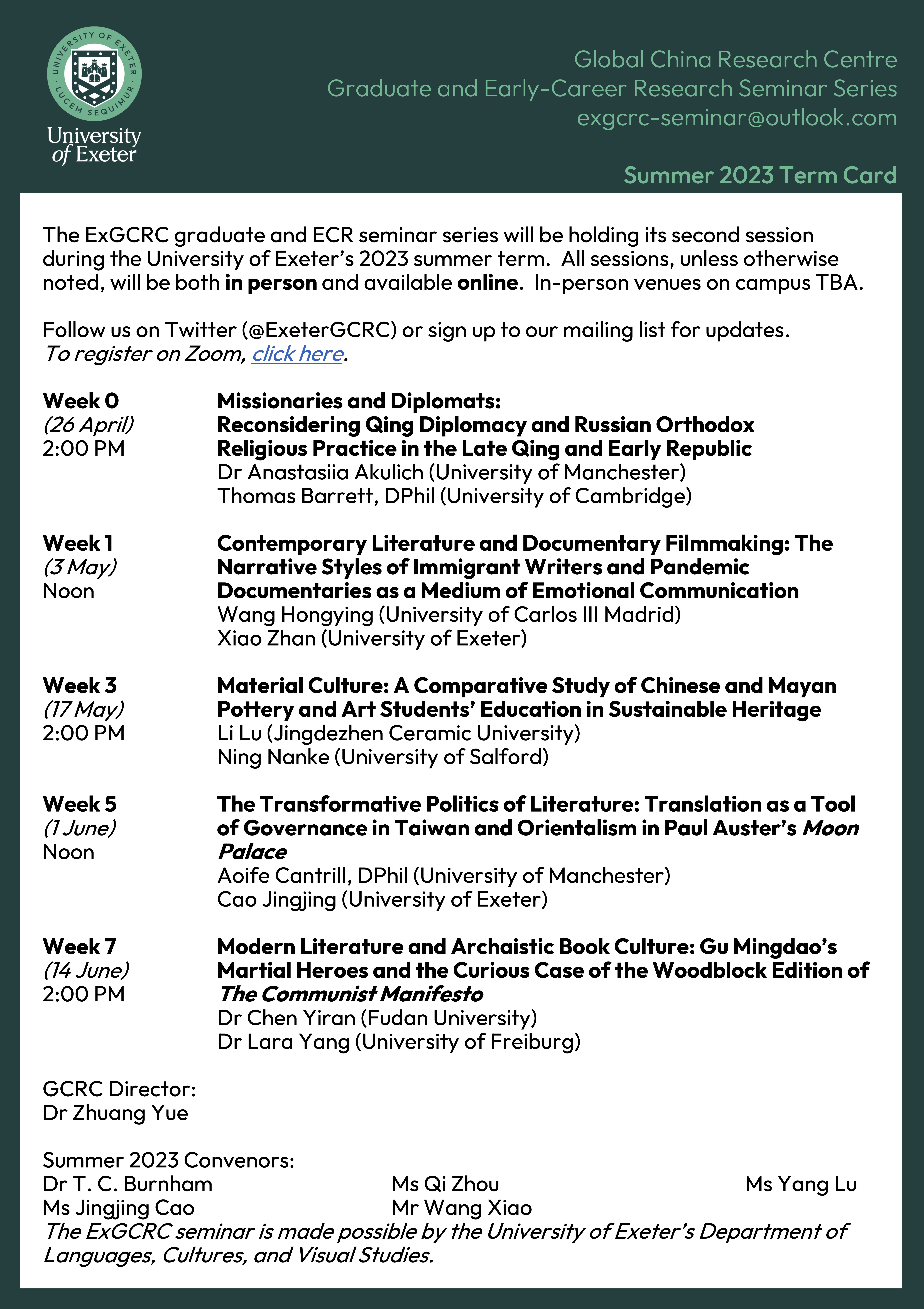
READCHINA’s Lara Y. Yang has been invited to present her research as part of the Graduate and Early-Career Research Seminar Series at the Global China Research Centre of the University of Exeter’s Department of Languages, Cultures, and Visual Studies.
She will present a joint-paper together with Dr Chen Yiran (Fudan University) titled Modern Literature and Archaistic Book Culture: Gu Mingdao’s Martial Heroes and the Curious Case of the Woodblock Edition of The Communist Manifesto and the talk will be held in person and available online.
To register for the Zoom access, go here.
Paper abstract:
Woodblock book printing, the historically dominant technology in East Asia, had been declined since the early 19th century. Surprisingly, in 1973, at the request of the Shanghai municipal government, the Cloudy Studio, a local publishing house, published a woodblock edition of The Communist Manifesto in classical Chinese style. Apart from the historical declination of xylography, politically, this was also remarkable given that the CCP publicly derided elite xylographic book publishing. In this paper, by investigating the production process of The Manifesto, I will argue that archaism in elite literati book culture continued in woodblock publishing during the Mao Era of 1949-1976. I will analyse how the publishers sought archaistic perfection through design concepts, literati printing materials, ceremonialised production processes and a master-pupil system in the Communist publishing industry through the woodblock printing practice.
Workshop POPULAR VISUAL MEDIA BEYOND "THE WEST" at the University of Cologne on 14-16.04.2023
2023-06-05 00:00:00 +0000
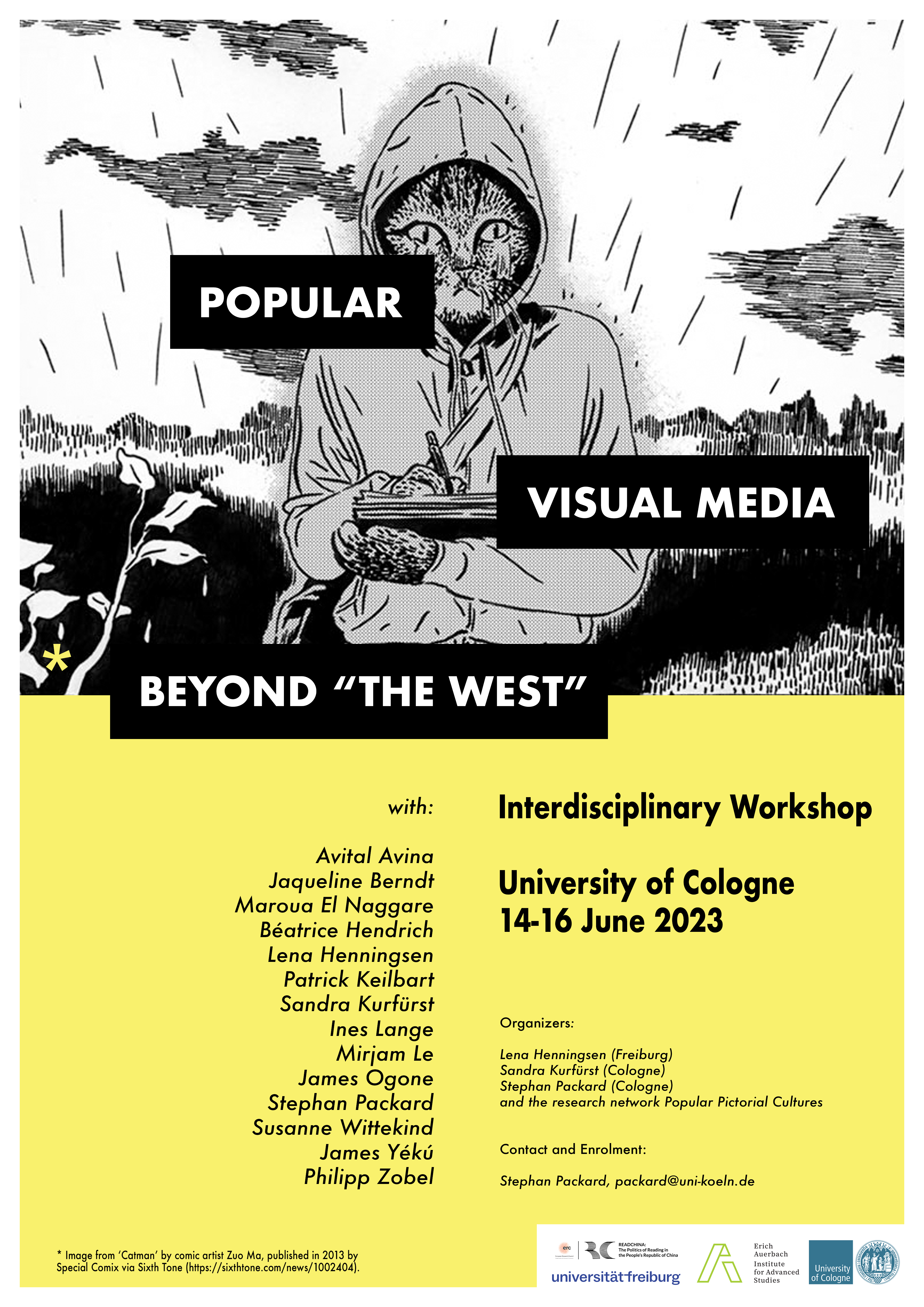
READCHINA’s Lena Henningsen together with Sandra Kurfürst, Stephan Packard, and the research network Popular Pictorial Cultures are co-organizing an interdisciplinary workshop titked POPULAR VISUAL MEDIA BEYOND “THE WEST” at the University of Cologne, to take place on 14-16 June 2023. For the program and other details, see the conference website here.
The speakers include Avital Avina, Jaqueline Berndt, Marova El Naggare, Béatrice Hendrich, Lena Henningsen, Patrick Keilbart, Sandra Kurfürst, Ines Lange, Miriam Le, James Ogone, Stephan Packard, Susanne Wittekind, James Yékú, Philipp Zobel.
For contact and enrollment, please write an email to Stephan Packard.
Oxford-Freiburg Workshop "Visual Cultures And Cultures of Reading in the PRC" on 18-19.05.2023
2023-05-14 00:00:00 +0000
The READCHINA Team is excited to jointly with University of Oxford China Centre organize a workshop for PhDs and ECRs titled “Visual Cultures And Cultures of Reading in the PRC”, to be held at the Oxford University China Centre, Lucina Ho Seminar Room, on 18-19 May 2023! The workshop is a venue for sharing ongoing research with peers and colleagues, as well as for exchanging comments, insights and ideas with new and old friends.
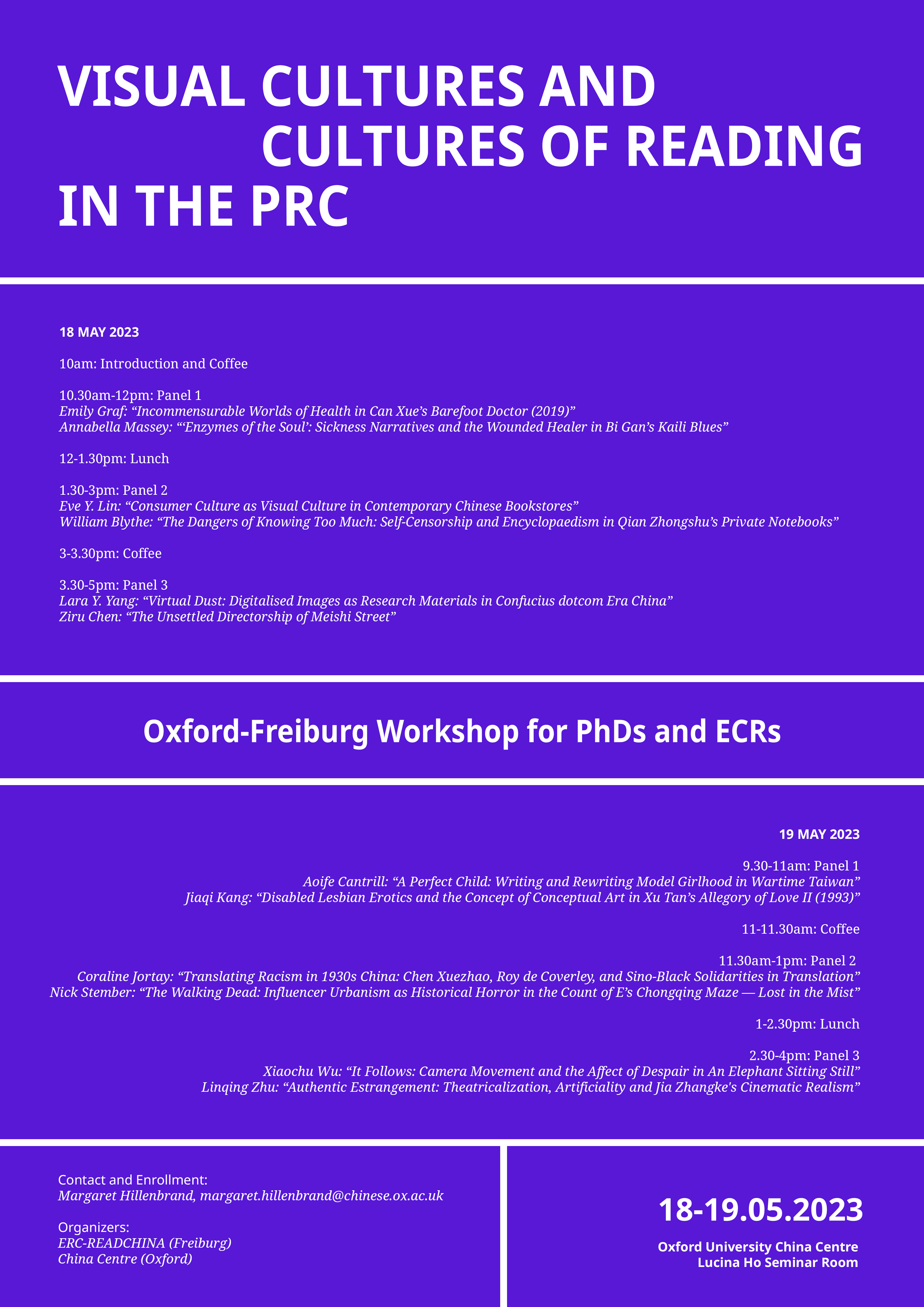
For contact and enrollment, please write an email to Margaret Hillenbrand.
Workshop program:
18 MAY 2023
10am: Introduction and Coffee
10.30am-12pm: Panel 1
Emily Graf: “Incommensurable Worlds of Health in Can Xue’s Barefoot Doctor (2019)”
Annabella Massey: “‘Enzymes of the Soul’: Sickness Narratives and the Wounded Healer in Bi Gan’s Kaili Blues”
12-1.30pm: Lunch
1.30-3pm: Panel 2
Eve Y. Lin: “Consumer Culture as Visual Culture in Contemporary Chinese Bookstores”
William Blythe: “The Dangers of Knowing Too Much: Self-Censorship and Encyclopaedism in Qian Zhongshu’s Private Notebooks”
3-3.30pm: Coffee
3.30-5pm: Panel 3
Lara Y. Yang: “Virtual Dust: Digitalised Images as Research Materials in Confucius dotcom Era China”
Ziru Chen: “The Unsettled Directorship of Meishi Street”
19 MAY 2023
9.30-11am: Panel 1
Aoife Cantrill: “A Perfect Child: Writing and Rewriting Model Girlhood in Wartime Taiwan”
Jiaqi Kang: “Disabled Lesbian Erotics and the Concept of Conceptual Art in Xu Tan’s Allegory of Love II (1993)”
11-11.30am: Coffee
11.30am-1pm: Panel 2
Coraline Jortay: “Translating Racism in 1930s China: Chen Xuezhao, Roy de Coverley, and Sino-Black Solidarities in Translation”
Nick Stember: “The Walking Dead: Influencer Urbanism as Historical Horror in the Count of E’s Chongqing Maze — Lost in the Mist”
1-2.30pm: Lunch
2.30-4pm: Panel 3
Xiaochu Wu: “It Follows: Camera Movement and the Affect of Despair in An Elephant Sitting Still”
Linqing Zhu: “Authentic Estrangement: Theatricalization, Artificiality and Jia Zhangke’s Cinematic Realism”
Lena Henningsen Profiled in a New Children's Book about Research and Science
2023-05-10 00:00:00 +0000
As a former member of the German Young Academy / Die Junge Akademie, a network of young reseaerchers in Germany, Lena Henningsen has been profiled in a new book for children!. Titled “Young Scientists. 30 Forschende & Ihre Wege in die Wissenschaft” (Young Scientists: 30 Researchers and Their Paths Toward Science), the book collects the life stories of a wide range of researchers and scientists all working on fascinating new topics.
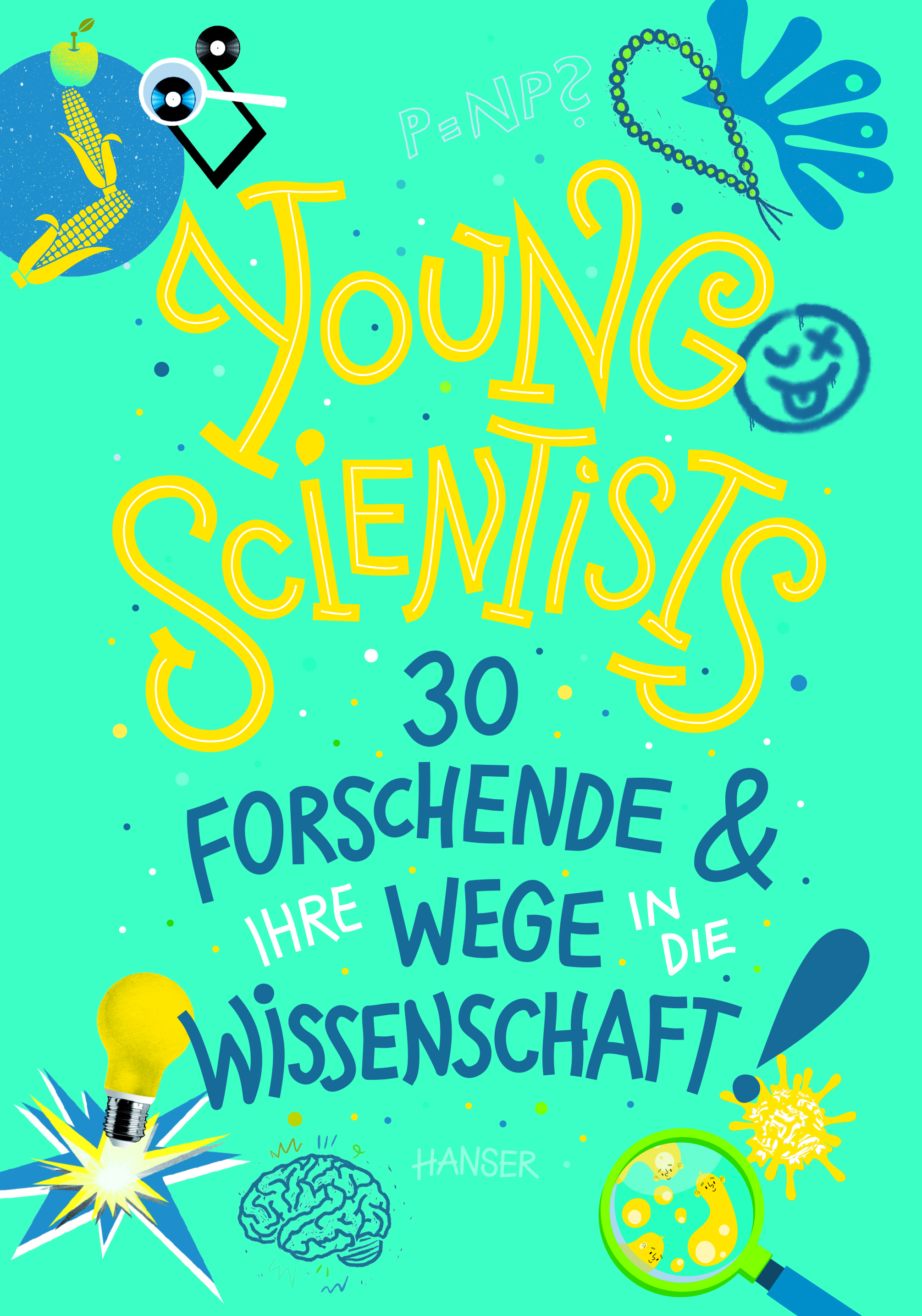
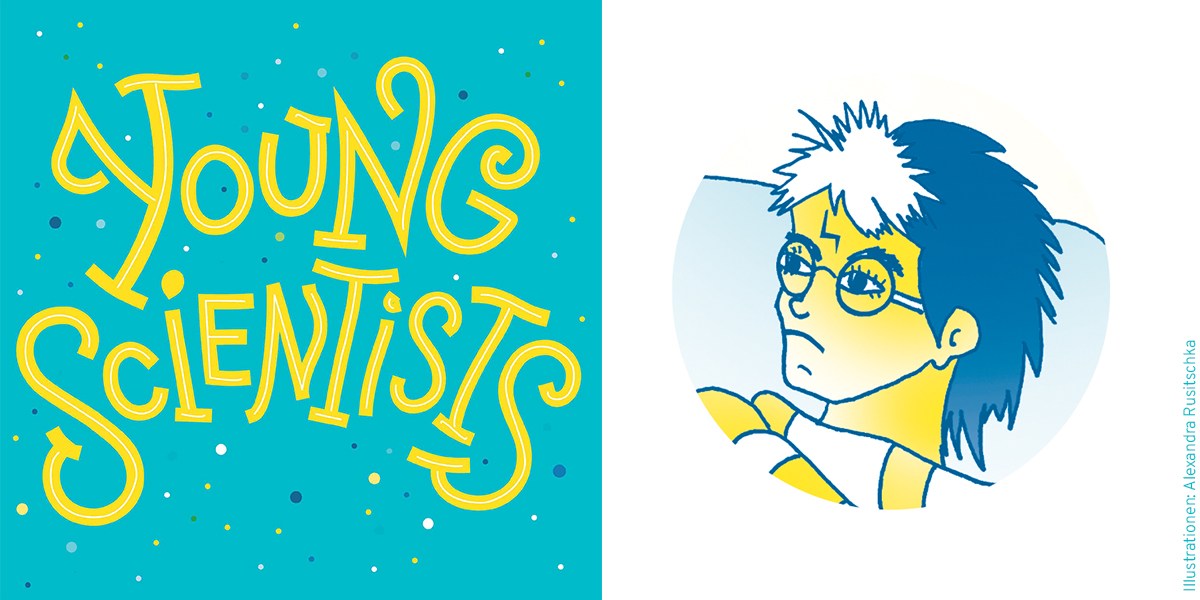
Abstract (in German):
Als Forscherin oder Forscher wird man nicht geboren. Aber welche Wege (und Umwege) führen eigentlich in die Wissenschaft? Hier erzählen 30 Forschende unterschiedlicher Disziplinen von ihren ersten Begegnungen und prägenden Erfahrungen in der Wissenschaft, von Zufällen und Entscheidungen, Erkenntnisfunken und bleibendem Forschungsinteresse. Davon, wie aus einer Außenseiterin im Kindergarten eine Professorin für Informatik werden kann. Warum man als Tochter einer Analphabetin ausgerechnet Islamische Theologie lehrt. Oder als Rechtswissenschaftler einfach nur verstehen will, wieso Regeln so wichtig für unser Zusammenleben sind. 30 spannende Lebensgeschichten von Geistes-, Sozial-, Natur- und Ingenieurwissenschaftler:innen, die begeistern und das Interesse für Wissenschaft wecken.
Get your copy here!
New Article on Reading Out Loud in Cold War Chinas by Dayton Lekner
2023-04-09 00:00:00 +0000
We are happy to share a new research article by READCHINA affiliated scholar Dr Dayton Lekner titled “States of Diffusion: Ideology, Text, Voice, and Sound in Cold War Chinas”.
The article asks, What happens when we read aloud? What had been text on a page or screen becomes first the internal and then physical voice of the reader, then sound waves that reflect off and are coloured by the physical space of the reading, commingle with other sounds in that space, and are finally apprehended by the listener. At each stage the text, however singular its purpose, becomes something new. In this article, published recently in Modern China, Dayton Lekner explores the various stages of diffusion of a text through voice across ideological and national border with the study of sonic propaganda across the Taiwan Strait from 1953 to 1991.
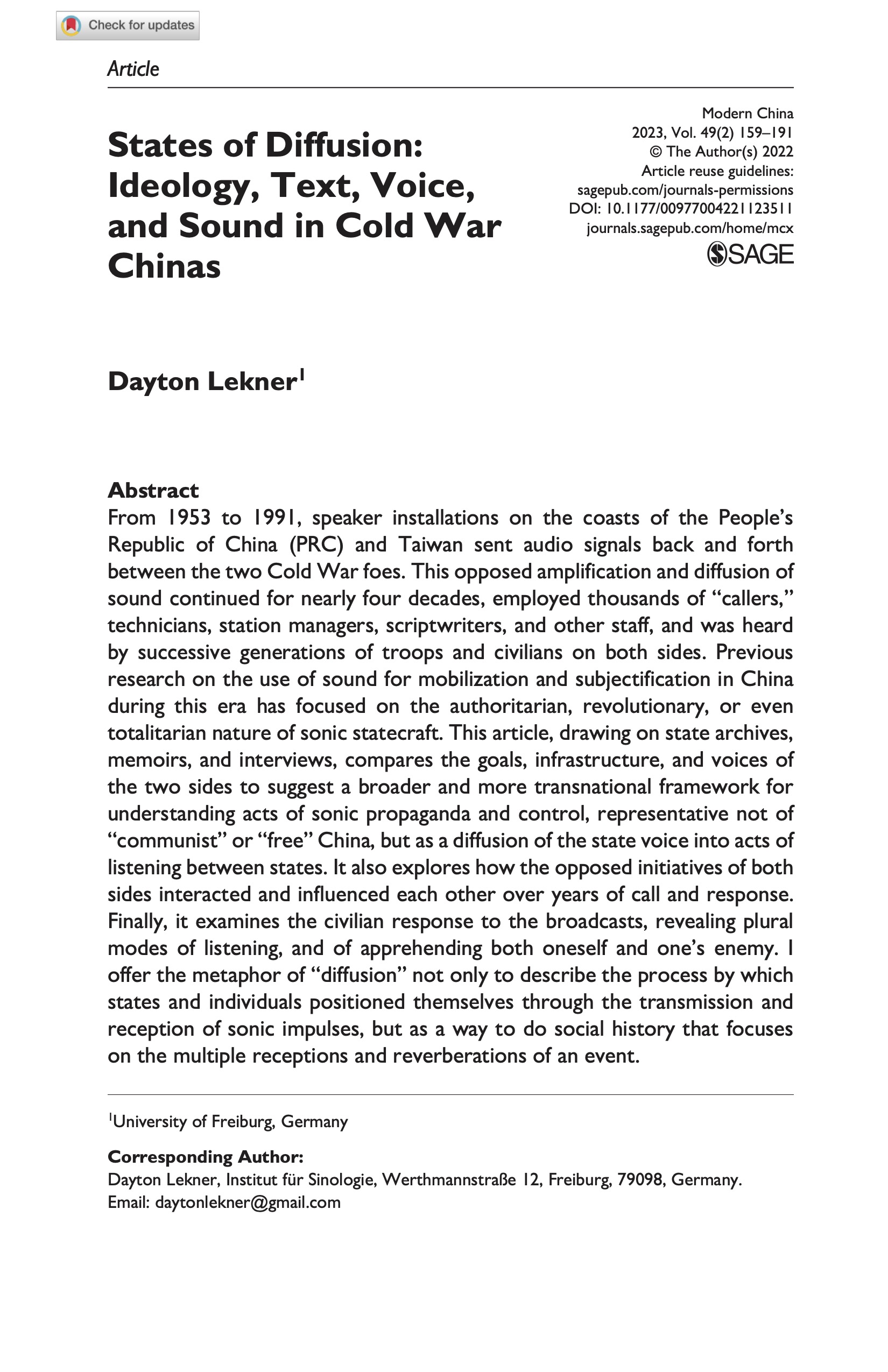
Abstract:
From 1953 to 1991, speaker installations on the coasts of the People’s Republic of China (PRC) and Taiwan sent audio signals back and forth between the two Cold War foes. This opposed amplification and diffusion of sound continued for nearly four decades, employed thousands of “callers,” technicians, station managers, scriptwriters, and other staff, and was heard by successive generations of troops and civilians on both sides. Previous research on the use of sound for mobilization and subjectification in China during this era has focused on the authoritarian, revolutionary, or even totalitarian nature of sonic statecraft. This article, drawing on state archives, memoirs, and interviews, compares the goals, infrastructure, and voices of the two sides to suggest a broader and more transnational framework for understanding acts of sonic propaganda and control, representative not of “communist” or “free” China, but as a diffusion of the state voice into acts of listening between states. It also explores how the opposed initiatives of both sides interacted and influenced each other over years of call and response. Finally, it examines the civilian response to the broadcasts, revealing plural modes of listening, and of apprehending both oneself and one’s enemy. I offer the metaphor of “diffusion” not only to describe the process by which states and individuals positioned themselves through the transmission and reception of sonic impulses, but as a way to do social history that focuses on the multiple receptions and reverberations of an event.
Read it online / download PDF here.
Book Launch for Edited Volume with Chapter by Lena Henningsen and Duncan Paterson on May 15
2023-03-28 00:00:00 +0000
On Monday, 15 May, from 15:00-17:00 UK time we invite all collegues to join a hybrid format book launch event for a new edited volume titled Understanding Authenticity in Chinese Cultural Heritage with a chapter co-written by READCHINA’s PI Lena Henningsen and Duncan Paterson, our Data Manager!
The chapter co-written by our READCHINA collegues is titled “Authenticity beyond Authority? The Case of Handwritten Entertainment Fiction from the Chinese Cultural Revolution” and can be read online or downloaded as PDF in OpenAccess here.
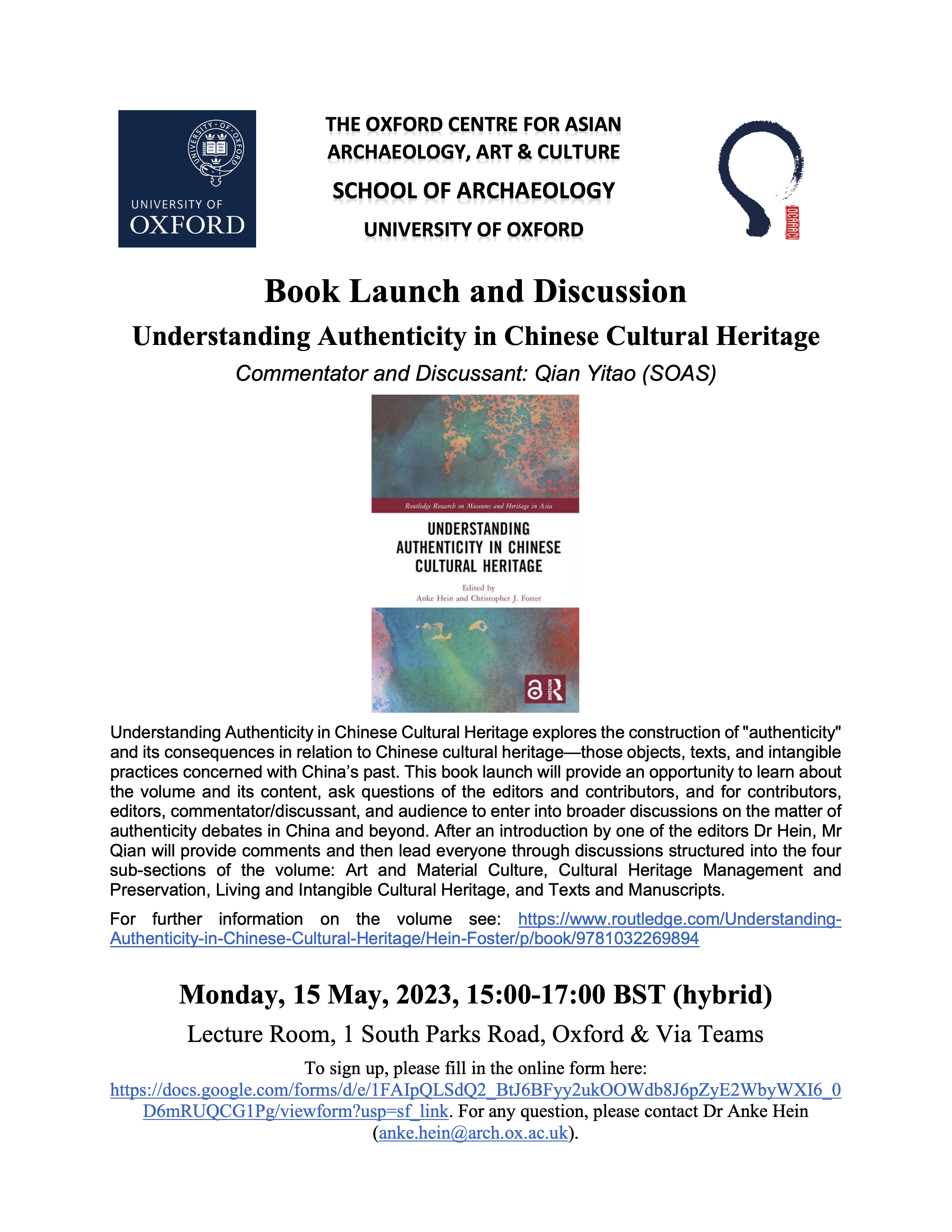
The physical location being in Oxford at 1 South Parks Road, the online meeting platform will be Teams. Dr Qian Yitao from SOAS will act as commentator/discussant and ask questions on the publication. To register, please fill in the online form here. For any question, please contact Dr Anke Hein.
Abstract of the edited volume:
Understanding Authenticity in Chinese Cultural Heritage explores the construction of “authenticity” and its consequences in relation to Chinese cultural heritage—those objects, texts, and intangible practices concerned with China’s past. This book launch will provide an opportunity to learn about the volume and its content, ask questions of the editors and contributors, and for contributors, editors, commentator/discussant, and audience to enter into broader discussions on the matter of authenticity debates in China and beyond. After an introduction by one of the editors Dr Hein, Mr Qian will provide comments and then lead everyone through discussions structured into the four sub-sections of the volume: Art and Material Culture, Cultural Heritage Management and Preservation, Living and Intangible Cultural Heritage, and Texts and Manuscripts.
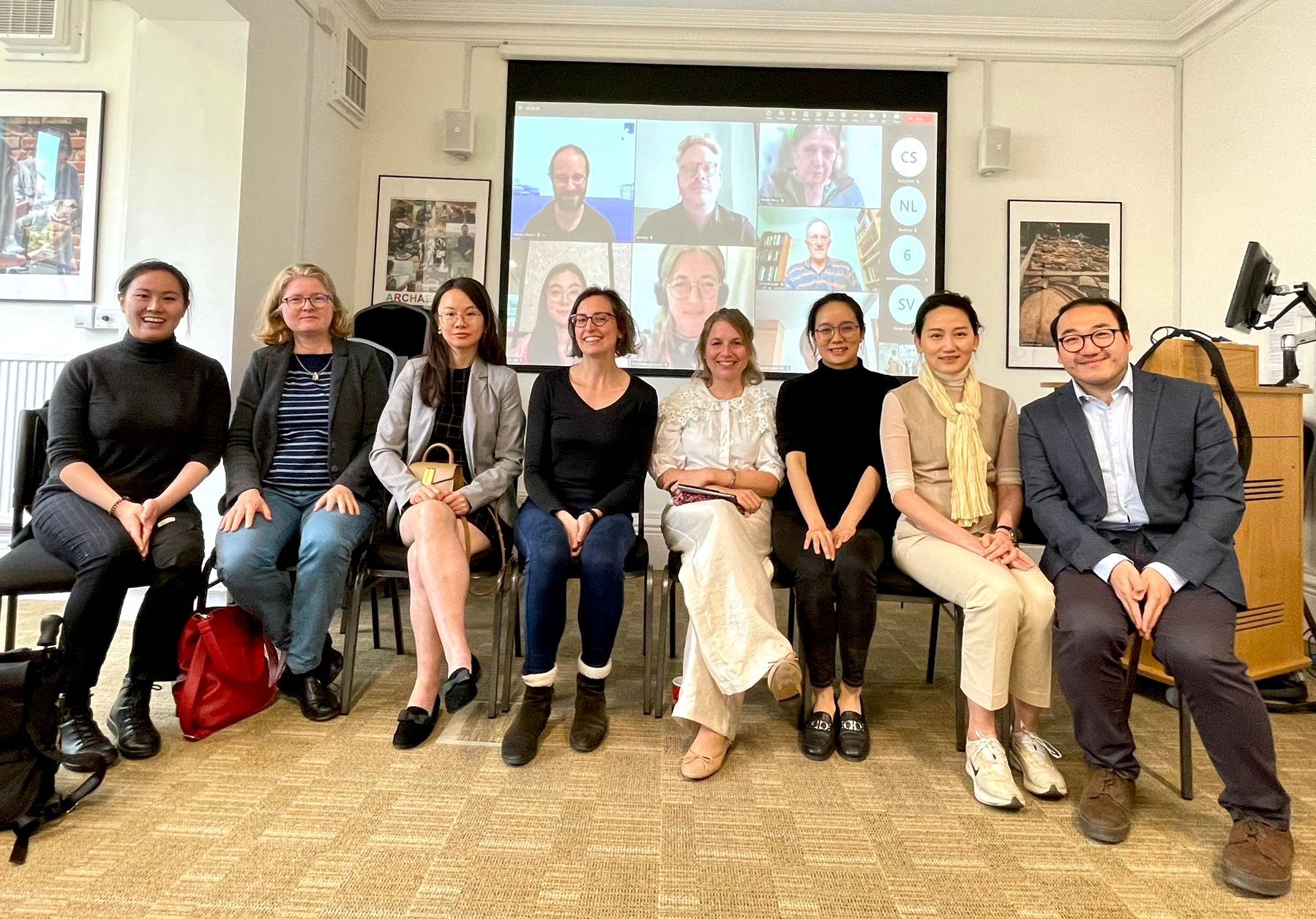 The contributing authors gatherd on site and online during the book launch; Lena Henningsen seated second from left and Duncan Paterson in top left corner of the Zoom window (Oxford, 15 May 2023)
The contributing authors gatherd on site and online during the book launch; Lena Henningsen seated second from left and Duncan Paterson in top left corner of the Zoom window (Oxford, 15 May 2023)
READCHINA Members Took Part in the Association for Asian Studies (AAS) 2023 Annual Conference in Boston
2023-03-20 00:00:00 +0000

Three members of the READCHINA team took part in the 2023 annual conference of the Association for Asian Studies (AAS) held this year in Boston.
Lara Y. Yang was part of a roundtable discussion under the title “Changing Places: Displacement, Emplacement, and Knowledge Production in Modern China” together with Wen-hsin Yeh, Robert J. Culp and Eddy U.
Dayton Lekner was discussant at the panel “Sonic Entanglements: Familiar, Foreign, and Forbidden Sounds in Modern China” comprised of Yingchuan Yang, Jiaqi Wang, Yu Shi, Lingyan Liu and James Johnson.
Lena Henningsen took part in two panels. First, she presented her paper “” at the panel “Old Fashions and Odd Inventions: Transitional Aesthetics of the Early Reform Era (1976–1989)” alongside presentations by Nick Stember, Yiyang Hou and Julia Keblinska. Then, Lena was also chair for the panel “Magazine, Gender, and Queer in Turn-of-the-Century Asia” which featured presentations by Kika W.L. Van Robays, Miguel Antonio Nograles Lizada, Shimin Zhang and Chang Liu.
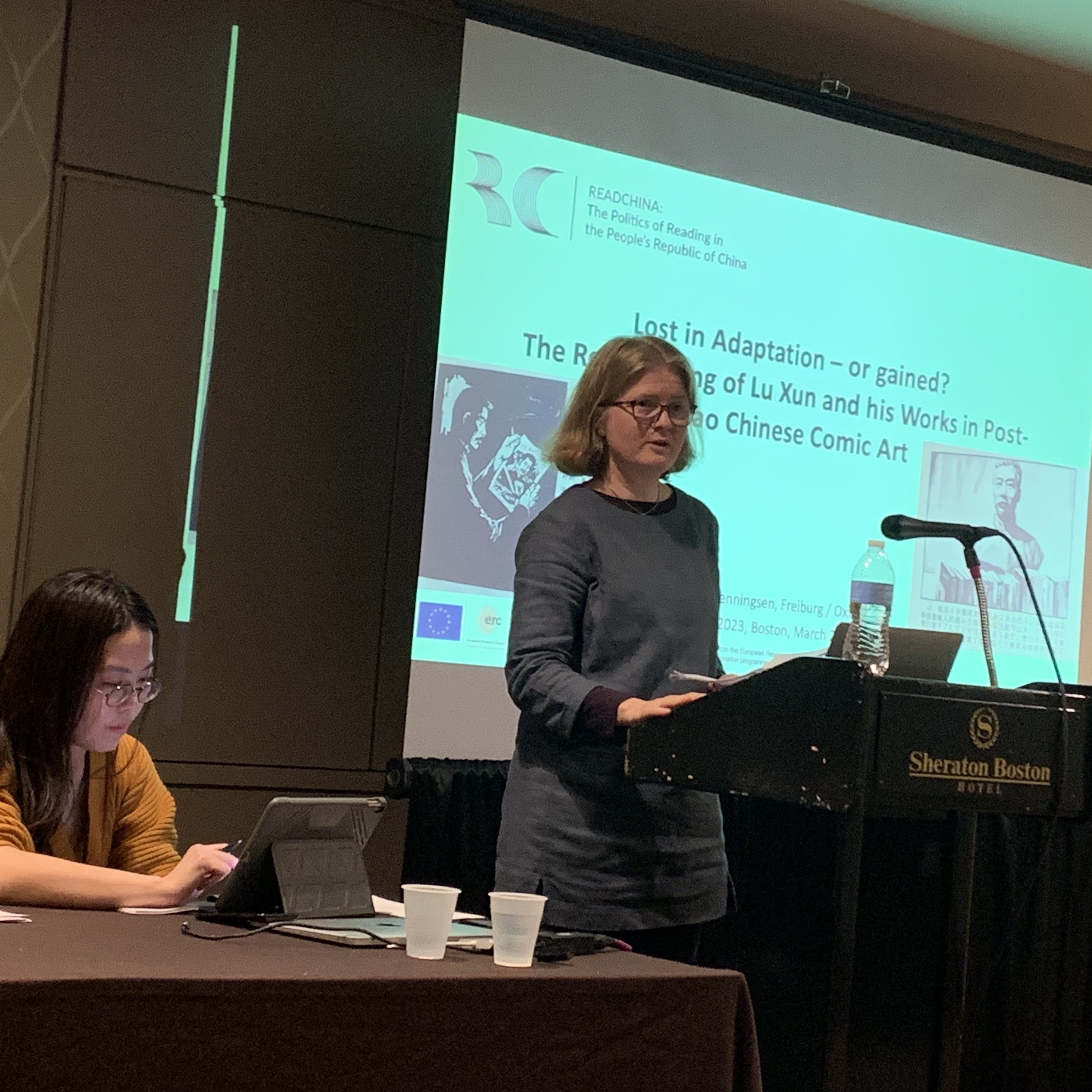
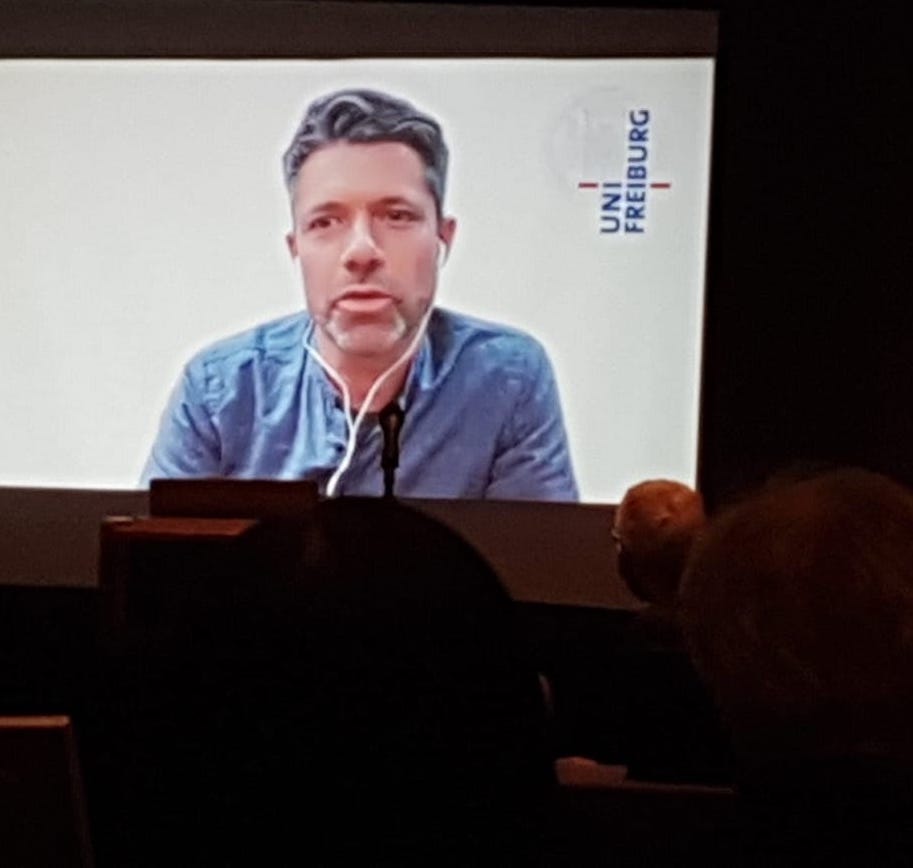
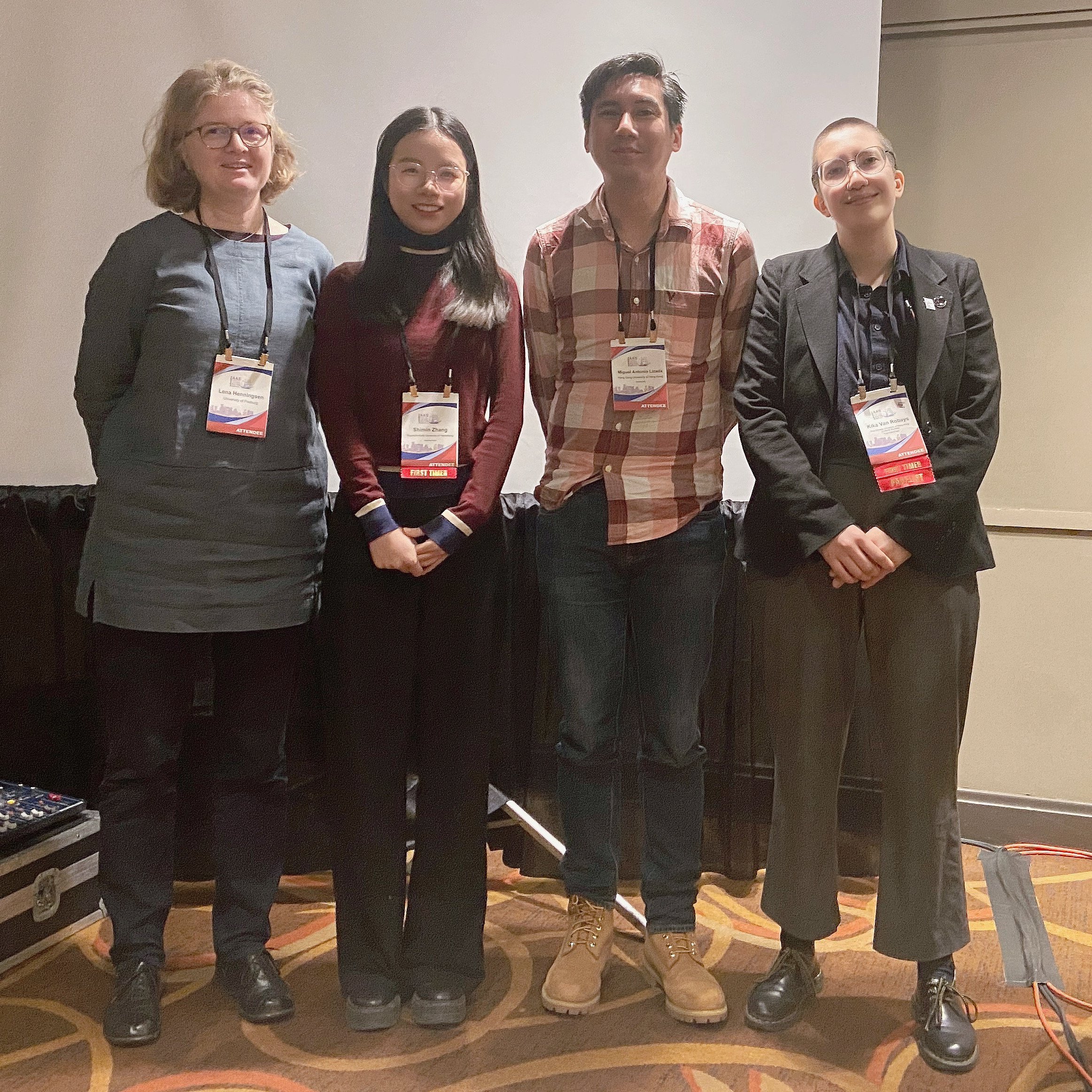
Lena Henningsen Invited to UBC as a Visiting Professor, Three Talks in Vancouver to Follow at the End of March
2023-03-07 00:00:00 +0000
Our PI, Lena Henningsen, has been named a Cecil H. and Ida Green Visiting Professor at the Green College at University of British Columbia and will deliver a round of in-person talks in Vancouver, Canada, at the end of March!
The official visitng scholar lecture and co-organized with the Centre for Chinese Research, UBC will be delivered based on parts of Lena’s recent book as a talk titled “Text in Motion: Unofficial Handwritten Entertainment Fiction from the Chinese Cultural Revolution”. The lecture will take place on Tuesday, March 21, from 5-6:30pm, at Coach House 6201 Cecil Green Park Rd Green College, UBC; a reception will follow.
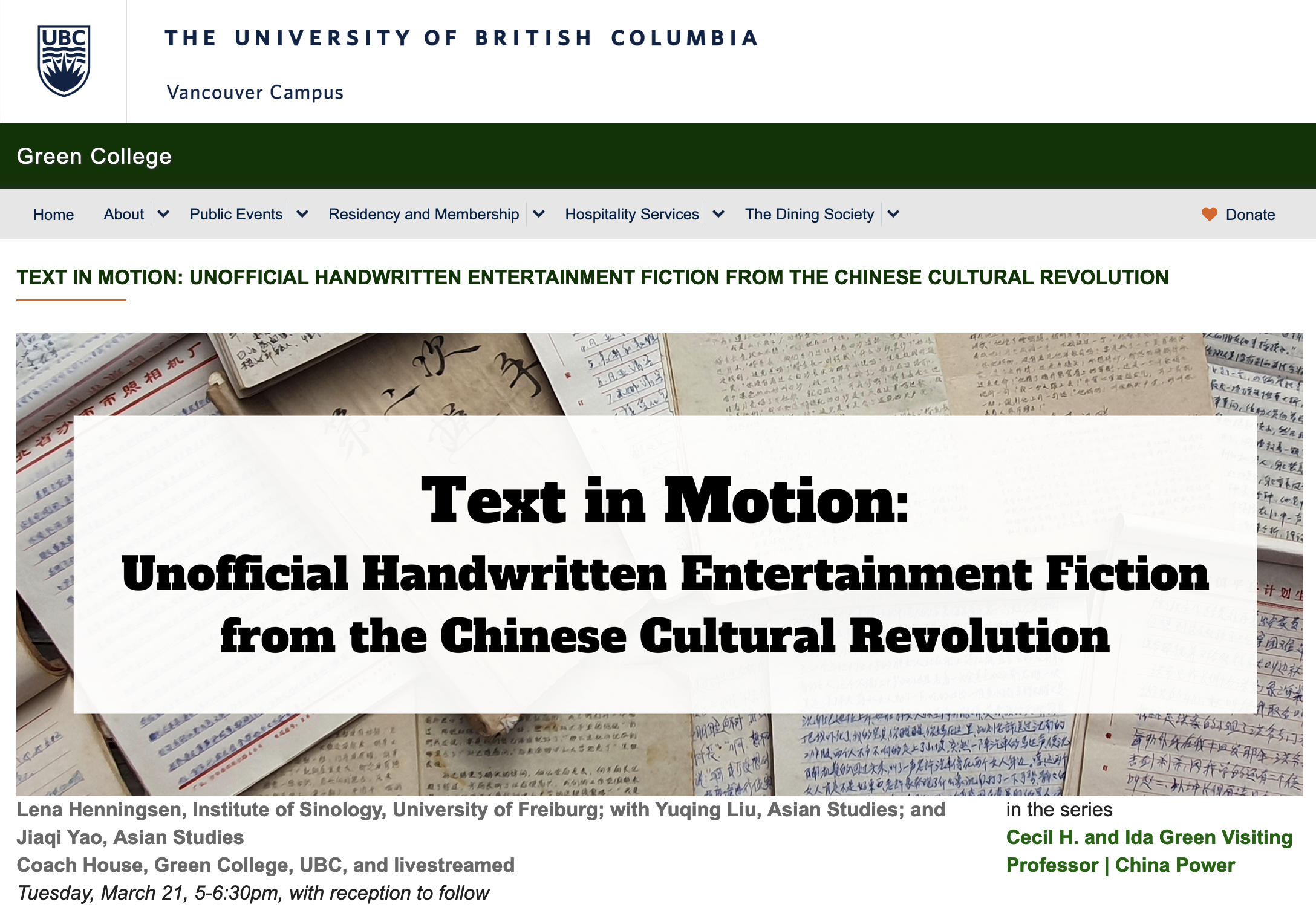
For details, see here.
Abstract: The Chinese Cultural Revolution (1966-76) has often been described as a cultural desert; as an era where nothing was permitted and available beyond the brightly colourful yet often utterly boring official propaganda art, as an era in which censorship and government control dominated the literary field. In this talk, Lena Henningsen will demonstrate how analyses of actual reading practices complicate this picture. While for some, the era was a time of cultural and intellectual deprivation and of political persecution, for others it was an time of great diversity, artistic experimentation and literary entertainment. In the first part of her talk, Lena will trace what was actually available to those who dared to venture into the forbidden, including translations of the latest foreign literature, political texts published for party cadres only and manuscript fiction written, copied and rewritten by the educated urban youth sent to the countryside. She will argue that as a consequence of these circumstances, this literary field was constantly in motion: Both the texts and its practitioners (readers, authors, copyists, etc.) were moving across the country, ensuring that the texts were read by multiple readers while at the same time rendering the texts instable when texts, with both printed and handwritten texts rendered incomplete or completely destroyed from tear and wear. In the second part, she will use the example of a spy story that circulated as manuscript fiction to demonstrate that this instability facilitated tremendous creativity of which the multitude of versions of identical stories that survived bear witness. These different versions shed light on crucial aspects of how the Cultural Revolution was experienced at the time. She will conclude by discussing how these literary practices laid the foundation for the tremendous literary creativity of the early post-Maoist years as texts and practitioners moved into a new era.
One day prior, on Monday, March 20, at 2:00 pm, Lena will deliver aanother talk based on different parts of her book this time at the Simon Fraser University David Lam Centre, co-sponsored by the Centre for Chinese Research, UBC and the UBC Green College, and supported by the SFU Department of Global Humanities. The talk is titled Texts in Motion: World Literature during the Chinese Cultural Revolution and will take place at SFU Harbour Centre 515 W Hastings St HC 7000 Earl & Jennie Policy Room.
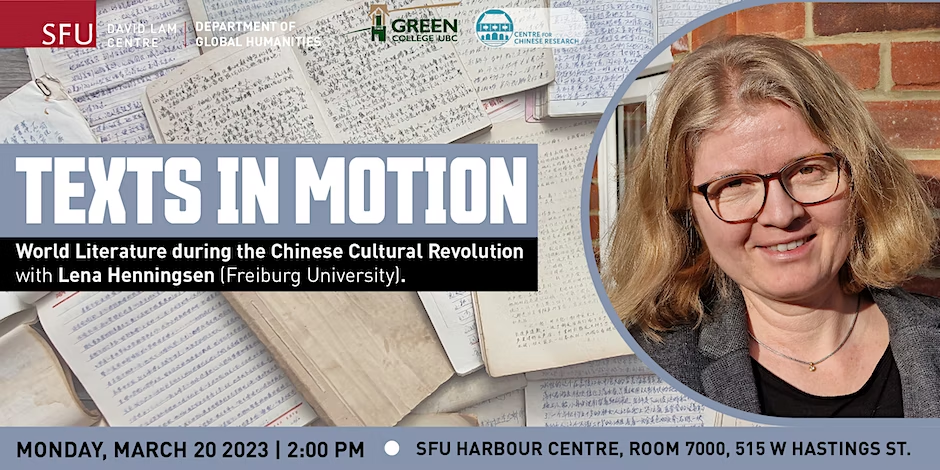
For details and registration, see here.
Abstract: The Chinese Cultural Revolution (1966-1976) is perceived as an era when China was cut off from the rest of the world, politically as much as culturally; and as an era of cultural and literary deprivation dominated by censorship and by government control of literary and artistic production. While this certainly held true for large parts of the population, the Cultural Revolution also saw an erosion of this system, if not an implosion: Countless uprooted youth – be they former Red Guards and/or educated youth sent to the countryside from 1968 onwards – read whatever they could get their hands and eyes on: books marked for destruction because of their counterrevolutionary nature as much as internal publications that were produced only for the eyes of trustworthy party cadres. This latter category contained large amounts of foreign literature translated into Chinese. Very often, the children of party cadres took these books to the countryside and shared them with friends, as described in Dai Sijie’s novel Balzac and the Chinese Seamstress. Thus, the Cultural Revolution, for many, was a time of great intellectual freedom, and of broadening their horizons beyond their own country. In this presentation, Professor Henningsen will, first, chart actual reading practices through a sample of autobiographical writings to delineate which texts were read at the time and considered noteworthy in retrospect. She will demonstrate that foreign literature, ranging from Dumas to the authors of the beat generation, featured prominently in this. Second, she will turn to literary creation of the time: handwritten entertainment fiction which circulated clandestinely. While these texts appear to be “mere” entertainment at first glance, they are intertextual and – mirroring actual reading practices – anchor the genre firmly on a map of world literature. Discussing three different stories and the intertextual links within them, Professor Henningsen will delineate the different cosmopolitanisms of the Cultural Revolution and how they forestalled developments of the early post-Mao years.
Last but not least, on Wednesday, March 22, from 4:00-5:30pm, Lena will share insights into her new resaerch on Chinese comics in a talk titled “Lost in Adaptation? Lu Xun and his Works in Chinese Lianhuanhua 连环画” at the Centre for Chinese Research, UBC in Room 120 Vancouver Campus, Institute of Asian Research, C.K. Choi Building, 1855 West Mall.

For details, see here.
Abstract: Lu Xun and his works have been remediated through Chinese comics: lianhuanhua 连环画, literally “linked images”. Many of the literary works of the founding father of modern Chinese literature have been adapted into comic form, often in several versions, and his biography has likewise been told in comics. In this talk, I will analyze a corpus of 30-40 lianhuanhua to sketch the characteristics of these remediations through the lens of reading: First of all, these works represent readings of Lu Xun by other artists. Secondly, as a very popular medium during the Mao years they provided contemporary readers with accessible versions of the texts of the modernist writer, mass-media versions of the literary texts so to speak. Thirdly, in portraying Lu Xun reading, they present the reader with a model of how to become a proper reader for themselves, of how to read and of how to give meaning to reading. In my talk, I will disentangle the propagandistic aspects from the literary, providing answers to the following questions: What versions of Lu Xun and his texts were produced in the lianhuanhua? In how far do these changing versions represent changing discourses about literary values and the roles ascribed to literature? What is the role of mechanisms of mise-en-abyme? Combining close readings of the visual and textual aspects of the comics, I will trace the processes of adaptation. I will argue that on the surface the comics follow discourses propagating Lu Xun as the revolutionary writer as which Mao Zedong wanted to see him. At first glance, many adaptations seem to simplify the stories of Lu Xun, and the ambivalence of the originals is lost in adaptation. Taking the visuals of the medium seriously, however, I will argue that the lianhuanhua rescue the modernist author from propagandistic appropriation.
Guest Talk by Lena Henningsen at the University of Oxford on 22.02.23
2023-02-17 00:00:00 +0000
On Wednesday, February 22, 2023, at 11:00 GMT, Lena Henningsen will deliver another guest lecture at the University of Oxford China Centre and the Oxford Research Centre in the Humanities, part of the ongoing UNDERSTANDING AUTHENTICITY IN CHINA’S CULTURAL HERITAGE SEMINAR SERIES, this time via Zoom.
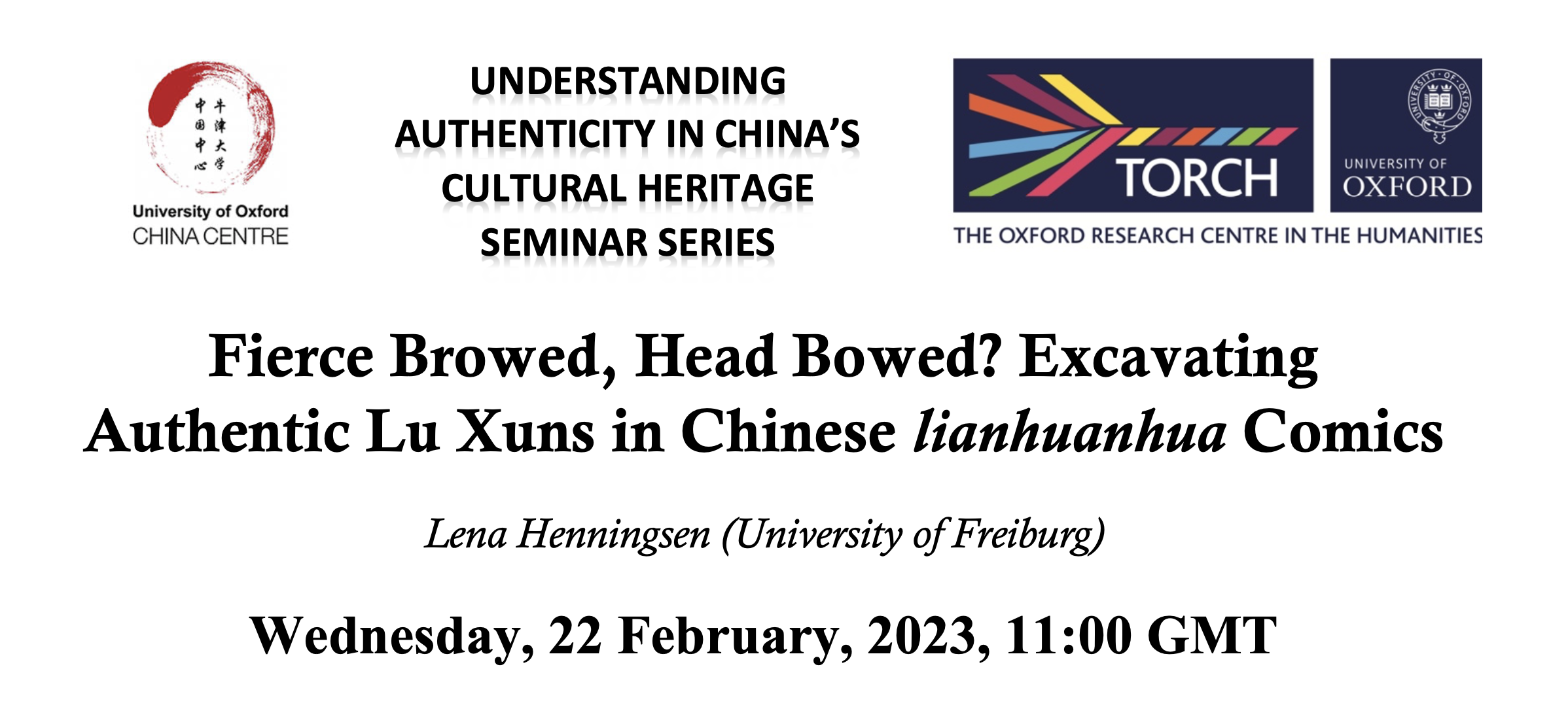
The talk is titled “Fierce Browed, Head Bowed? Excavating Authentic Lu Xuns in Chinese lianhuanhua Comics” and registratration for attendence can be done here.
Abstract: Ever since the late 1930s, the Chinese Communist Party called upon its citizens to emulate the “revolutionary spirit of Lu Xun”. It propagated Lu Xun’s works as revolutionary literature and the author as a model to be emulated by later literary workers. Lu Xun’s works were (re)published, and he became an icon of Communist propaganda. His works and his life also were adapted multiple times into lianhuanhua. In this presentation, I will track the visual and textual depictions of Lu Xun in these comics: At first glance, the modernist author is depicted much in the “revolutionary spirit of Lu Xun” with fierce eye-brows and his head bowed for the sake of the revolution, as outlined by Mao Zedong in his 1942 Yan’an Talks. A fierce browed Lu Xun, it seems, is constructed as the real and authentic version of the author. Situating this fierce browed Lu Xun in visual and textual discourses of the 20th century, I will point to the nuances of Lu Xun’s fierceness and then show how residues of his modernism and the ambivalence of his literature continue to resurface. These different faces invite inquiries into the nature of authenticity: What (or who?), after all, is perceived as an authentic Lu Xun? What is the basis for a judgment of authenticity? Material, textual, visual or a political authenticity? I argue that standard depictions bordering on the propagandistic notwithstanding, lianhuanhua strive to bring to the fore the ambivalence in Lu Xun and his writings, if only to underline their own claims to artistic authenticity.
For details, see here.
Lena Henningsen Receives Consolidator Grant from the ERC for a New Research Project on Chinese Comics!
2023-01-31 00:00:00 +0000
We are very happy to share the news that Lena Henningsen has been awarded with her second grant from the European Research Council! The ERC Consolidator Grant is worth two million euros over a period of five years and is intended to fund a new research project on comic culture in the People’s Republic of China. “Comics Culture in the People’s Republic of China (CHINACOMX)” builds upon Lena Henningsen’s ongoing fascination with the world of Chinese comics, and will significantly expand existing contributions such as translations of lianhuanhua. The project will commence from January 2024, after READCHINA has been wrapped - the READCHINA team congratulates our PI and colleague on this great occasion, and we are looking forward to expanding the ongoing inquiry into the history of reading into the field of comics!
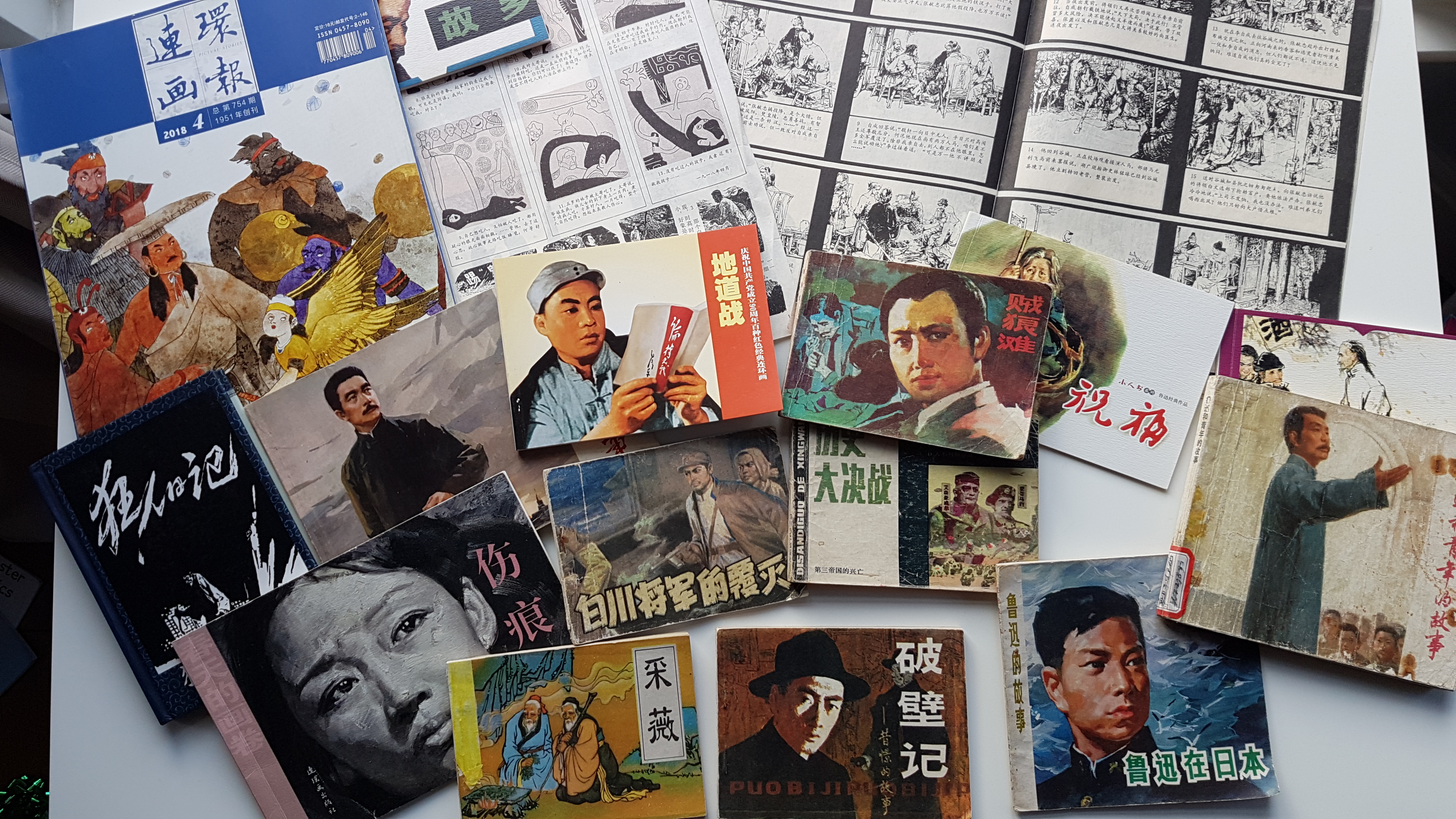
Lena Henningsen and her team at CHINACOMX will analyze comics from the PRC with regard to Chinese and global comic culture – as well as the specific conditions of their production, circulation, and consumption. In the process, they will also address the question of whether and to what extent comics further the goals of state propaganda, such as the legitimization of the Communist Party of China, the creation of the “new socialist man,” and nation building – or whether they counteract these goals. In clearly circumscribed case studies, the project will analyze adaptations into comics from literature and film, the conventions of text-image relations (and the breaking of these conventions), narrative qualities, as well as the visual language of lianhuanhua which is very much indebted to other visual forms of art, including traditional Chinese visual art, cartoons, propaganda posters, photography and movies.
With its focus on practices and meaning making, CHINACOMX moreover delves into the changing global cultural, political and economic connections within the socialist cultural sphere and beyond, tracing distinct and changing relationships of domestic and foreign elements. The project will cover developments since the late 1940s to the present and situate concrete phenomena within larger developments and traditions. “Our project has the goal of defining the term ‘Lianhuanhua’ as a distinct genre arising from a specific context as well as an independent research field,” says Henningsen, “similar to ‘manga’ or ‘bandes dessinées.’”
Guest Talk by Lena Henningsen at the University of Oxford on 19.01.23
2023-01-15 00:00:00 +0000
On January 19, 2023, at 17:00, Lena Henningsen will deliver her “Reader, Author, Icon, Superhero? Lu Xun and his Literature in Chinese Comics” talk as part of the China Studies Seminar series at the Faculty of Asian and Middle Eastern Studies, University of Oxford (at the Kin-ku Cheng Lecture Theatre, Dickson Poon Building, Canterbury Road OX2 6LU).

For details, see here.
Guest Lecture by Lena Henningsen at FU Berlin on 12.01.23
2023-01-07 00:00:00 +0000
On January 12, 2023, at 12:15, Lena Henningsen will deliver a guest lecture titled “Reader, Author, Icon, Superhero? Lu Xun and his Literature in Chinese Comics” at The Institute for Chinese Studies, at the School of East Asian Studies (SEAS), Freie Universität Berlin (Room: 2.2051 Holzlaube, Fabeckstr. 23-25, 14195 Berlin).
Abstract:
In his 1942 Yan’an Talks on Literature and the Arts, Mao established Lu Xun as a model for art workers to emulate. The constant republication of the Talks and propaganda efforts further immortalized Lu Xun as a revolutionary writer, as a revolutionary yielding his brush as a weapon against the enemies of the revolution. Chinese comics – lianhuanhua – are part of these efforts: Lianhuanhua adaptations of Lu Xun’s works and life have been (re)published since at least 1949 and into the present. As sequential visual narratives and as a particularly readerly medium, lianhuanhua offer authors, artists and readers ample space to develop and ponder about the various roles of Lu Xun and his literature. In this talk, I will therefore trace the different Lu Xuns as they appear in Chinese comics. At first glance, the adaptations into the medium of comic seem to purge Lu Xun’s texts of their ambivalence and thus to follow the official rhetoric contributing to the creation of Lu Xun as a revolutionary icon and superhero. However, the readerly qualities of the narratives – depictions of reading, reflections on the nature and roles of writing, and the processes of adaptation – recalibrate this: Lianhuanhua adaptations of Lu Xun and his works, I argue, bring back Lu Xun, the author of ambivalent literature.
For details, see here.
Two Talks in Würzburg in January 2023 by Lena Henningsen
2023-01-04 00:00:00 +0000
To kickstart the new year in a readerly fashion, Lena Henningsen will deliver two talks in early January at the University of Würzburg.
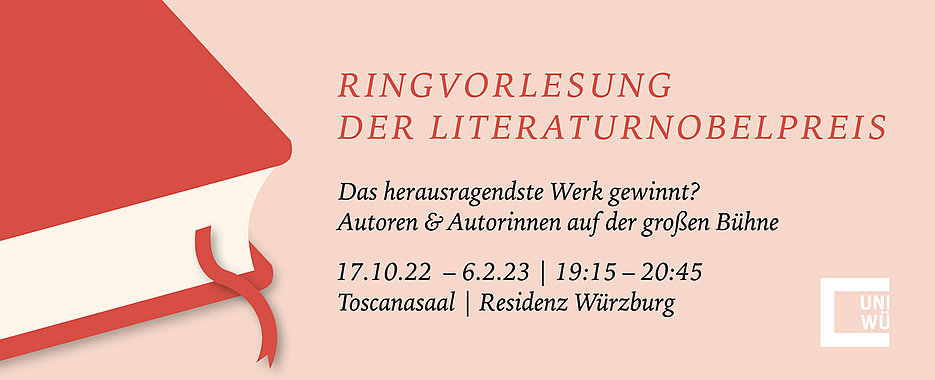
First, on January 9 starting at 19:15, READCHINA’s PI will talk with Roland Altenburger at a lecture series covering various winners of the Nobel Prize in Literature about “Gao Xingjian und Mo Yan: Die chinesischen Literaturnobelpreise zwischen Avantgarde, Anpassung und Anklage.” For details, see here.
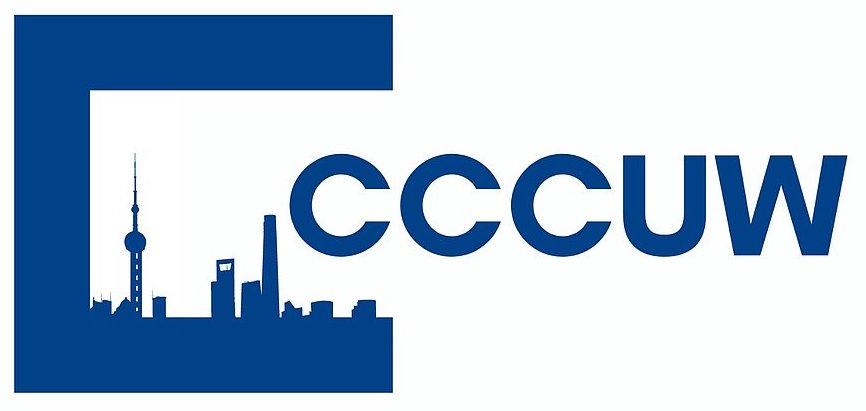
Then, on January 10 starting at 18:00, Lena Henningsen will present her most recent research in a talk titled “Reading in Sequence: Readerly qualities of Chinese comic adaptations from Lu Xun to Lei Feng.” Details here.
We kindly invite all READCHINA friends and colleagues who are in the area to join the talks in person!
New Article by Damian Mandzunowski on The Uses of News Photography for Political Communication About Reading
2022-12-19 00:00:00 +0000
We are happy to announce a new publication by READCHINA’s Damian Mandzunowski in ERCCS – Research Notes, the online publication series of the Max Weber Foundation and the École Française d’Extrême-Orient.
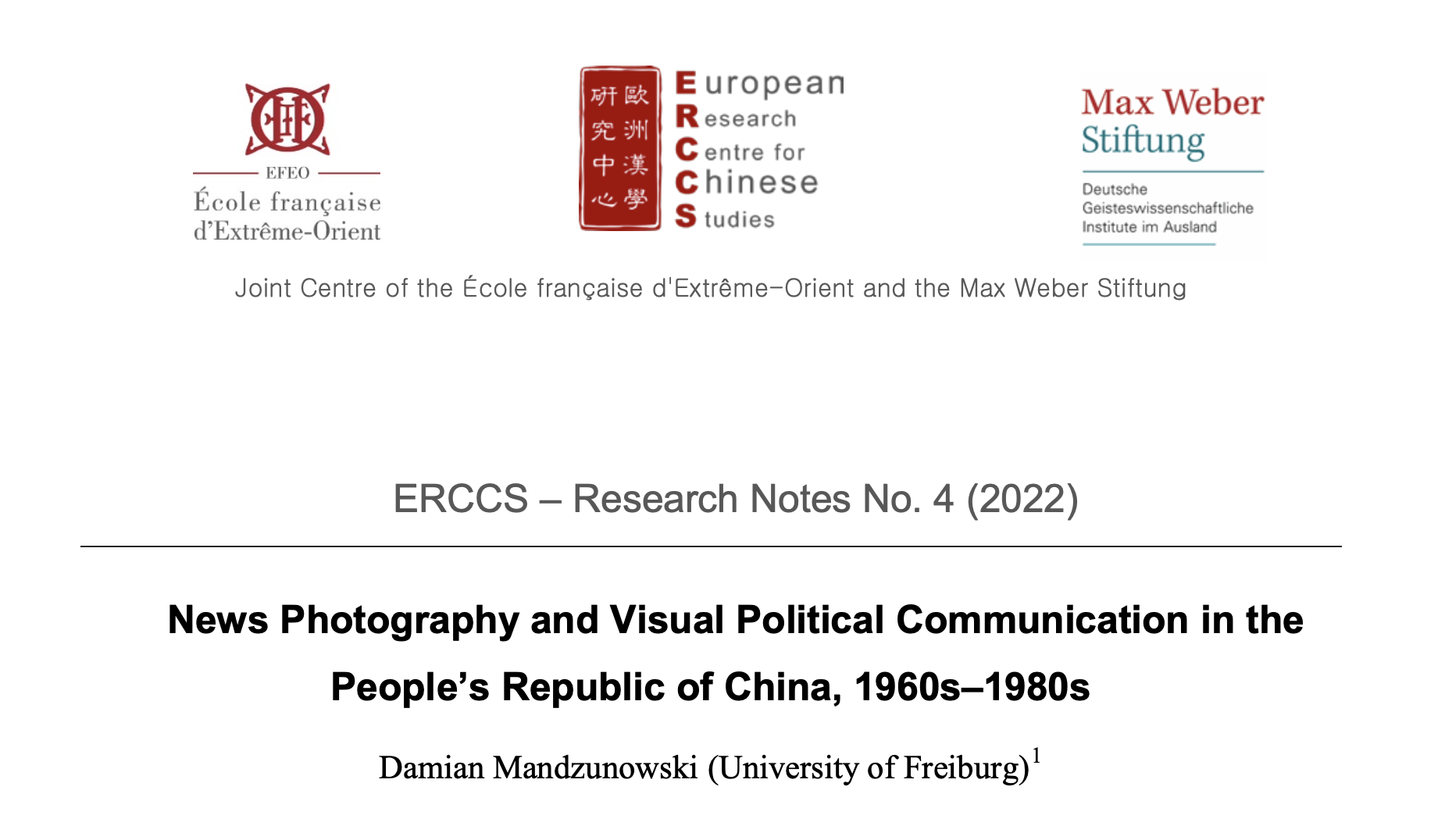
Titled “News Photography and Visual Political Communication in the People’s Republic of China, 1960s–1980s,” the article seeks for answers to the question about how participants in collective reading activities knew how to behave by exploring mimetic, instructive and blueprint-like attributes of news photography. You can read it (or download a PDF) here, see also for an abstract:
The Chinese Communist Party (CCP) envisioned the “socialist new person” as a well-read person, who hoped to join the party and ultimately was inspired and guided by texts—books, collections of documents, newspaper articles, reprints of speeches but also political slogans and other—to act as a leader of revolution in advancing the project of socialist enlightenment. Due to this, organized reading was a key practice in the state propaganda system of the People’s Republic of China (PRC), both during the Maoist period (1949–1976) but also at least until the mid-1980s. Given that the PRC as a political body relied on the mobilization of society for political purposes, the CCP made use of group-reading activities to communicate notions of statehood, class struggle and socialist modernization. Through direct involvement in such activities, the readers were meant to embody the texts and, by extension, the socialist values and principles that the texts stood for. At the same time, collective reading (and other formalized propaganda activities) aided the forging of new socialist subjects. Yet, how did ordinary women and men know what patterns of behavior were expected of them during the sessions of collective reading?
Thanks for reading, and you can reach the author with comments or questions here!
A New Edited Volume on Sociology of Reading with Chapters by Lena Henningsen and Eve Y. Lin Is Out Now!
2022-12-12 00:00:00 +0000
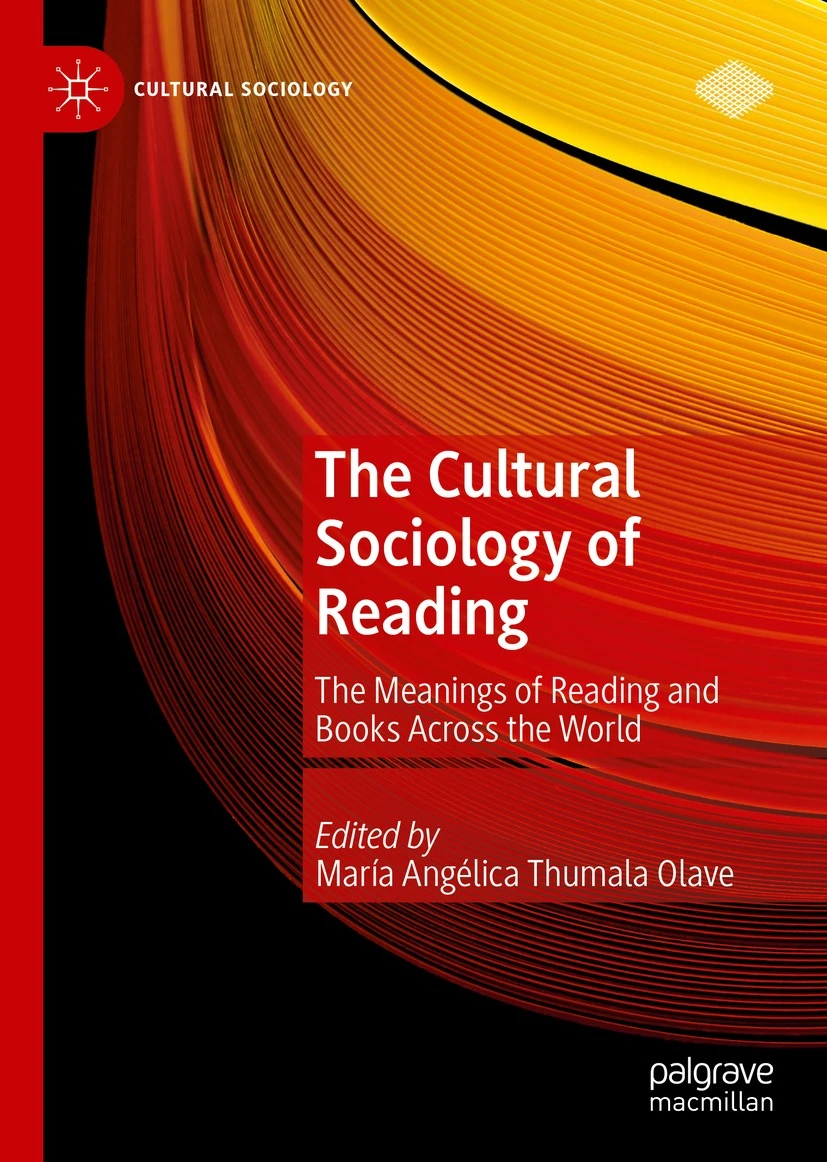
Two members of the READCHINA team have contributed chapters to a just-published edited volume titled The Cultural Sociology of Reading: The Meanings of Reading and Books Across the World, edited by María Angélica Thumala Olave with Palgrave Macmillan.
About the book:
This book showcases recent work about reading and books in sociology and the humanities across the globe. From different standpoints and within the broad perspectives within the cultural sociology of reading, the eighteen chapters examine a range of reading practices, genres, types of texts, and reading spaces. They cover the Anglophone area of the United States, the United Kingdom and Australia; the transnational, multilingual space constituted by the readership of the Colombian novel One Hundred Years of Solitude; nineteenth-century Chile; twentieth-century Czech Republic; twentieth century Swahili readings in East Africa; contemporary Iran; and China during the cultural revolution and the post-Mao period. The chapters contribute to current debates about the valuation of literature and the role of cultural intermediaries; the iconic properties of textual objects and of the practice of reading itself; how reading supports personal, social and political reflection; bookstores as spaces for sociability and the interplay of high and commercial cultures; the political uses of reading for nation-building and propaganda, and the dangers and gratifications of reading under repression. In line with the cultural sociology of reading’s focus on meaning, materiality and emotion, this book explores the existential, ethical and political consequences of reading in specific locations and historical moments.
Eve Y. Lin wrote a chapter under the title “Between Avant-Garde and Kitsch: Intellectual Bookstores and Post-Mao China’s Reading Culture”, abstract:
Post-Mao China’s reading culture, and individual reading in particular, is in constant transformation along with other radical cultural-political transformations in Chinese social life. For the study of post-Mao China’s reading culture, the intellectual bookstore provides an insightful angle for observation. This type of private-run bookstore offers a tangible site in which actual reading activities and actual readers can be observed. It also straddles Chinese high culture and consumer culture and witnesses the shift of cultural trends in contemporary Chinese society. This chapter combines a sociology of (reading) culture with a more intimate cultural sociology of reading. First, by charting the emergence and impacts of individual reading and the historical developments of private-run bookstores in post-Mao China, this chapter macroscopically demonstrates the shift of the Chinese reading culture from a high modernist inclination for the “avant-garde” to the up-and-coming consumer culture, the latter of which could be regarded as “kitsch.” Then, focusing on two case studies of intellectual bookstores in Beijing and Nanjing respectively, this chapter reveals a more nuanced and intricate picture of the interplays between the avant-garde and kitsch in post-Mao China’s reading culture under constant change.
Lena Henningsen’s chapter is titled “The Functions of Reading in Chinese Literature and Society”, abstract:
Starting with the premise that reading always has cognitive, sensory, and emotive attributes, in this contribution to a cultural sociology of reading, I focus on Chinese reading culture during the twentieth and twenty-first centuries. Both early twentieth-century reformers and communist revolutionaries believed in the power of literature as a tool to remold the population into mature readers and citizens and to contribute to the creation of a modern Chinese nation. Chinese citizens were thus educated in a mode of normative reading: people were to take socialist realist heroes as models in their own lives. Similarly, authors of literary texts were to base fictional protagonists on famous Soviet prototypes, thereby translating the mode of normative reading into Chinese fiction. In the second part of the chapter, I trace reading acts in fictional texts. These point to a mechanism involving mutual meaning generation. First, through a fictional reading act, two texts—the text being read and the text in which this text is read—are linked to each other, I argue, one serving as interface to the other and thus impacting on how real-life readers interpret both texts. Second, these reading acts demonstrate that literary texts contributed to the establishment of the mode of normative reading while at the same time challenging it.
Lara Y. Yang and Damian Mandzunowski Took Part in the 24th Biennial Conference of the European Association for Chinese Studies (EACS)
2022-08-29 00:00:00 +0000
Two members of the READCHINA team took part in the 24th biennial conference of the European Association for Chinese Studies (EACS) held this year in Olomouc, Czech Republic (see the conference website and the conference program for more details).
Lara Y. Yang was part of a panel named “Reading and Writing Early Socialism in China: Challenges in an Unstable Cultural Field” where she presented a paper titled “Reading Dust from the Past: Second-hand Book-reading Culture in 1950s China”, alongside presentations by Dong Sisi and Robert J. Culp, with discussant comments delivered by Joan Judge.
Damian Mandzunowski presented a paper titled “Collective Reading in Chinese Comics of the Mao Era: A Socialist-Realist Deus ex Machina?”, at a panel chaired by Laura Pozzi named “Caricatures in Flux: Cartoons and Comics in Changing China, 1930s–1980s” that also included papers by Mariia Guleva, Nick Stember, Piotr Strzałkowski, and discussant comments by Jeremy Taylor.
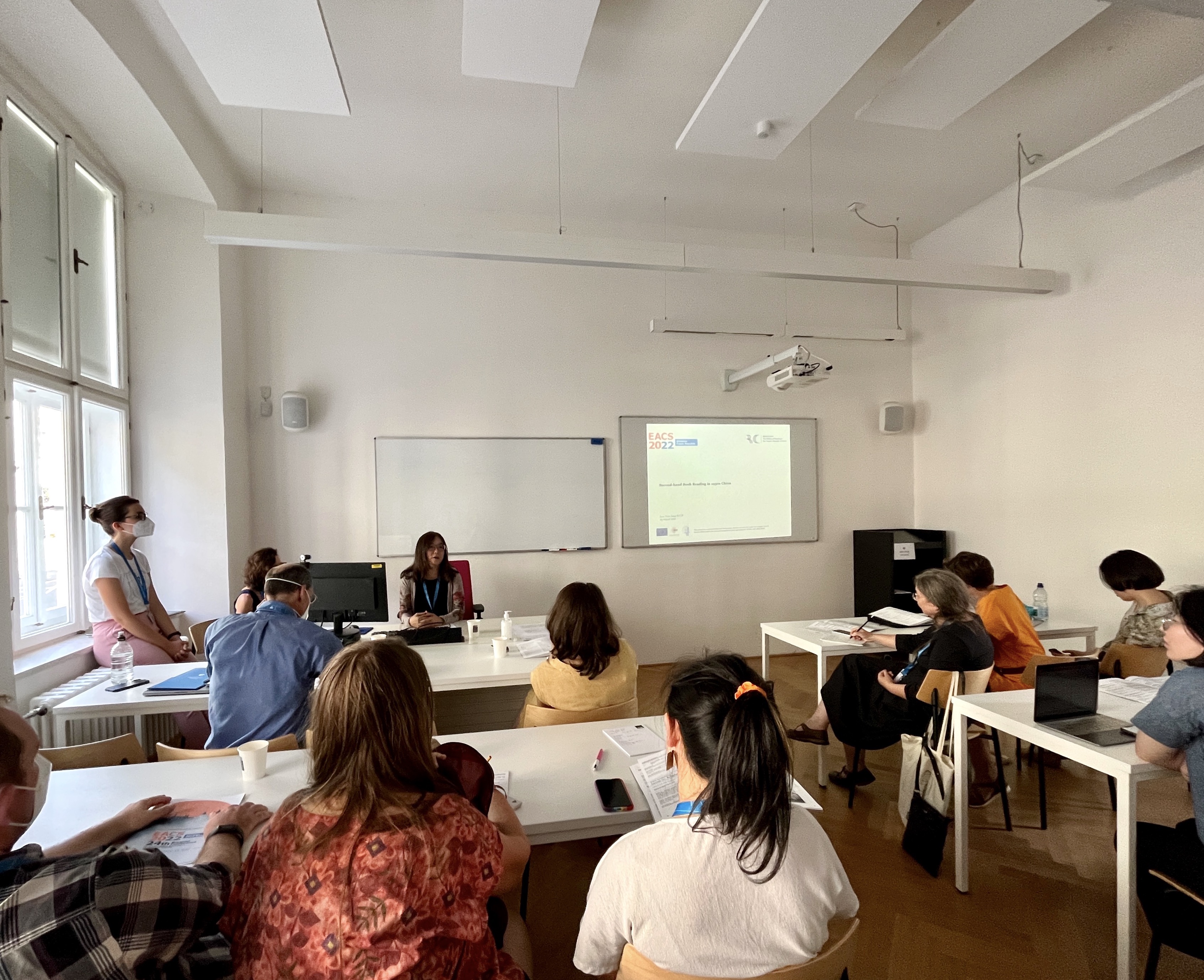
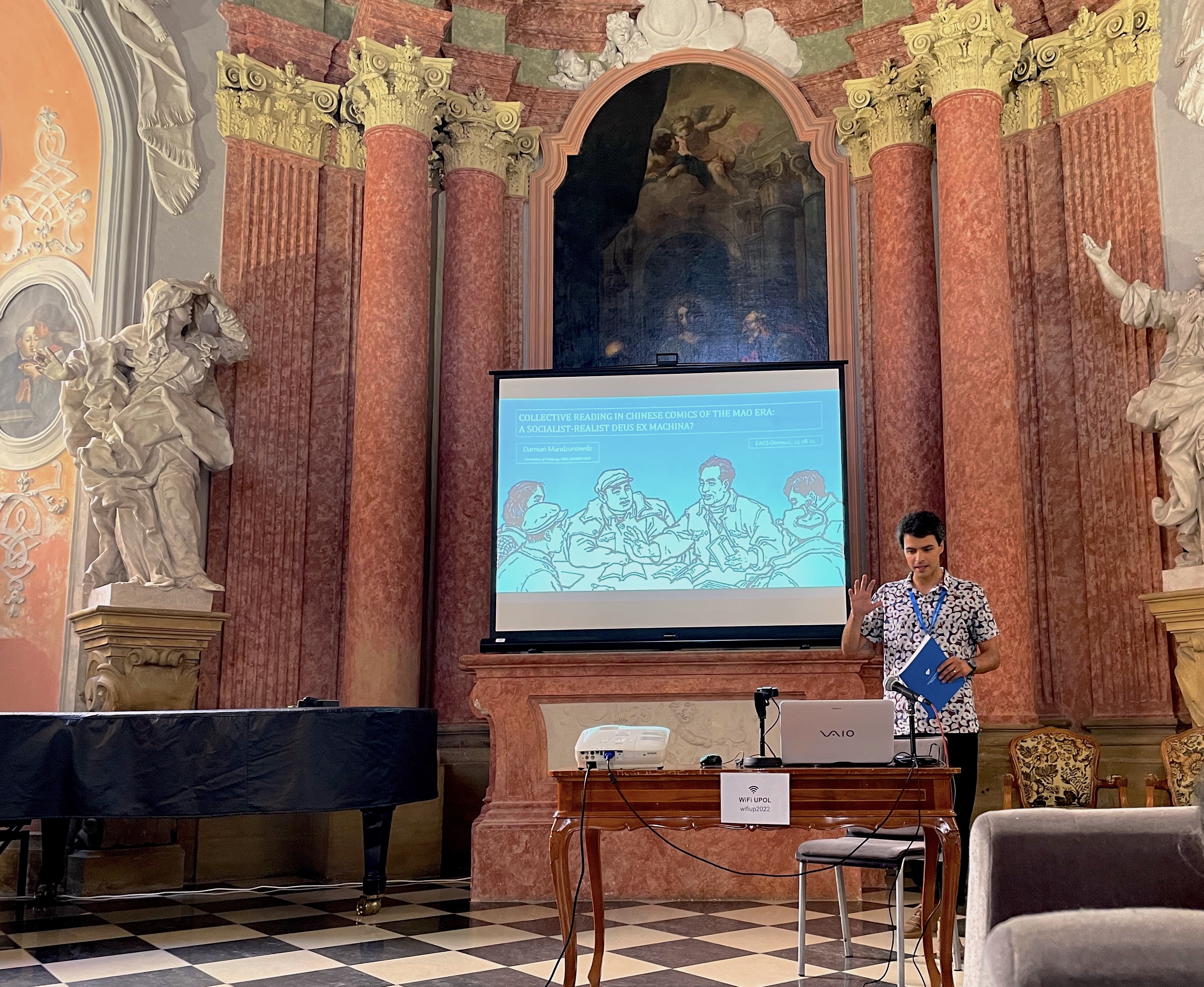
New Book Review by Damian Mandzunowski Published in the Historische Zeitschrift
2022-08-01 00:00:00 +0000
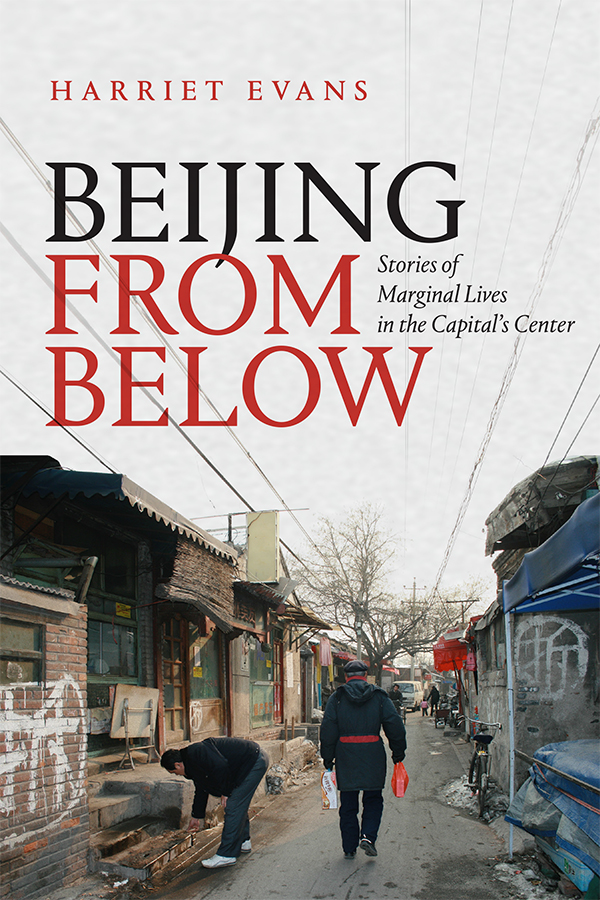
READCHINA’s Damian Mandzunowski has written a short review (in German) of Harriet Evans’ recent book, Beijing from Below: Stories of Marginal Lives in the Capital’s Center (Durham: Duke UP, 2020). You can read it here.
For more details, see this interview with Harriet Evans in the Made in China Journal, or this discussion of the book at the New Books Network podcast.
Talk by Lena Henningsen in Naples on Tansformations of Lu Xun in Chinese Comics
2022-06-12 00:00:00 +0000
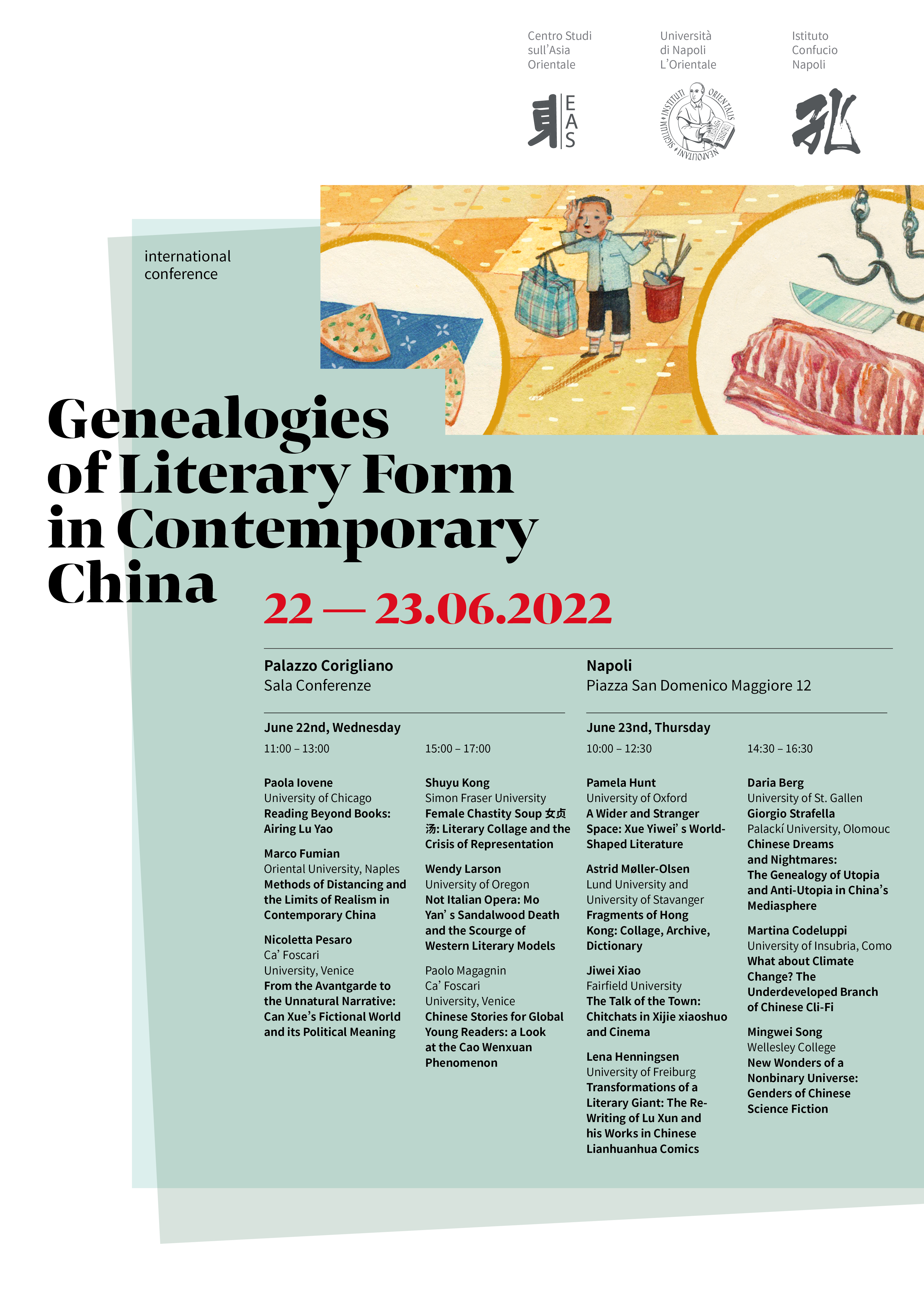
READCHINA’s Lena Henningsen will present a talk titled “Transformations of a Literary Giant: The Re-Writing of Lu Xun and His Works in Chinese Lianhuanhua Comics” at the international conference “Genealogies of Literary Form in Contemporary China” organized by the Centro Studi sull’Asia Orientale and the Instituto Confucio Napoli held at the Università Orientale, Napoli, between June 22-23, 2022.
The program and further details can be seen here, and click here for the the conference abstract.
Talk by Lena Henningsen in Zurich on Lei Feng in Chinese Comics as Model Reader
2022-04-25 00:00:00 +0000
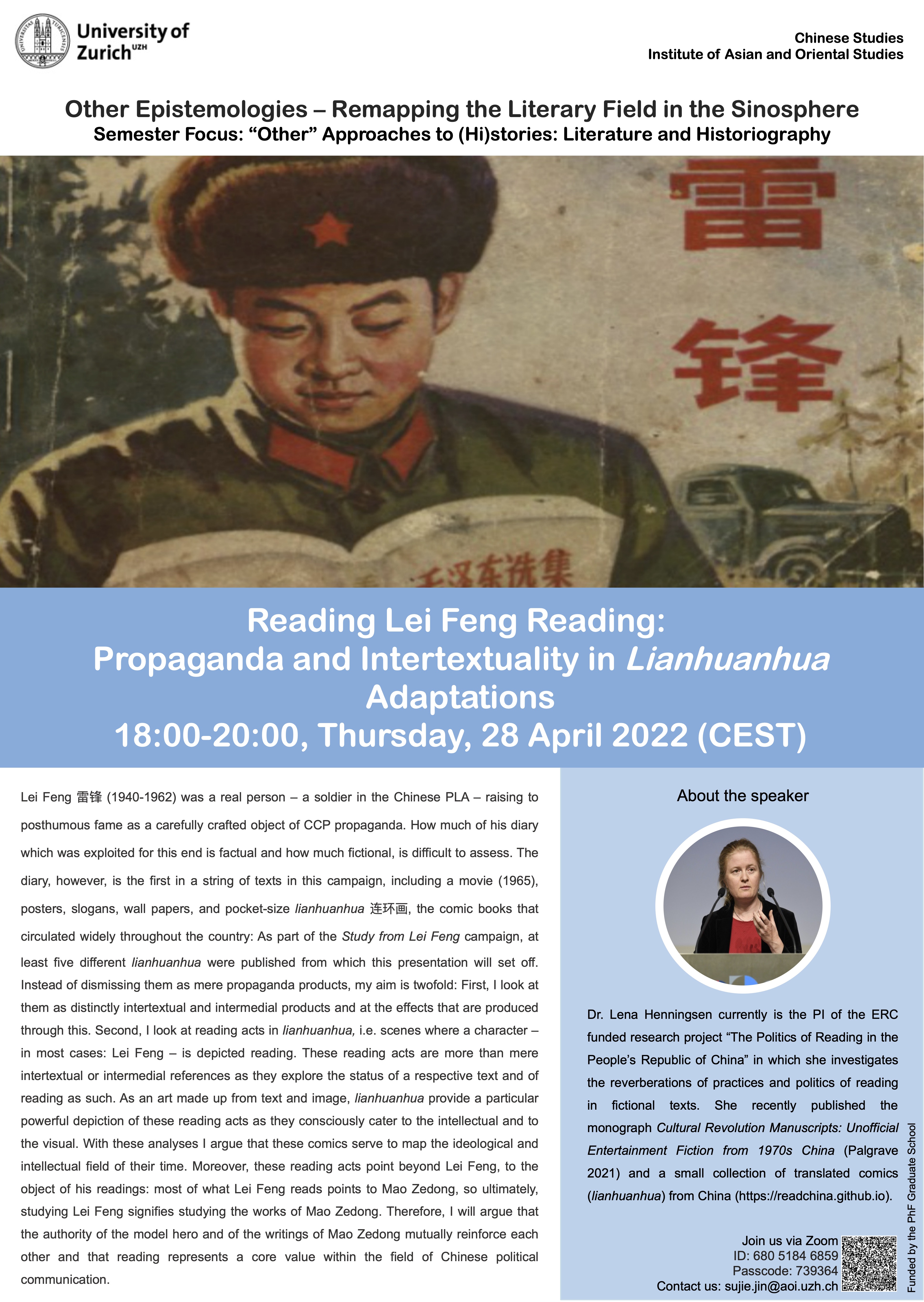
READCHINA’s Lena Henningsen will present her new research titled “Reading Lei Feng Reading: Propaganda and Intertextuality in Lianhuanhua Adaptations” during the lecture series Other Epistemologies – Remapping the Literary Field in the Sinosphere at the University of Zurich on Thursday April 28, 2022, at 18:00 (CET/UTC+2).
The talk will take place online via Zoom here, passcode: 739364; please register by sending an email to Sujie Jin.
Abstract: Lei Feng 雷锋 (1940-1962) was a real person – a soldier in the Chinese PLA – raising to posthumous fame as a carefully crafted object of CCP propaganda. How much of his diary which was exploited for this end is factual and how much fictional, is difficult to assess. The diary, however, is the first in a string of texts in this campaign, including a movie (1965), posters, slogans, wall papers, and pocket-size lianhuanhua 连环画, the comic books that circulated widely throughout the country: As part of the Study from Lei Feng campaign, at least five different lianhuanhua were published from which this presentation will set off. Instead of dismissing them as mere propaganda products, my aim is twofold: First, I look at them as distinctly intertextual and intermedial products and at the effects that are produced through this. Second, I look at reading acts in lianhuanhua, i.e. scenes where a character – in most cases: Lei Feng – is depicted reading. These reading acts are more than mere intertextual or intermedial references as they explore the status of a respective text and of reading as such. As an art made up from text and image, lianhuanhua provide a particular powerful depiction of these reading acts as they consciously cater to the intellectual and to the visual. With these analyses I argue that these comics serve to map the ideological and intellectual field of their time. Moreover, these reading acts point beyond Lei Feng, to the object of his readings: most of what Lei Feng reads points to Mao Zedong, so ultimately, studying Lei Feng signifies studying the works of Mao Zedong. Therefore, I will argue that the authority of the model hero and of the writings of Mao Zedong mutually reinforce each other and that reading represents a core value within the field of Chinese political communication.
Talk by Dayton Lekner on Aural History of Maoism at the Ca' Foscari University of Venice
2022-04-21 00:00:00 +0000
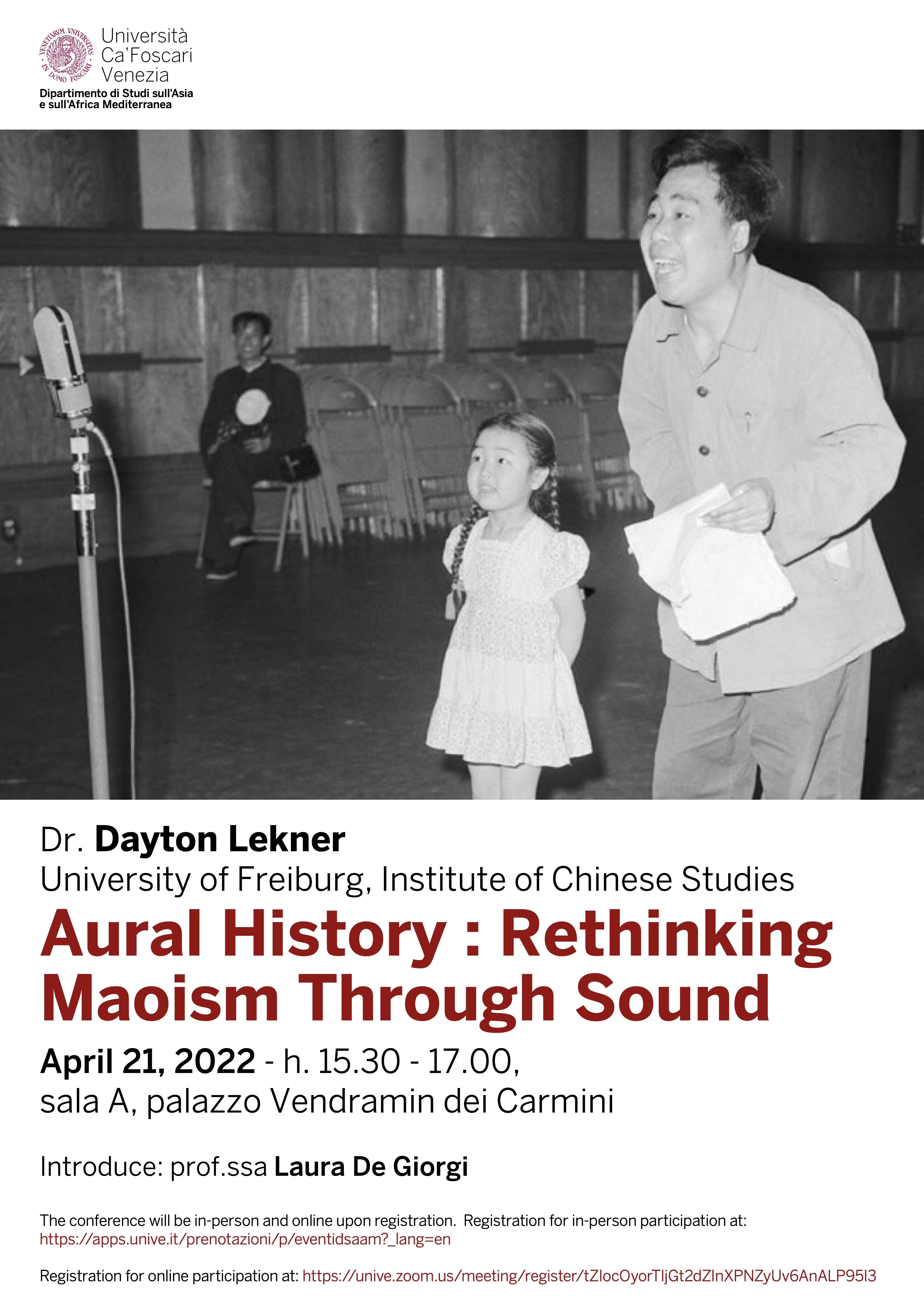
READCHINA affiliated scholar Dr Dayton Lekner held a talk at the Department of Asian and North African Studies at the Ca’ Foscari University of Venice on Thursday April 21, 2022, titled Aural History : Rethinking Maoism Through Sound.
In this talk, he discussed his doctoral work, how this led him to a focus on sound, and what sound studies might contribute to a history of the People’s Republic of China.
READCHINA Took Part in the 2022 Annual Conference of the Association for Asian Studies (AAS) held in Honolulu
2022-04-10 00:00:00 +0000
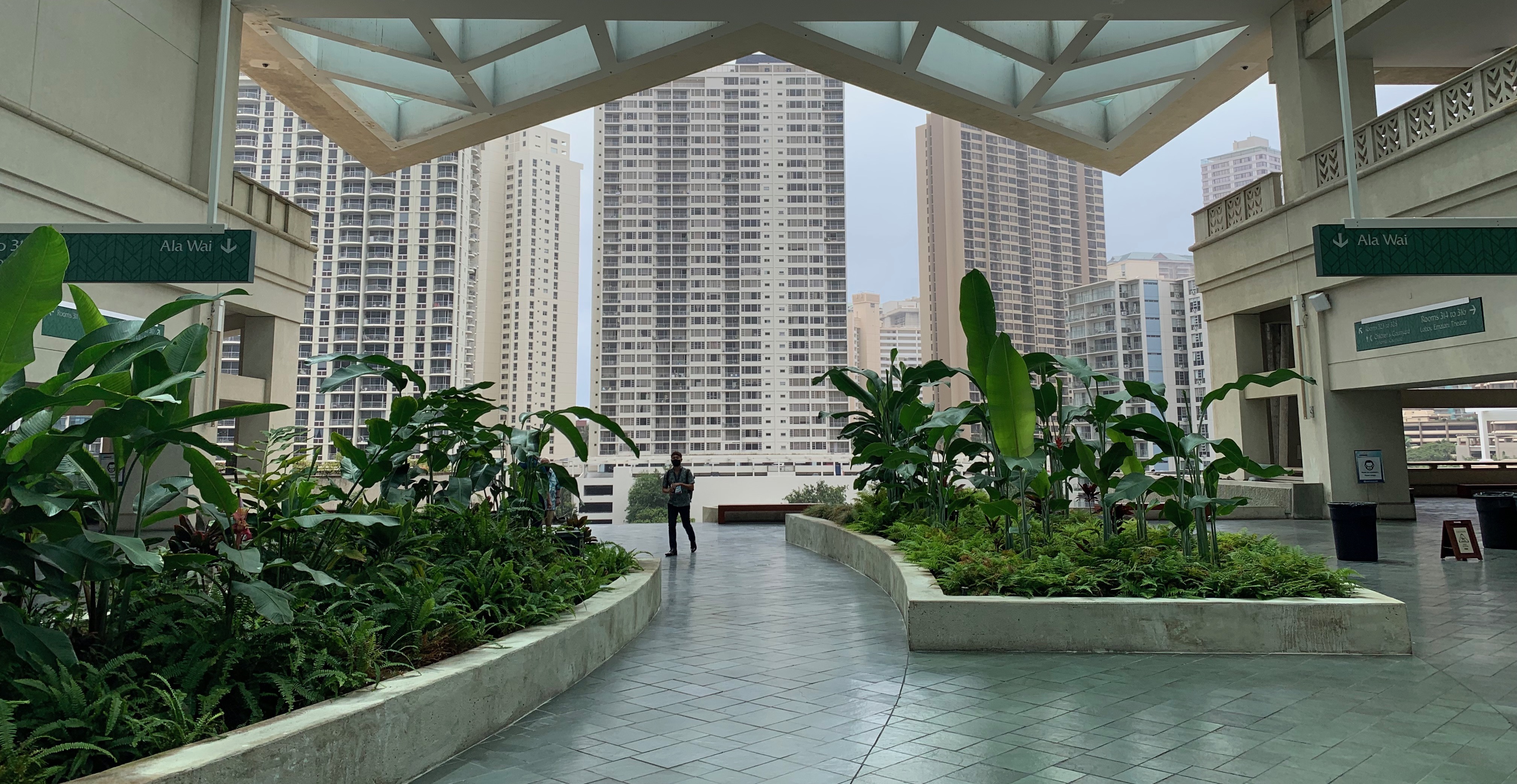 A look from inside the Hawai‘i Convention Center, the venue of the AAS 2022 conference
A look from inside the Hawai‘i Convention Center, the venue of the AAS 2022 conference
Four members of the READCHINA team took part in a first large-scale international in-person conference in over three years: the annual conference of the Association for Asian Studies (AAS) held this year Honolulu, Hawai’i, USA (see the conference’s program for more details).
Lena Henningsen, Dayton Lekner and Lara Y. Yang were part of a panel they organized under the title “G05: Working with Absence in 20th Century China: Gaps, Ellipses, Silences, and How They Shape History” alongside Andrew Walder, Zhuoyi Wang and Fei Yan.
Damian Mandzunowski was Panel Organiser and Paper Presenter of panel “L10: The Making and Remaking of Socialist Subjects in the People’s Republic of China, 1950s-1980s” together with Robert J. Culp, Yi Ren and Ben Kindler.
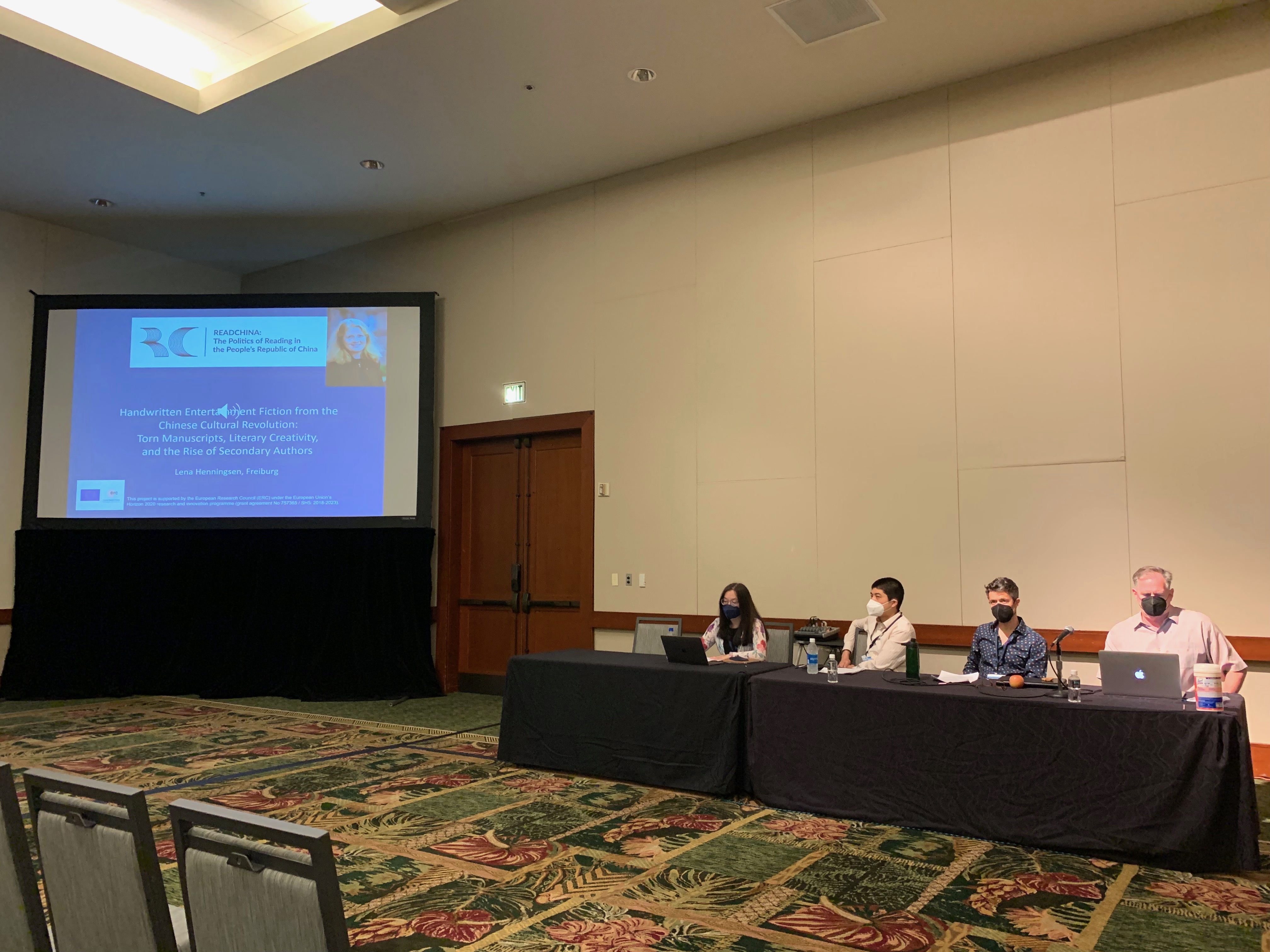
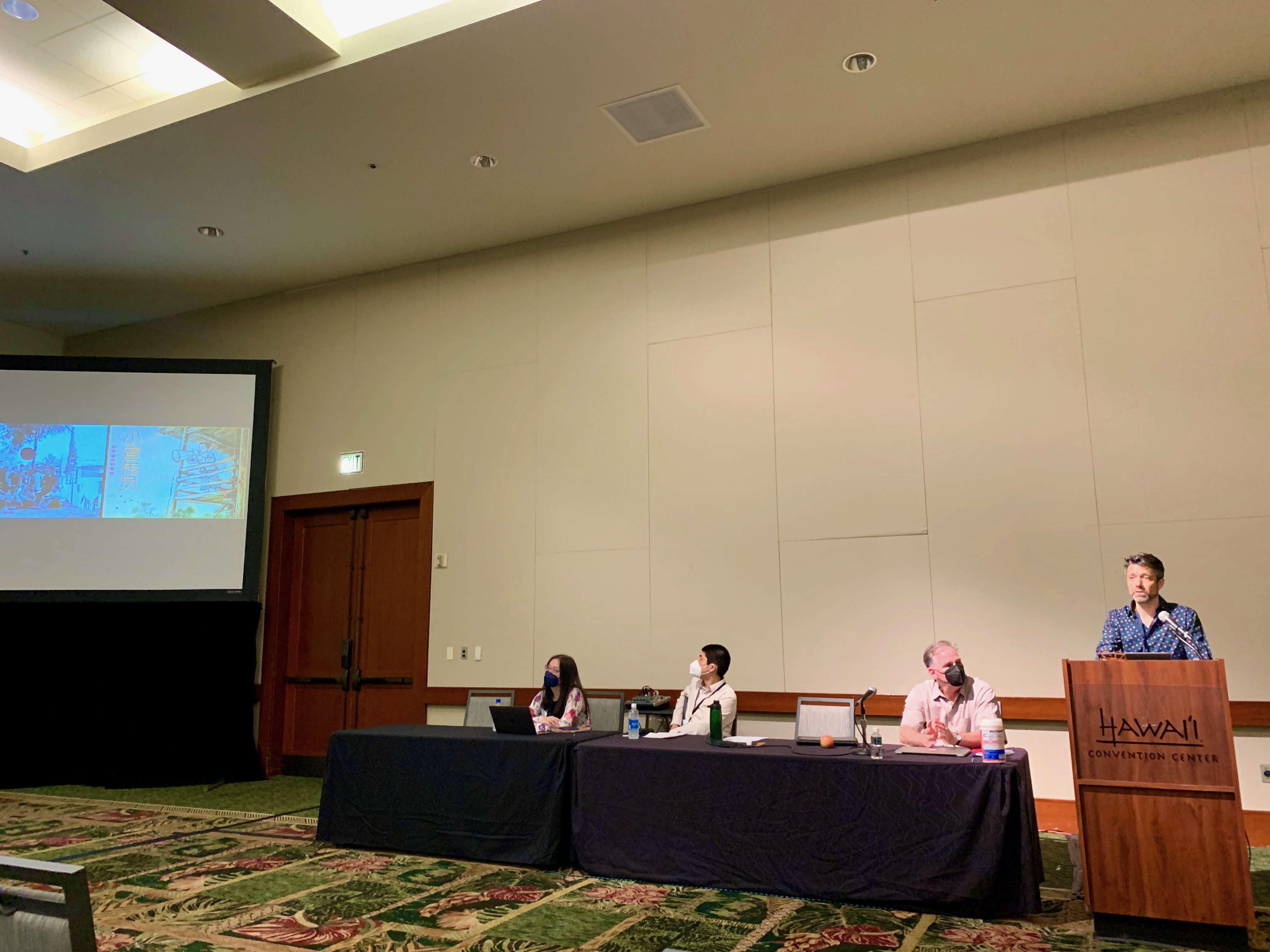
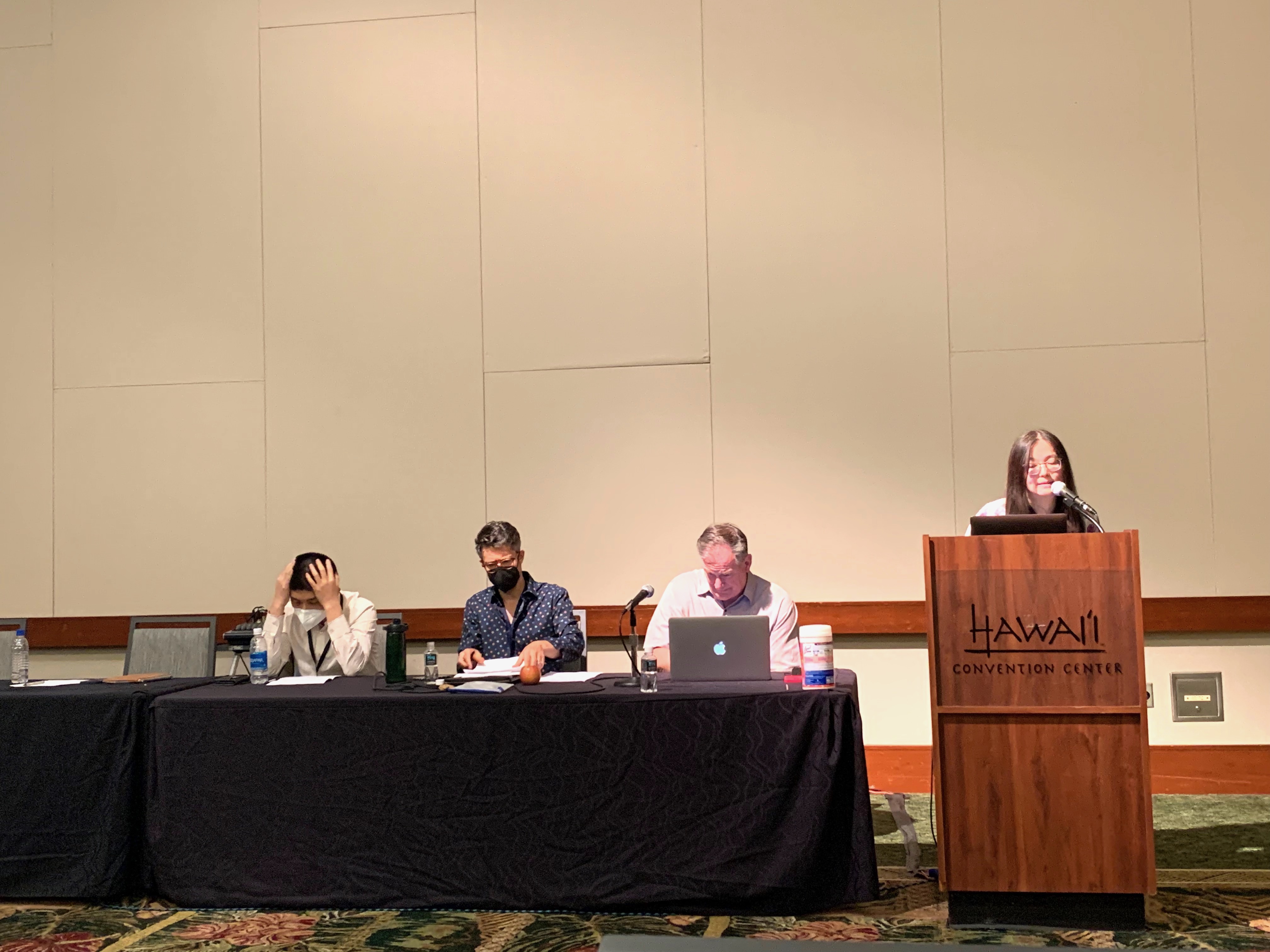
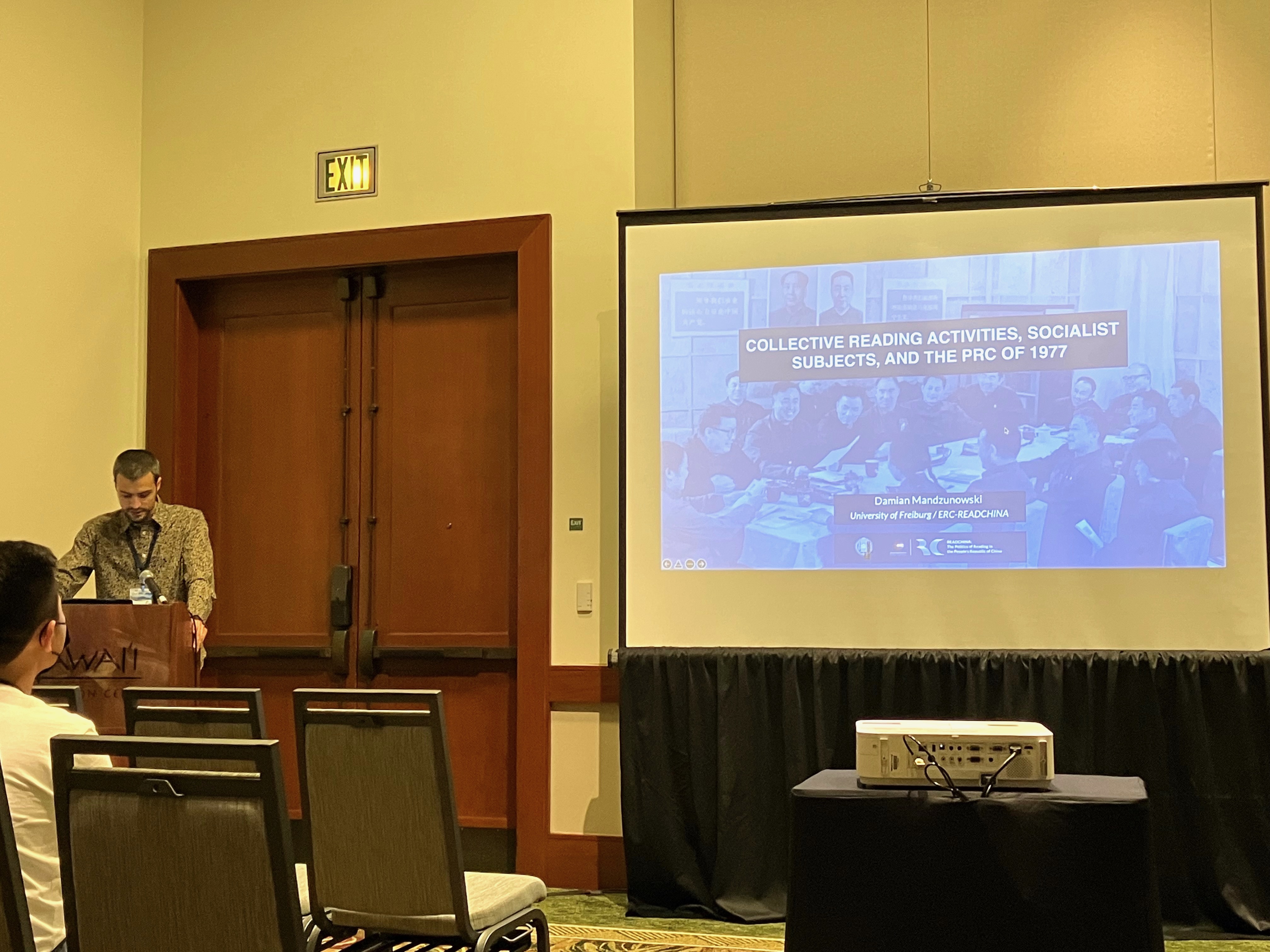
(top left) Lena Henningsen virtually delivering her paper Handwritten Entertainment Fiction From the Cultural Revolution: Torn Manuscripts, Literary Creativity, and the Rise of Secondary Authors. (top right) Dayton Lekner presenting his paper Aural History: Re-sounding China's 20th Century. (bottom left) Lara Y. Yang providing discussant comments for the panel. (bottom right) Damian Mandzunowski sharing his paper Collective Reading Activities, Socialist Subjects, and the PRC of 1977.
Dayton Lekner Awarded the Marie Skłodowska-Curie Postdoctoral Fellowship
2022-04-03 00:00:00 +0000

We are happy to announce that READCHINA affiliated scholar Dr Dayton Lekner has been awarded the esteemed Marie Skłodowska-Curie Postdoctoral Fellowship by the European Commission!
After finishing an Alexander von Humboldt Fellowship at Freiburg, Dayton will continue conducting their research at the Ca’ Foscari University of Venice.
The READCHINA team congratulates our colleague and is looking forward to reading their future research outputs!
Lara Y. Yang and Damian Mandzunowski will Present Papers at a Crisis & Materiality Symposium at The Ohio State Univ.
2022-03-03 00:00:00 +0000
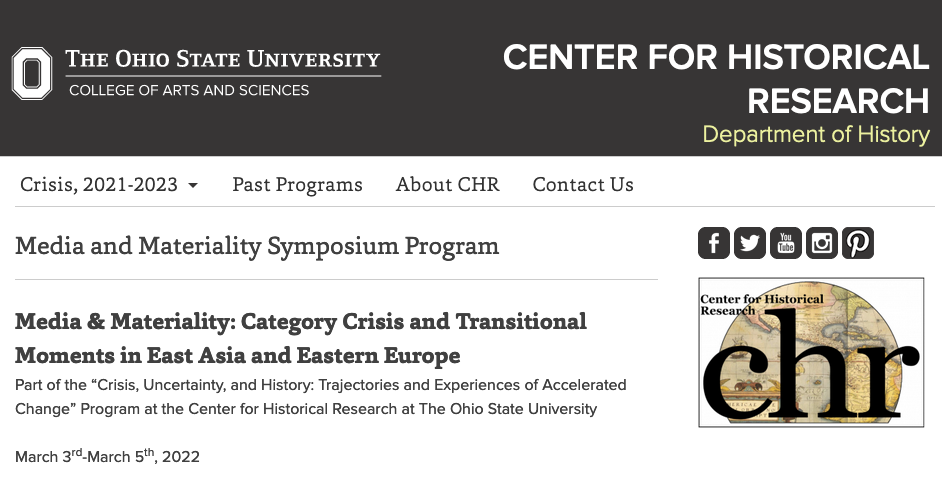
READCHINA’s Lara Y. Yang and Damian Mandzunowski will present papers at an online symposium at the Center for Historical Research at The Ohio State University titled Media & Materiality: Category Crisis and Transitional Moments in East Asia and Eastern Europe held between March 3-5, 2022.
Download the program here and register to attend here.
On March 4, Damian Mandzunowski will talk about his paper “Reading Through What Crises? Volume 5 of Mao’s Selected Works as Calming Medium in a Changing Socialist China,” abstract:
On April 15, 1977, the much-delayed fifth volume of the Selected Works of Mao Zedong was published. Twenty years had passed since the preceding volume came out in 1960; twenty years during which radical changes turned upside down what stood solid thus far. Only in 1976 three top leaders died—including, of course, Mao himself—and four other politburo members were arrested and accused of highest counterrevolutionary crimes. Hua Guofeng, the heir-apparent and new CCP Chairman, faced an uphill battle to win over the party immersed in factional divisions and the people after years of Cultural Revolutionary struggles. This paper proposes to look at volume 5 of Mao’s Selected Works as a calming medium applied by Hua and his supporters to counteract the growing crises. Being personally responsible for the editorial work, Hua took a central role in the ensuing mass campaign propagating the publication. Photographs and other visual media communicated the message that with Hua in charge, all is at ease. Then, organized group reading activities at all work units were to bring that notion down to the readers. Thus, by symbolically transforming the very materiality of the printed book, harmony was to be restored and the spirit of Mao to manifest in Hua
And on March 5, Lara Y. Yang will present on “Dust Hunters in the Confucius.com Era: How the Internet Changed the Identity Ecology of Second-hand Book Culture in China,” abstract:
A bibliophile of second-hand books inevitably focuses on the defects and alterations to a book, since it is these qualities that make it as “second-hand”. I define these alterations as “dust”. Travelling between the anonymous hands of dust hunters, including book sellers, buyers, garbage dealers and librarians etc., it is the dust that gradually remoulds each copy of a second- hand book via wear, marks and stains. For this paper, I have coined the term “dust hunter” for second-hand book readers. It is drawn from taoshuren, or book-hunting man, a popular term which often appears in written texts in the modern Chinese context and refers to readers – mostly male - who actively hunt for books. When a second-hand book is digitised, however its physicality – its dust – is lost in the virtual world. How, then, do dust hunters engage with the material aspects of a book through digital platforms?
Talk by Damian Mandzunowski on Depictions of Reading Activities in Visual Media
2022-01-17 00:00:00 +0000
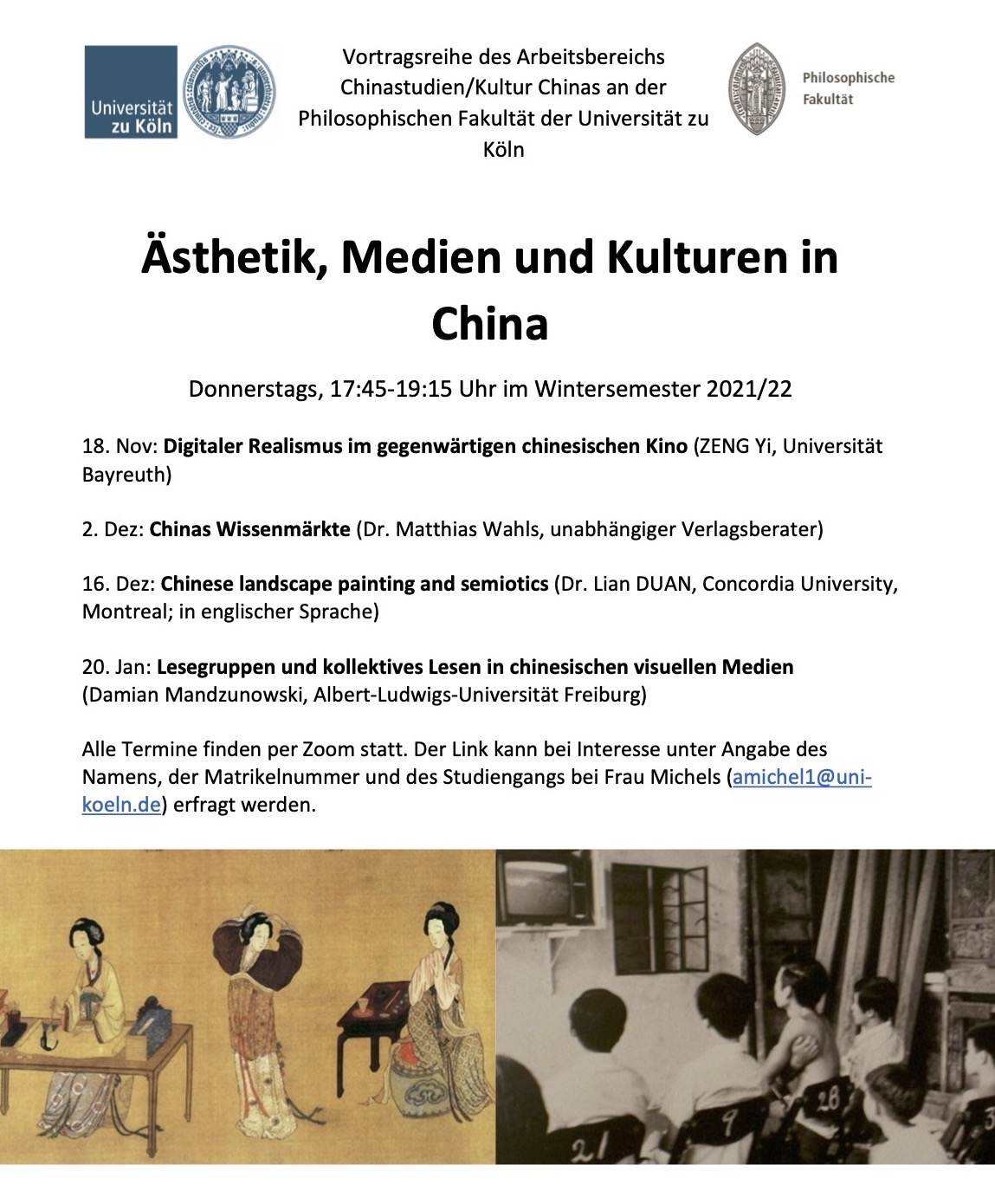
READCHINA’s Damian Mandzunowski will present parts of his ongoing dissertational research during a lecture series on Chinese aesthetics, media and culture held at the Institute of East Asian Studies - Chinese Studies of the University of Cologne on Thursday January 20, 2022, at 17:45 (CET/UTC+1).
The talk will be in German and take place online via Zoom; to receive a link, please register by sending an email to Angelika Michels here.
The READCHINA Team Took Part in the 2021 Annual Conference of the German-Region Association for China Studies (DVCS) held in Freiburg
2021-11-23 00:00:00 +0000
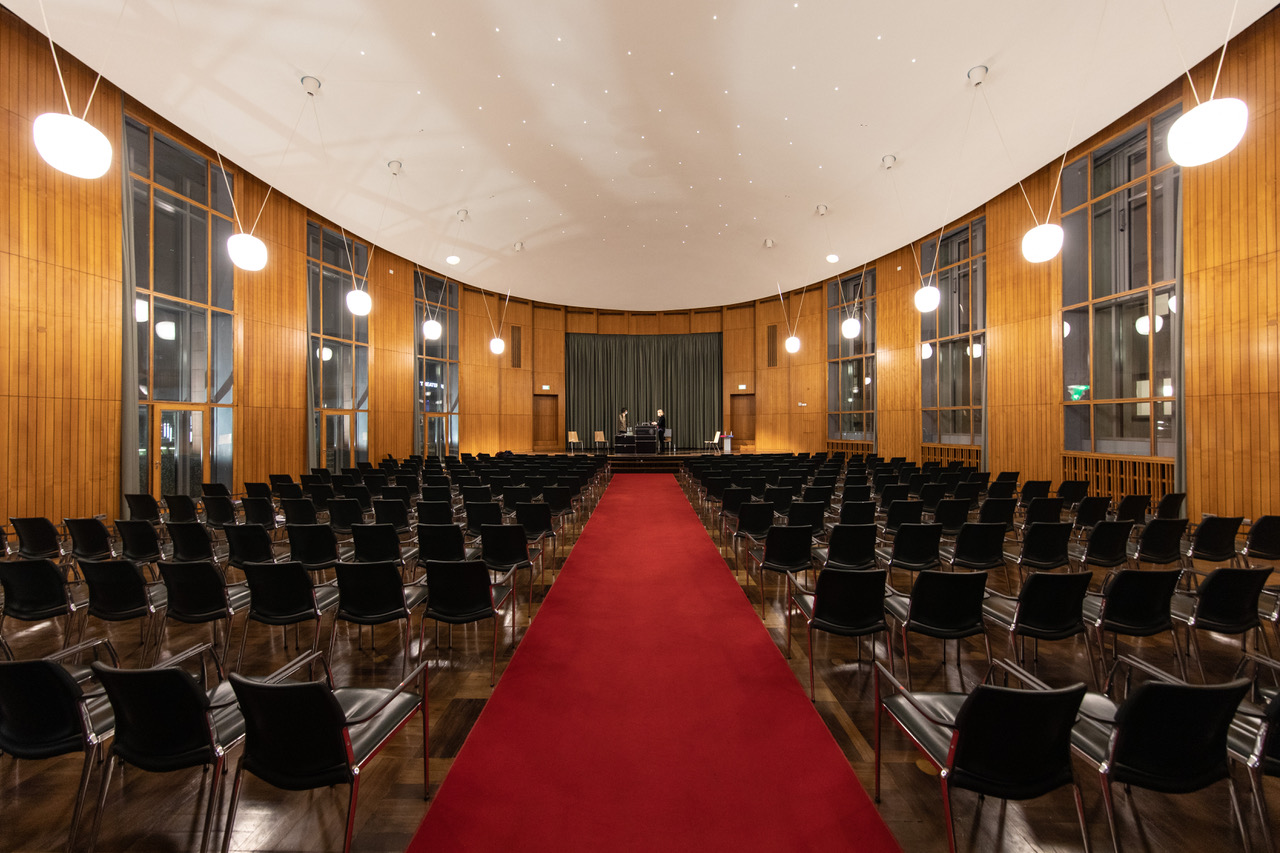 The Aula of the University of Freiburg, the setting of the conference (photo: Tilman Schalmey)
The Aula of the University of Freiburg, the setting of the conference (photo: Tilman Schalmey)
The READCHINA team was happy to take part in a first in-person conference in almost two years: the annual meeting of the German-Region Association for China Studies (DVCS) organised this year in Freiburg by Lena Henningsen, Daniel Leese and Damian Mandzunowski (see the conference’s website for more details). The theme of the conference was WISSENSASYMMETRIEN:CHINA ALS AKTEUR UND OBJEKT (GLOBALER) DEBATTEN (English: Knowledge Asymmetries: China as Agent and Object in (Global) Debates; Chinese: 知识的偏位:全球辩论中作为主动者与客体的中国).
Lena Henningsen welcomed the guests and took part in an exciting panel discussion revolving around the role of China-experts and institutes for Chinese studies in the German-region in the current political and economic global situation. Eve Y. Lin and Lara Y. Yang both presented their most recent research outputs: Eve Y. Lin shared the ongoing advancements of her dissertation based on just-finished extensive fieldwork research; Lara Y. Yang, who was unable to take part in person but had her paper read out by Duncan Paterson, presented the DUST database and related discoveries. Damian Mandzunowski was Discussant in a panel on contemporary Chinese cinema.
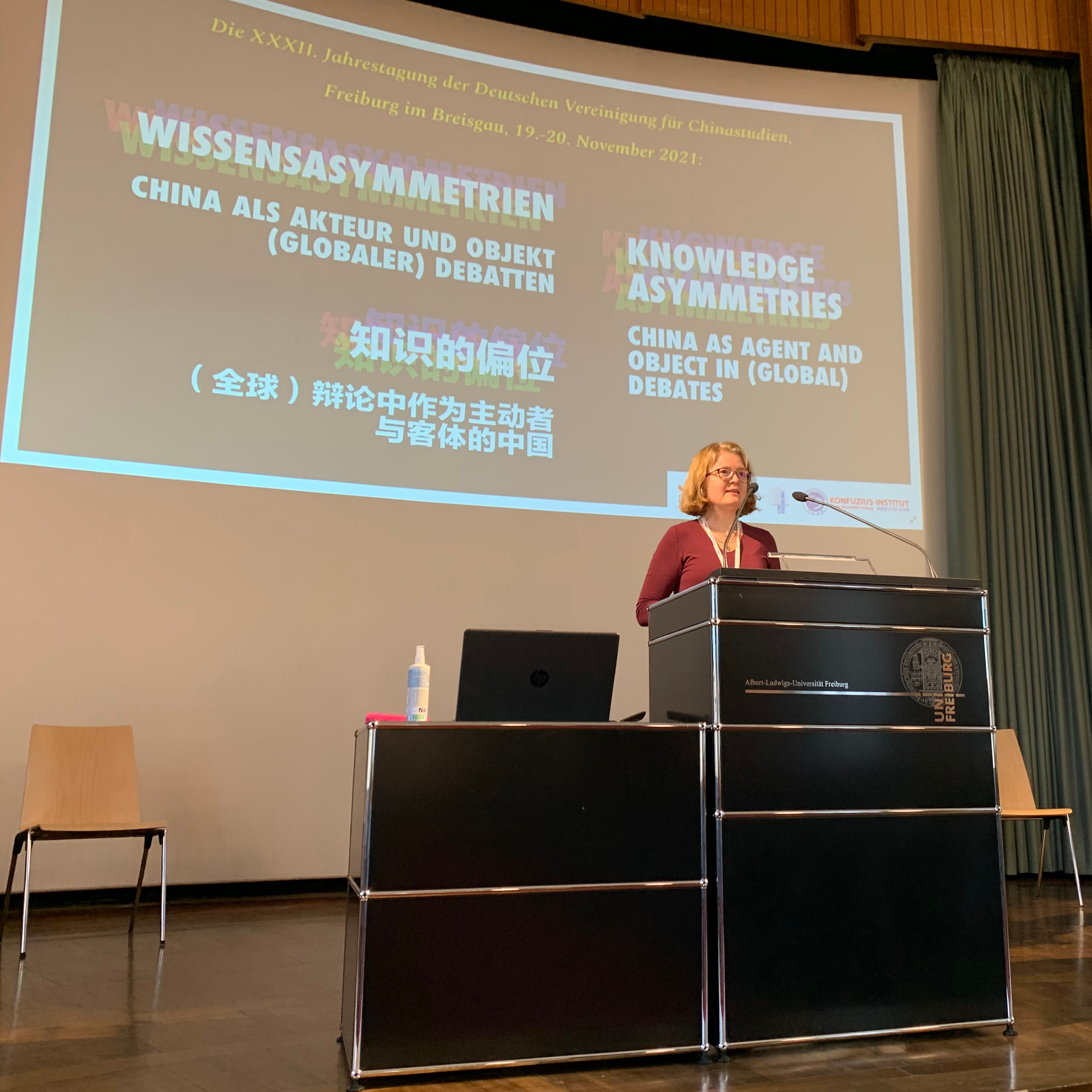
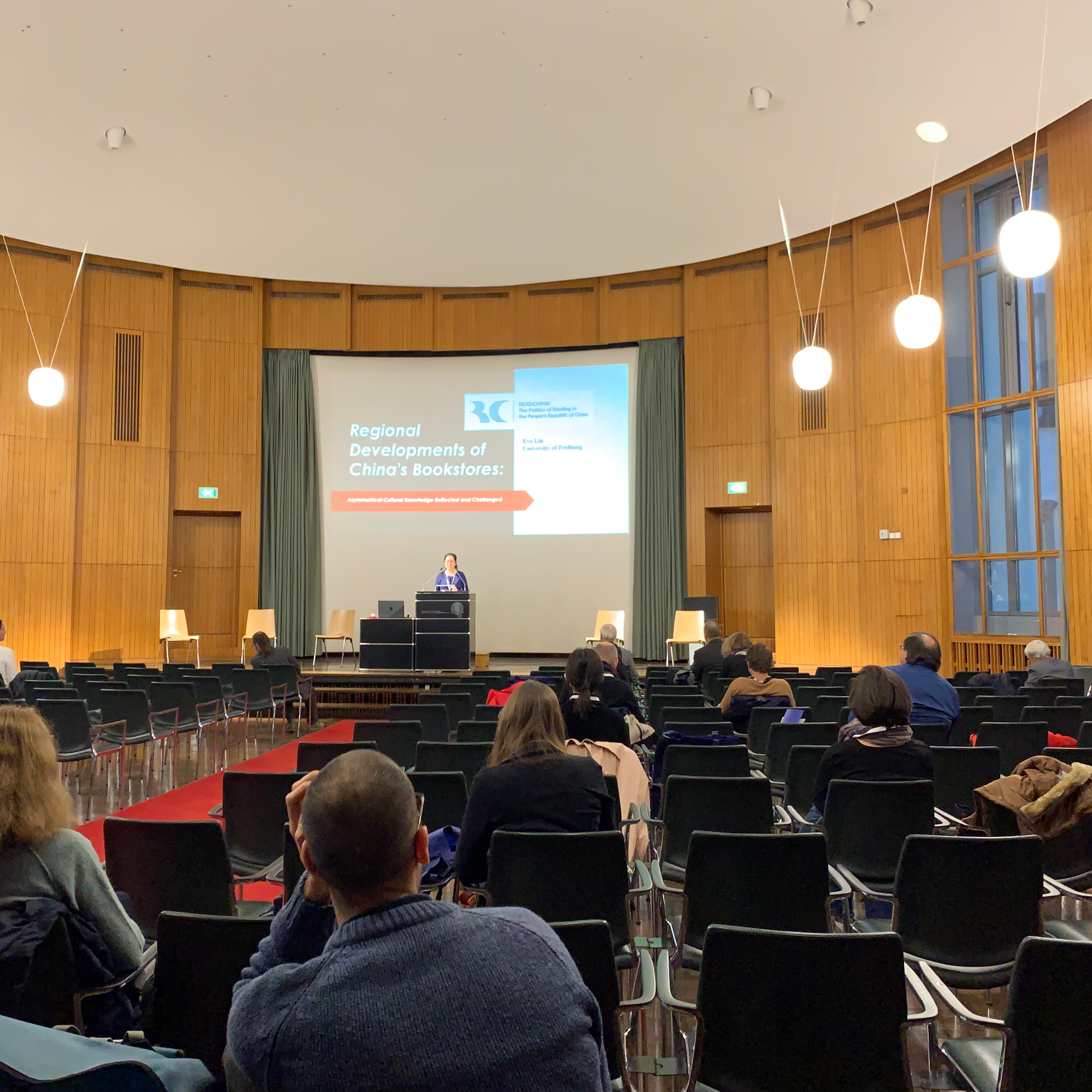
(left) Lena Henningsen delivering the opening remarks. (right) Eve Y. Lin presenting her paper Regional Developments of China’s Bookstores: Asymmetrical Cultural Knowledge Reflected and Challenged.
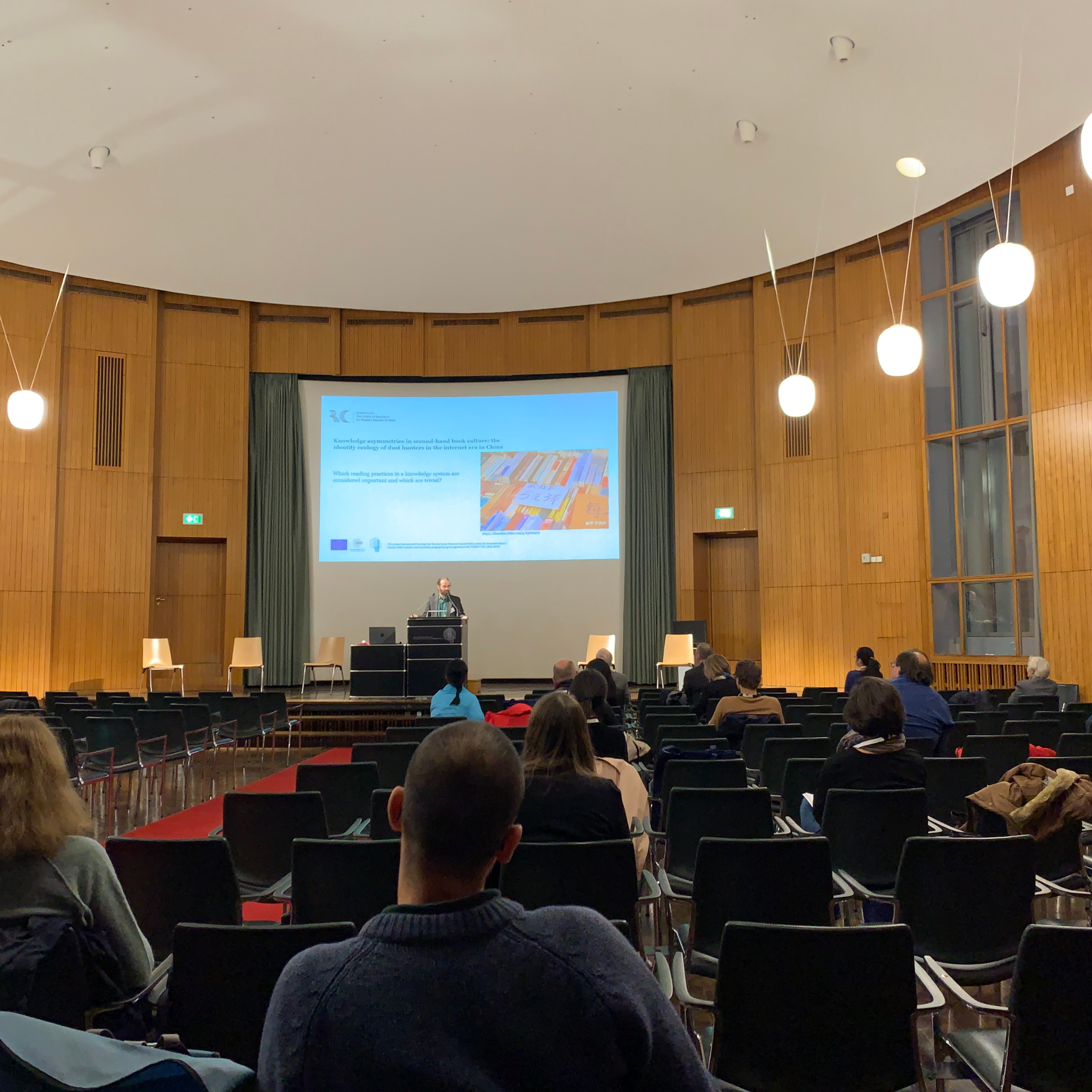
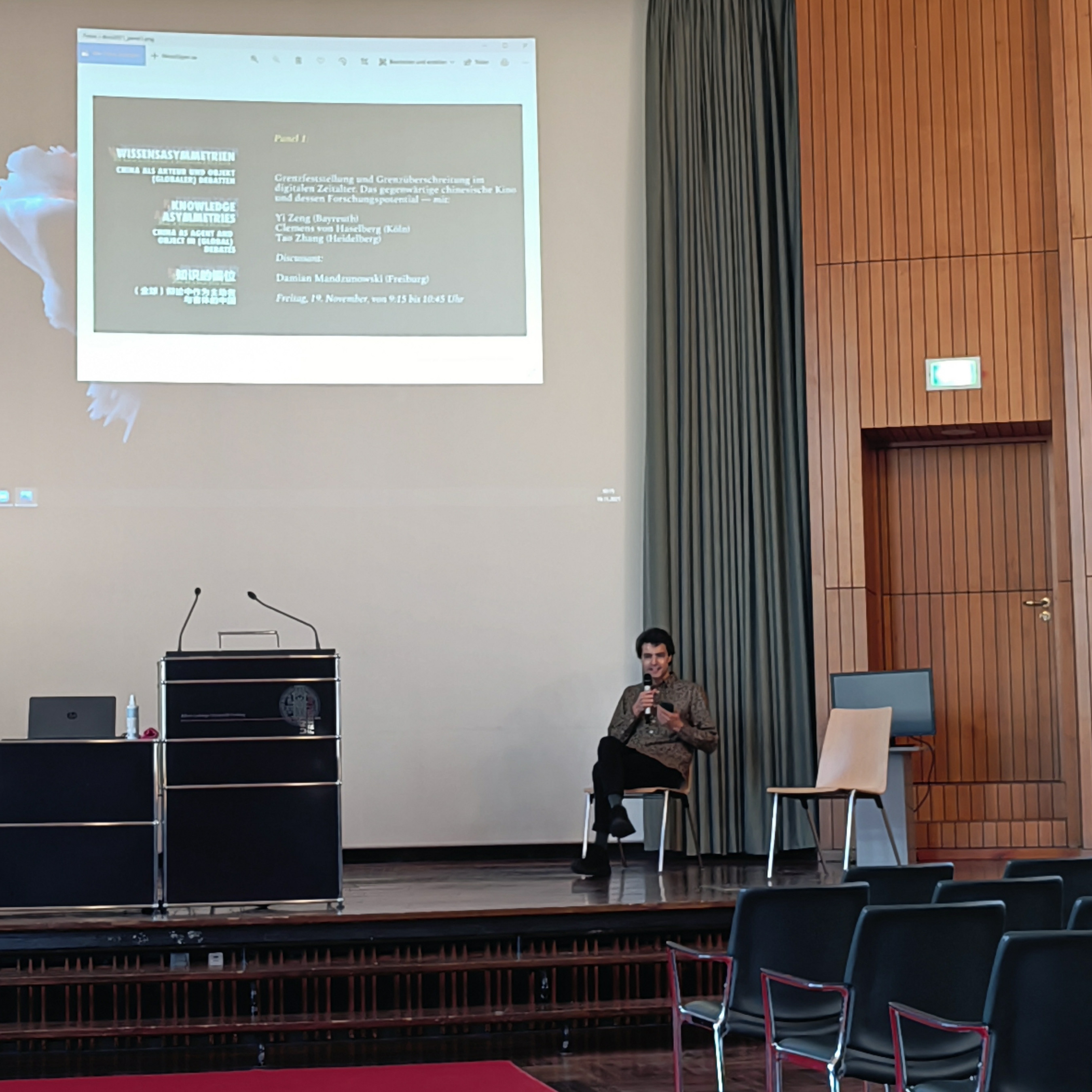
(left) Duncan Paterson reading the paper of Lara Y. Yang titled Dust Hunters in the Confucius-dot-com Era: Identity Ecology in Second-hand Book-reading Culture in the Time of the Internet in China. (right) Damian Mandzunowski voicing discussant comments.
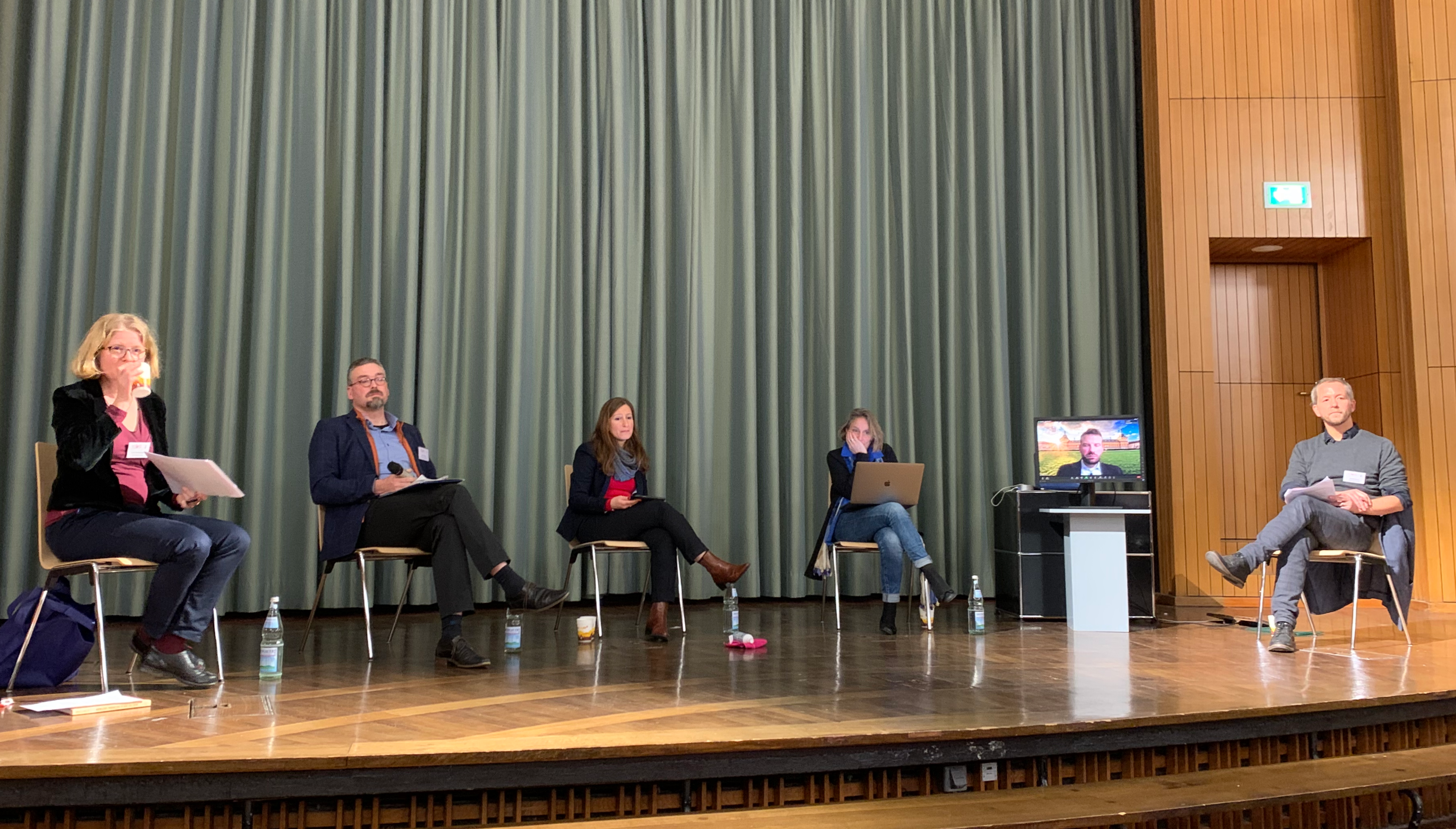 The panel discussion ‘Professionelle „China-Versteher“ zwischen allen Stühlen? Die Sinologie im Spannungsfeld von Politik, Moral und öffentlicher Erwartungshaltung (English: “China Experts” Between All Chairs? Sinology in the Field of Tension Between Politics, Morality and Public Expectations),’ from left to right: JProf. Dr. Lena Henningsen, Prof. Dr. Marc Andre Matten, Marina Rudyak, Prof. Dr. Barbara Mittler, Prof. Dr. Maximilian Mayer, and Prof. Dr. Daniel Leese.
The panel discussion ‘Professionelle „China-Versteher“ zwischen allen Stühlen? Die Sinologie im Spannungsfeld von Politik, Moral und öffentlicher Erwartungshaltung (English: “China Experts” Between All Chairs? Sinology in the Field of Tension Between Politics, Morality and Public Expectations),’ from left to right: JProf. Dr. Lena Henningsen, Prof. Dr. Marc Andre Matten, Marina Rudyak, Prof. Dr. Barbara Mittler, Prof. Dr. Maximilian Mayer, and Prof. Dr. Daniel Leese.
Talk by Nick Stember on Chinese Star Wars
2021-11-01 00:00:00 +0000
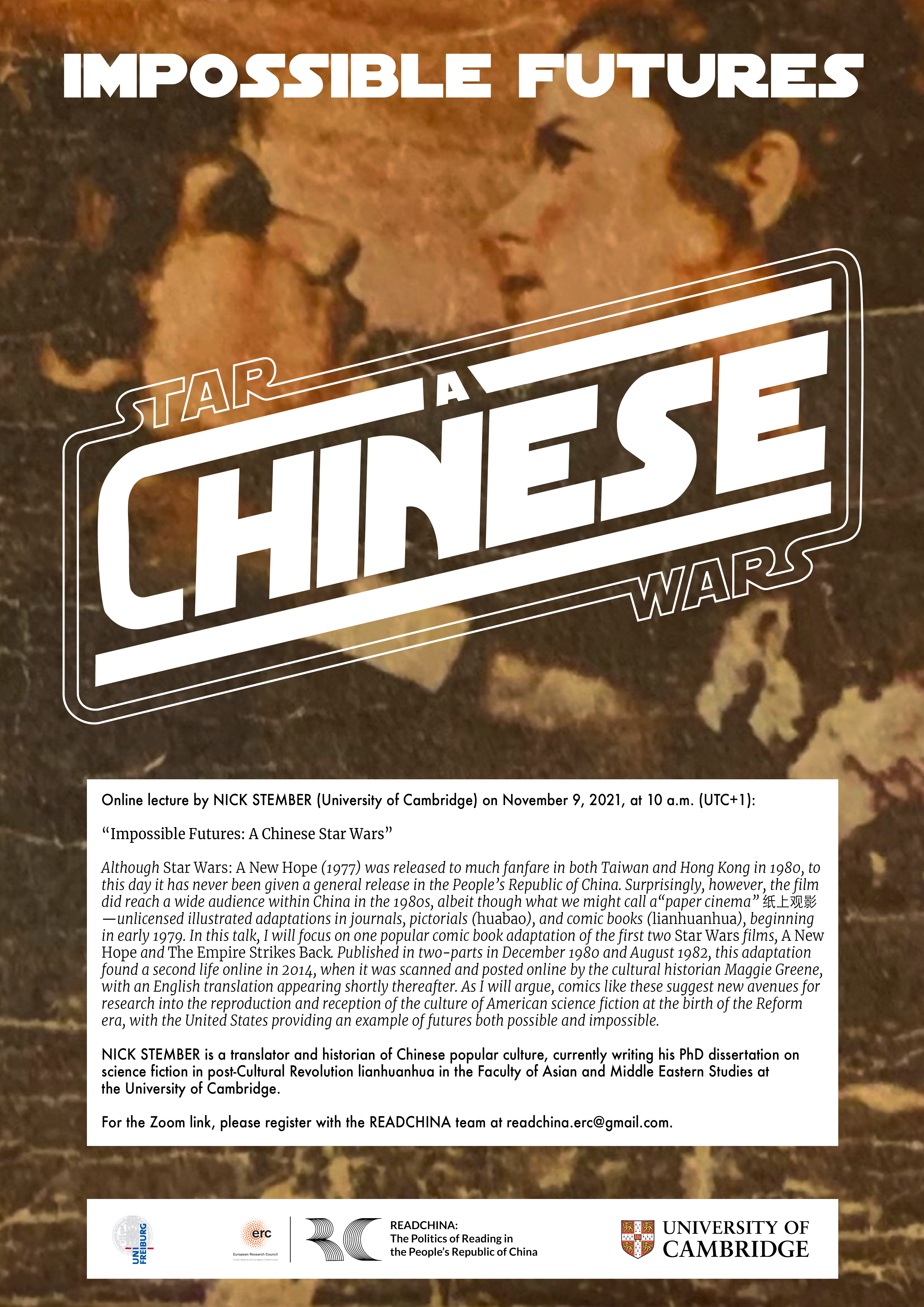
The READCHINA project is happy to invite you to an upcoming talk by Nick Stember on Tuesday 9 November 9, 2021, at 10:00 (UTC+1). The talk will be held online via Zoom; to receive a link, please register by sending an email to the READCHINA team here. The abstract of the talk follows below:
Impossible Futures: A Chinese Star Wars
Although Star Wars: A New Hope (George Lucas, 1977) was released to much fanfare in both Taiwan and Hong Kong in 1980 to this day it has never been given a general release in the People’s Republic of China. As an editorial in People’s Daily at the time explained, the film’s popularity was evidence that “the entirety of capitalist culture”整个资本主义文化 was “tottering and rotten to the core” 腐朽没落. Surprisingly, however, the film did reach a wide audience within China in the 1980s, albeit though what we might call the “paper cinema” 纸上观影—unlicensed illustrated adaptations in film journals, pictorials (huabao), and comic books (lianhuanhua), beginning in early 1979. Even more striking is the fact that many of these were published under the banner of “science popularization” 科学普及 in explicit support of Deng Xiaoping’s so-called “Four Modernizations” 四个现代化. In this talk, I will focus on one widely circulated comic book adaptation of the first two Star Wars films, A New Hope and The Empire Strikes Back. Published in two-parts in December 1980 and August 1982 by the Guangzhou branch of Science Popularization Press 科学普及出版社, this adaptation found a second life online in 2014, when it was scanned and posted online by the cultural historian Maggie Greene, with an English translation appearing shortly thereafter. As I will argue, comics like these suggest new avenues for research into the reproduction and reception of the culture of American science fiction at the birth of the Reform-era, with the United States providing an example of futures both possible and impossible.
Nick Stember is a translator and historian of Chinese popular culture, currently writing his PhD dissertation on science fiction in post-Cultural Revolution lianhuanhua in the Faculty of Asian and Middle Eastern Studies at the University of Cambridge.
Lena Henningsen's New Book Is Out Now!
2021-10-22 00:00:00 +0000
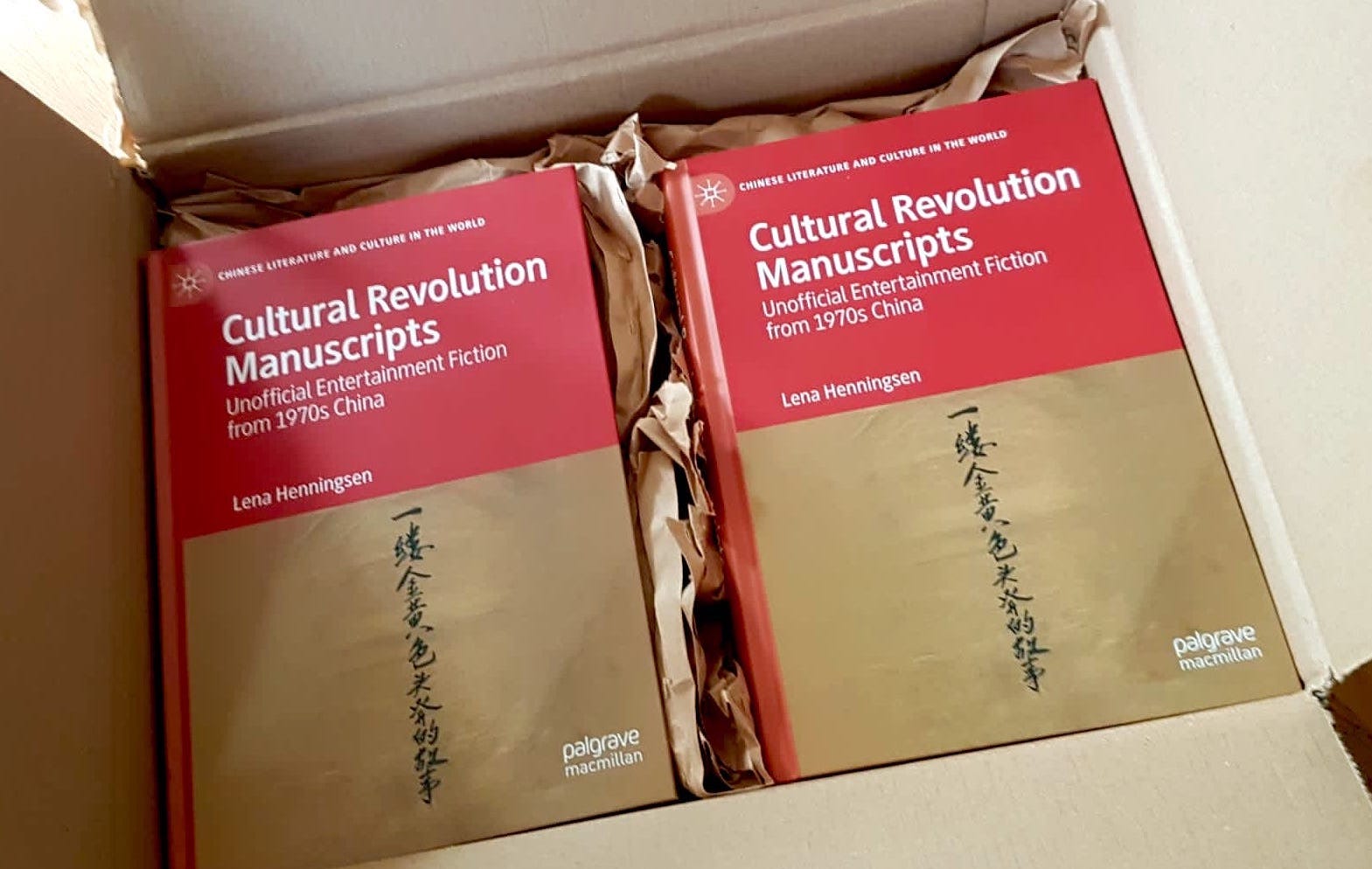
It is finally here: Lena Henningsen’s new book on unofficial entertainment fiction from the Cultural Revolution! Cultural Revolution Manuscripts: Unofficial Entertainment Fiction from 1970s China is published with Palgrave Macmillan in their series on “Chinese Literature and Culture in the World”, the abstract follows:
This book investigates handwritten entertainment fiction (shouchaoben wenxue) which circulated clandestinely during the Chinese Cultural Revolution. Lena Henningsen’s analyses of exemplary stories and their variation across different manuscript copies brings to light the creativity of these readers-turned-copyists. Through copying, readers modified the stories and became secondary authors who reflected on the realities of the Cultural Revolution. Through an enquiry into actual reading practices as mapped in autobiographical accounts and into intertextual references within the stories, the book also positions manuscript fiction within the larger reading cosmos of the long 1970s. Henningsen analyzes the production, circulation and consumption of these texts, considering continuities across the alleged divide of the end of the Mao-era and the beginning of the reform period. The book further reveals how these texts achieved fruitful afterlives as re-published bestsellers or as adaptations into comic books or movies, continuing to shape the minds of their audience and the imaginations of the past.
Moreover, chapter five—on Cultural Revolution reading acts—is available open access (Creative Commons Attribution 4.0 International License)! Start reading directly here.
The whole READCHINA team congratulates our PI on the successful publication and wishes you all a great reading experience!
Talk by Lena Henningsen on Literature and Media Control after Mao
2021-10-18 00:00:00 +0000
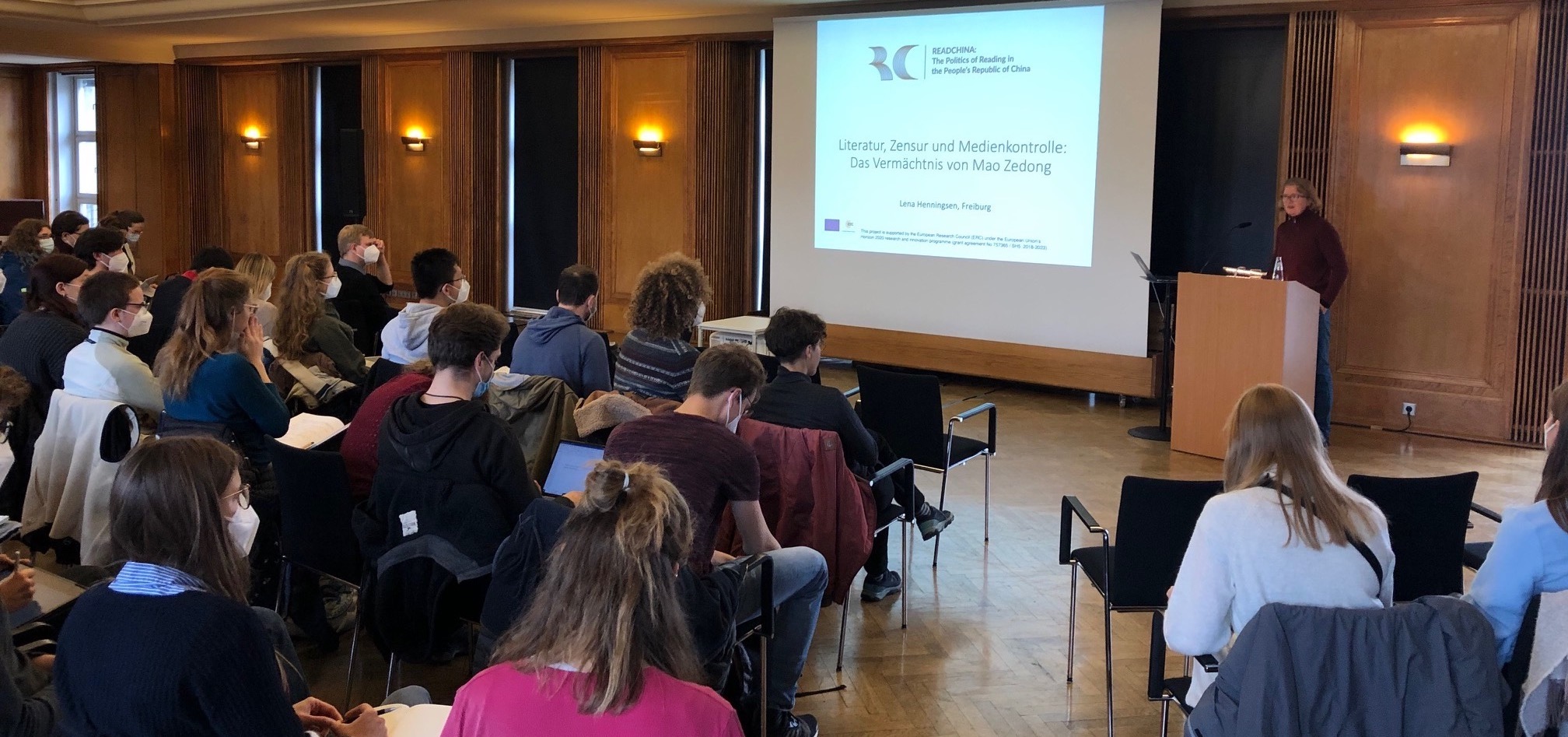
READCHINA’s Lena Henningsen gave a talk last week in Berlin on Literature, Censorship and Media Control: The Legacy of Mao Zedong at the China-Kolleg der Studienstiftung des Deutschen Volkes.
She also taught a class on national identities in China together with Julia Schneider (Cork).
Talk by Eve Y. Lin on Bookstores and the Transmedial Performance of the Contemporary Chinese Avant-Garde
2021-10-15 00:00:00 +0000
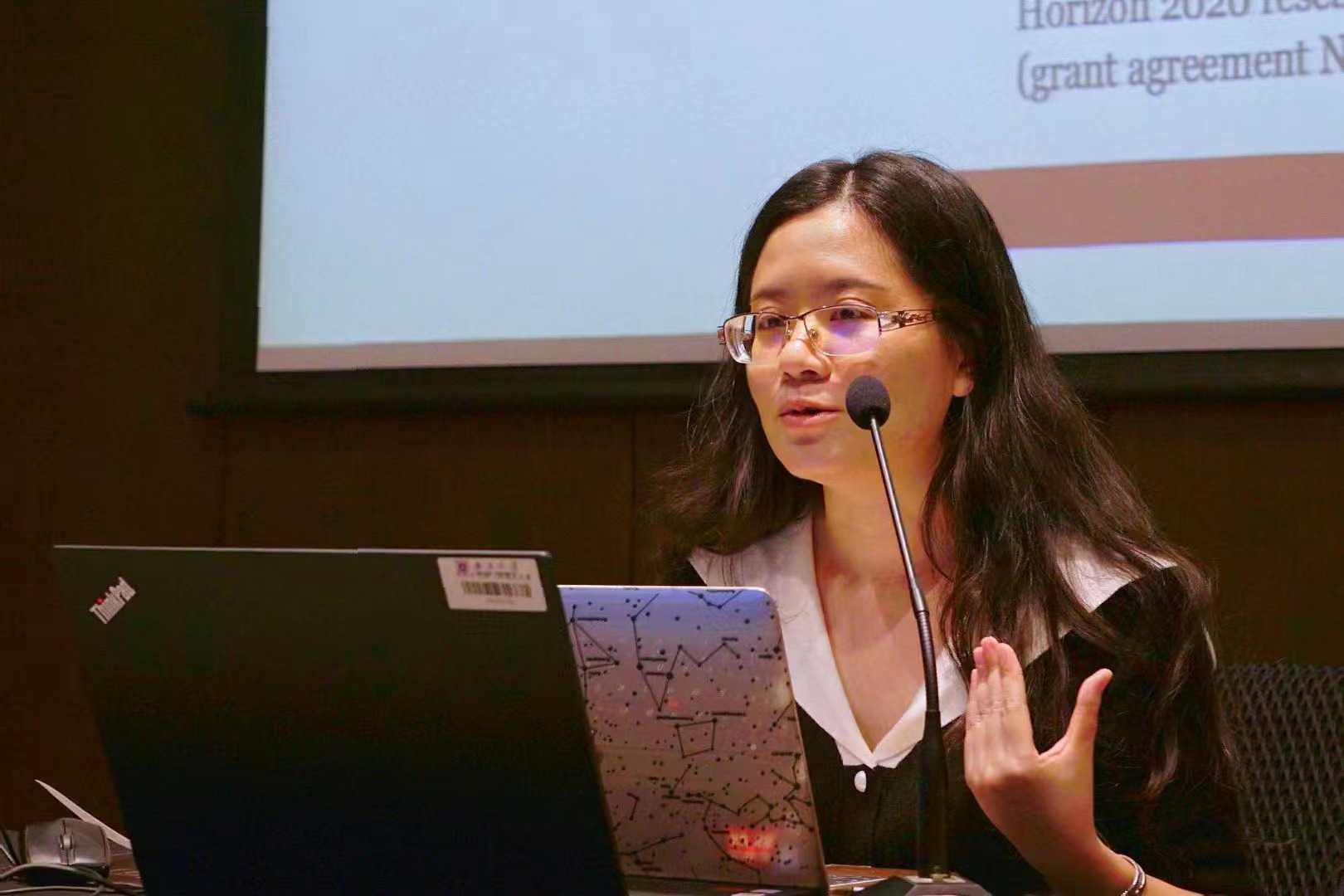
READCHINA’s Eve Y. Lin presented on October 16, 2021, her latest research based on a 5-month field trip in China (June to October 2021) as part of her ongoing dissertational project at a conference on the transmedial studies of arts held at the School of Arts, Nanjing University. Her talk was on Saturday October 16, 2021, at 17:00 (Beijing time).
The English abstract of her talk follows below:
“Avant-garde” (先锋) was developed into a highly influential cultural idea/ideal in the PRC during the 1980s. However, recognized as a buzzword for the 1980s Chinese society and regarded as representative of the High Culture legacy left by that dacade, the nature and the cultural knowledge of the Chinese avant-garde remain rather chameleonic and vague. As China’s social life marches to an ever-broader extend of consumerism since the 1990s, the nature of “avant-garde” has undergone even more radical mutations and become more ambiguous. This talk traces how the concept of “avant-garde” mutated over the years in the Chinese society since the 1990s by looking into the development of Contemporary China’s private-run bookstores. Maintaining that the bookstore provides simultaneously sensory and symbolic sites in which cultural knowledge is constructed, staged, perfomed, and constantly reconstructed, this paper analyzes the changing contents of the Chinese avant-garde that are inscribed in and performed through the textual, spatial, and material media provided by various bookstores over different periods of time. Furthermore, the changing natures of the avant-garde revealed by the bookstores indicate an intertwined state between the 1980’s high culture legacy and contemporary China’s consumer.
Duncan Paterson's Talk at 41st Annual EASL 2021 Conference
2021-09-08 00:00:00 +0000
FAIR Data Principles and Global Accessibility: A Case Study

Matthias Arnold, Duncan Paterson and Jia Xie presented the results of their research into practical implications of FAIR data principles in PRC research data platforms at the 41st Annual Conference of the European Association of Sinological Librarians.
From the abstract:
It is tempting to assume that FAIR data principles effectively apply globally. In practice, digital research platforms play a central role in ensuring the applicability of these principles to EU – PRC research exchanges. For this article we conduct a systematic literature review of research into Chinese Republican newspapers as it appears in popular research data catalogues. We experimentally compare the results of repeated search runs using different interfaces and with different points of origin. We then analyze our results regarding the practical and technical accessibility conditions. Concluding with an analysis of conceptual mismatches surrounding the classification of items as “full-text“, and of a case of total data loss that is nevertheless symptomatic of the limited degree of data re-usability. Our results show the structural challenges preventing Findability, Accessibility, Interoperability, and Re-usability to be put into practice.
Call for Papers for Writing Chinese: A Journal of Contemporary Sinophone Literature
2021-07-27 00:00:00 +0000

READCHINA’s Principal Investigator Lena Henningsen is on the editorial board of a new open-access double-blind peer reviewed academic journal titled ‘Writing Chinese: A Journal of Contemporary Sinophone Literature’ – and the call for papers for its first issue has just been announced!
We are delighted to share the first Call for Papers from Writing Chinese: A Journal of Contemporary Sinophone Literature (WCJ). This new journal, published by White Rose University Press, showcases the latest peer-reviewed academic research on contemporary Chinese-language literature and its translation and global reception, alongside features on practitioners. WCJ’s combination of academic articles and practice-based notes provides a platform for, and facilitates dialogue between, both primary and secondary actors in the field. A key objective of the journal is to engage directly with scholarship in East Asia and throughout the Sinosphere, and so one section in each issue will feature newly commissioned English translations of the latest Chinese-language research.
Consult the journal’s website for all details about the CfP and the submission guidelines. Expressions of interest should be addressed, in the first instance, to the Editors at writingchinese@leeds.ac.uk, as should any general enquiries about the journal.
READCHINA Book Series with Amsterdam University Press
2021-07-05 00:00:00 +0000
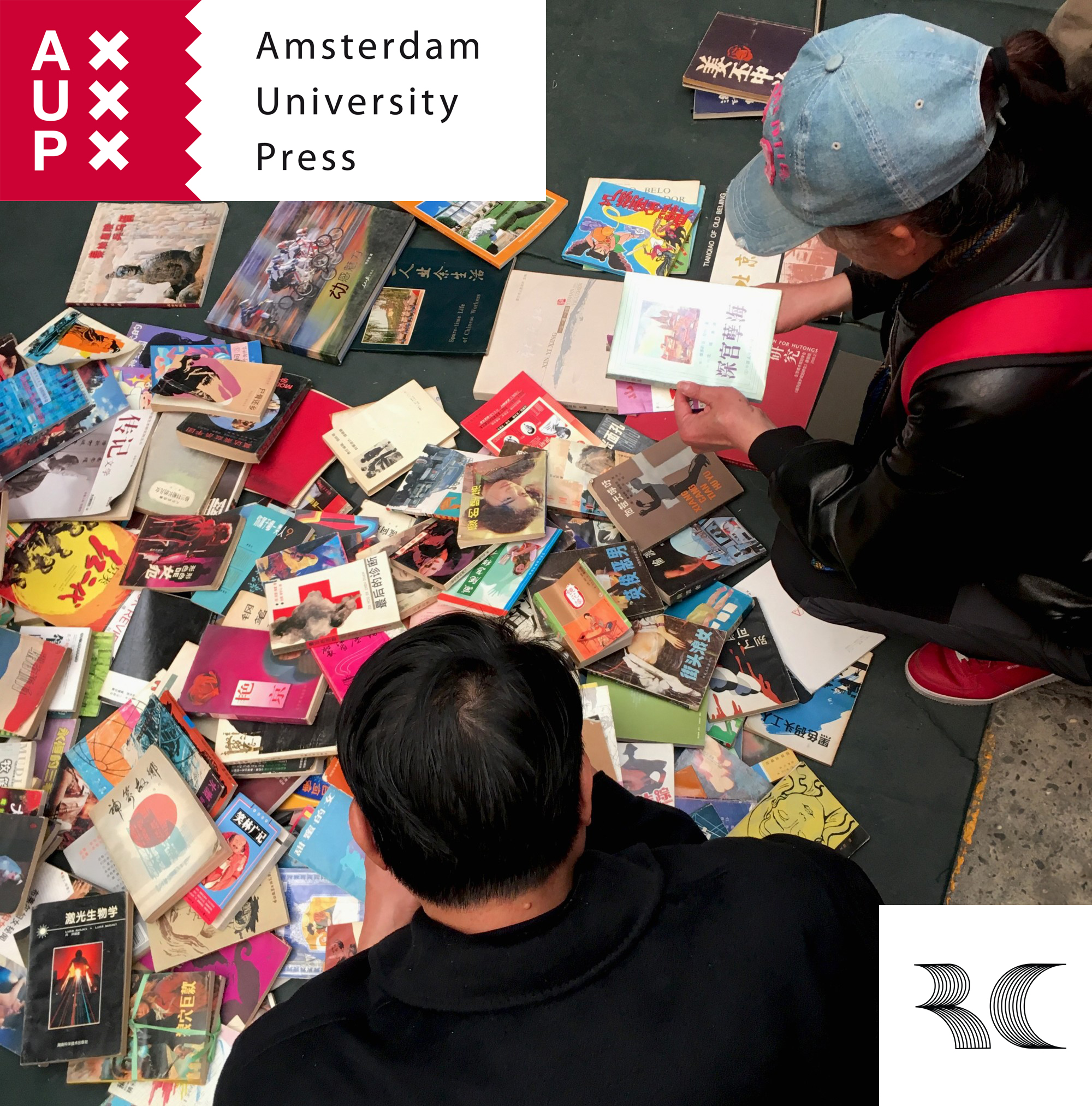
The READCHINA team is proud to announce the launching of a new book series with Amsterdam University Press, entitled Practices and Politics of Reading in China! The geographical scope features China in its transcultural dimensions, i.e., including Taiwan, Hongkong, Macao, and Sinophone regions in East and Southeast Asia. Timewise, potential publications range from late Imperial China to the present.
This book series focuses on practices and politics of reading in China. It researches the social conditions under which texts were and are read, what influence these texts and the respective contexts had and have on the lives of individuals, on social, political, intellectual and literary change in China, and on the modes of production, distribution and consumption of political messages, of literature and culture. Reading, here, is not “just” the content of the proposed interdisciplinary studies. Rather, reading functions as a methodological approach to Chinese society, politics, economics, intellectual life, literature and culture, including its global dimensions. Reading is understood broadly as the interaction with and reception of texts, including scriptural, visual and acoustic texts. Therefore, the book series offers studies – and invites submissions – which investigate the conditions, practices and impacts of reading in China with an emphasis on ordinary readers. Methodologically, thus, the series offers new perspectives: away from the established focus on authors or the political context and to the impact of texts or institutional matters on readers and audiences. We are welcoming both independent monographs and edited volumes.
The members of the editorial board are:
- Timothy Cheek, University of British Columbia, Canada
- Robert J. Culp, Bard College, USA
- Lena Henningsen, University of Freiburg, Germany
- Paola Iovene, University of Chicago, USA
- María Angélica Thumala Olave, University of Edinburgh, UK
- Nicolai Volland, Penn State University, USA
For more information, please see the series’ webpage here or download the flyer – and to submit a proposal, please see the guidelines here. In case of questions about the series, feel free to write to Lena Henningsen, and with questions about the press please contact the commissioning editor Irene van Rossum.
Talk by Julia Schneider on Book Inquisition under the Qing
2021-06-07 00:00:00 +0000

The READCHINA project is happy to invite you to an upcoming talk by Dr. Julia Schneider on Monday 14 June, at 14:00 (German time). The talk will be held online via Zoom; to receive a link, please register by sending an email to Lena Henningsen. The abstract of the talk follows below:
Imperial Censorship of a Racist Discourse? The Qianlong Inquisition of Ming Books
Did the Qianlong Emperor of the Manchu Qing Dynasty issue an anti-racist campaign when he forbade Chinese books that discredited non-Chinese others? I answer these questions by analysing passages and terms that made Qing officials collect books for censorship in the Qianlong Emperor’s large-scale literary inquisition project (1772–1788).Usually regarded as the ‘evil twin’ of his gigantic book collecting project, the Sikuquanshu 四庫全書 (“Complete Library in Four Branches”), this was a project to censor Chinese books, particularly books from Ming times. Among other criteria, censors were liable to forbid books that contained partial descriptions of the Jurchen (the Manchus’ ancestors), Liaodong (the region of Manchu origin), non-Chinese peoples at the Northwestern borders (Tatars and Oirats), and the most recent non-Chinese dynasties (Khitan Liao, Jurchen Jin, and Mongol Yuan).From an analysis of books that were censored for the above-mentioned reasons we can learn if the Qianlong Emperor––as a Manchu emperor and thus belonging to a people with an identity that made them a ‘minority’ if compared to the largest constituency among their subject peoples, the Chinese––in fact attempted to break open a hegemonic Chinese discourse on others or ‘barbarians’ that he perceived not only as harmful, but also as discriminating and othering.
Dr. Julia C. Schneider is lecturer for Chinese history at the Department of Asian Studies at UCC. Before that, she was assistant professor at the Department of East Asian Studies at the University of Göttingen. Julia holds a Dr. phil./PhD in Oriental Languages and Cultures from the Universities of Göttingen and Ghent (2013), and an MA in Classical Sinology from Heidelberg University. Her book Nation and Ethnicity (Brill 2017) won the Foundation Council Award of the University of Göttingen. Julia has published articles and chapters on Chinese conceptual historiography (ethnicity, nationalism, colonialism), on non-Chinese ethnicities, and on Jurchen and Manchu studies in journals and books.
Talk by Lena Henningsen on Canonization of Improvised Music in China
2021-06-07 00:00:00 +0000
READCHINA’s Principal Investigator, JunProf. Dr. Lena Henningsen, will deliver a digital talk at Heidelberg University as part of a seminar on Music in China—A Transcultural Affair: The Question of Authenticity tomorrow, Tuesday 8 June, at 14:45 (German time). The talk will be held online via Zoom, to receive a link, please register by sending an email to Prof. Barbara Mittler. The abstract of the talk follows below:
Street Music’s Long March into the Concert Hall – On the Canonization of Improvised Music in Twentieth Century China and Resonances of Traditional Musical Practices
As part of the enquiry into musical authenticity proposed by this seminar, I will approach the music of the blind street musician Abing (Hua Yanjun 华彦钧, ca. 1893-1950). Shortly before his untimely death, six of his performances (three for erhu and pipa each) were recorded by two ethnomusicologists – which started these pieces journey into the repertoire in performing and teaching Chinese music. The changing reception of Abing as a person, and the changes in the performing styles of his music demonstrate how his music was incorporated into the musical field of the PRC which was itself transforming along with the changes in the larger political field. This canonization preserved Abing’s music as well as it transformed it into pieces compatible with Western symphonic orchestras. This musical transformation may serve to rethink authenticity, also along a transcultural axis: If the transmission of music is not (primarily) based on sheet music, as in the practices from which Abing set off, then change is inscribed into each transmission. In fact, changes to the music are what literally keeps it alive – and which may seem, at first glance, incompatible with the sheet music based Western tradition. However, East-Western musical encounters as they can be observed in the performances of Abing’s music are more than just the confluence of sounds from different parts of the world. Rather, such encounters are shaped by a complex set of musical practices, personal experiences, by institutional and technological change all of which form a complicated web of interactions the end product of which can no longer be identified as either Eastern or Western but transcultural. Likely, this confluence of factors which results in constantly changing musical performances, is what renders this musical practice authentic.
Recording of talk by Lena Henningsen on Reading in the Cultural Revolution (in German)
2021-05-26 00:00:00 +0000
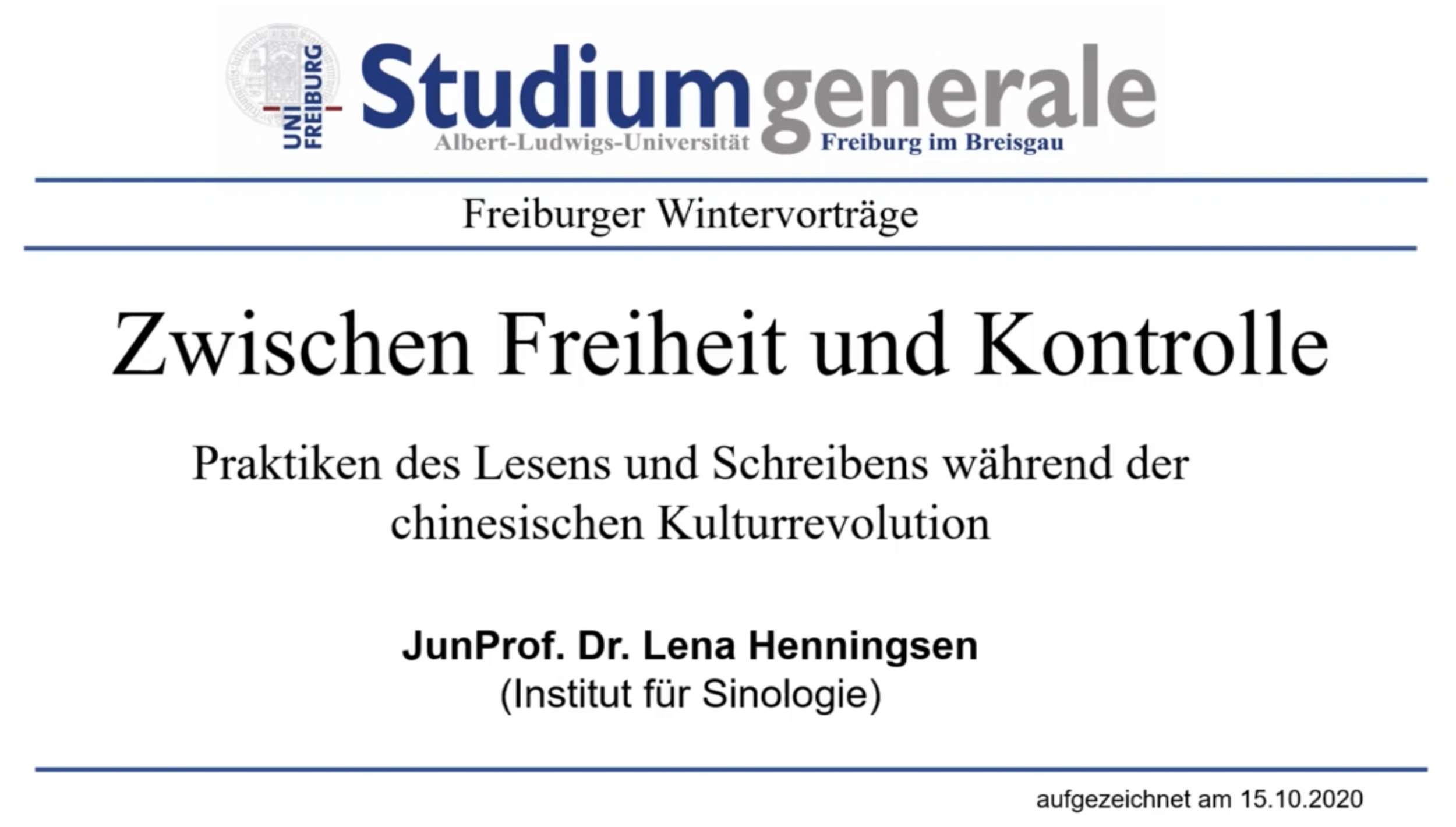
READCHINA’s Principal Investigator, JunProf. Dr. Lena Henningsen held a lecture on 15.10.2020 as part of the Studium Generale lecture series at the University of Freiburg. The lecture with the title “Zwischen Freiheit und Kontrolle: Praktiken des Lesens und Schreibens während der chinesischen Kulturrevolution” has been recorded and you can now view it here.
Abstract: Die chinesische Kulturrevolution (1966-1976) gilt nicht zu Unrecht als eine Epoche massiver Gewaltausübung und Medien- und Literaturkontrolle. In meinem Vortrag werde ich den Blick auf tatsächliche Praktiken des Lesens und Schreibens lenken: Neben den Werken von Mao Zedong erfreute sich insbesondere Le Comte de Monte-Cristo von Alexandre Dumas einer großen Leserschaft. Als inspirierend beschreiben Zeitzeugen Texte wie Jack Kerouacs On the Road oder William Shirers The Rise and Fall of the Third Reich – beides Bücher, die eigentlich verboten waren und nur als interne Publikationen den Kadern der Kommunistischen Partei zur Verfügung standen. Und während das offizielle Publikationswesen weitgehend zum Erliegen gekommen war, florierte in ausgewählten Zirkeln das literarische Leben in Form von literarischen Salons. Unterhaltende Novellen und Romane zirkulierten als handschriftliche Manuskripte im ganzen Land. Kriminal-, Spionage- und auch Liebesgeschichten, die mit den literarischen Normen der Zeit nicht übereinstimmten, wurden von (meist) anonymen Autoren verfasst und von anderen gelesen und abgeschrieben. Dadurch wurden die auf fragilem Papier niedergeschriebenen Geschichten erhalten und sie konnten weit zirkulieren – dadurch veränderten sich die Geschichten aber auch, da die Kopisten kreative Eingriffe in die Texte vornahmen. Die Kulturrevolution, so zeigt sich, ist damit keinesfalls eine monolithische Epoche. Grassroots-Praktiken verweisen auf die Vielzahl von Erlebnishorizonten und Deutungsmustern und auf den kreativen Umgang mit der von oben verordneten Kontrolle und Zensur: Leser und Autoren in China strebten nach literarischer und intellektueller Vielfalt – auch unter Gefahr für Leib und Leben. Damit bereiteten sie einer Vielzahl von literarischen und intellektuellen Entwicklungen den Boden, die allgemein der Zeit nach dem Ende der Kulturrevolution zugerechnet werden.
DVCS 2021: The Annual Conference of the German Association of Chinese Studies this Year in Freiburg!
2021-05-11 00:00:00 +0000
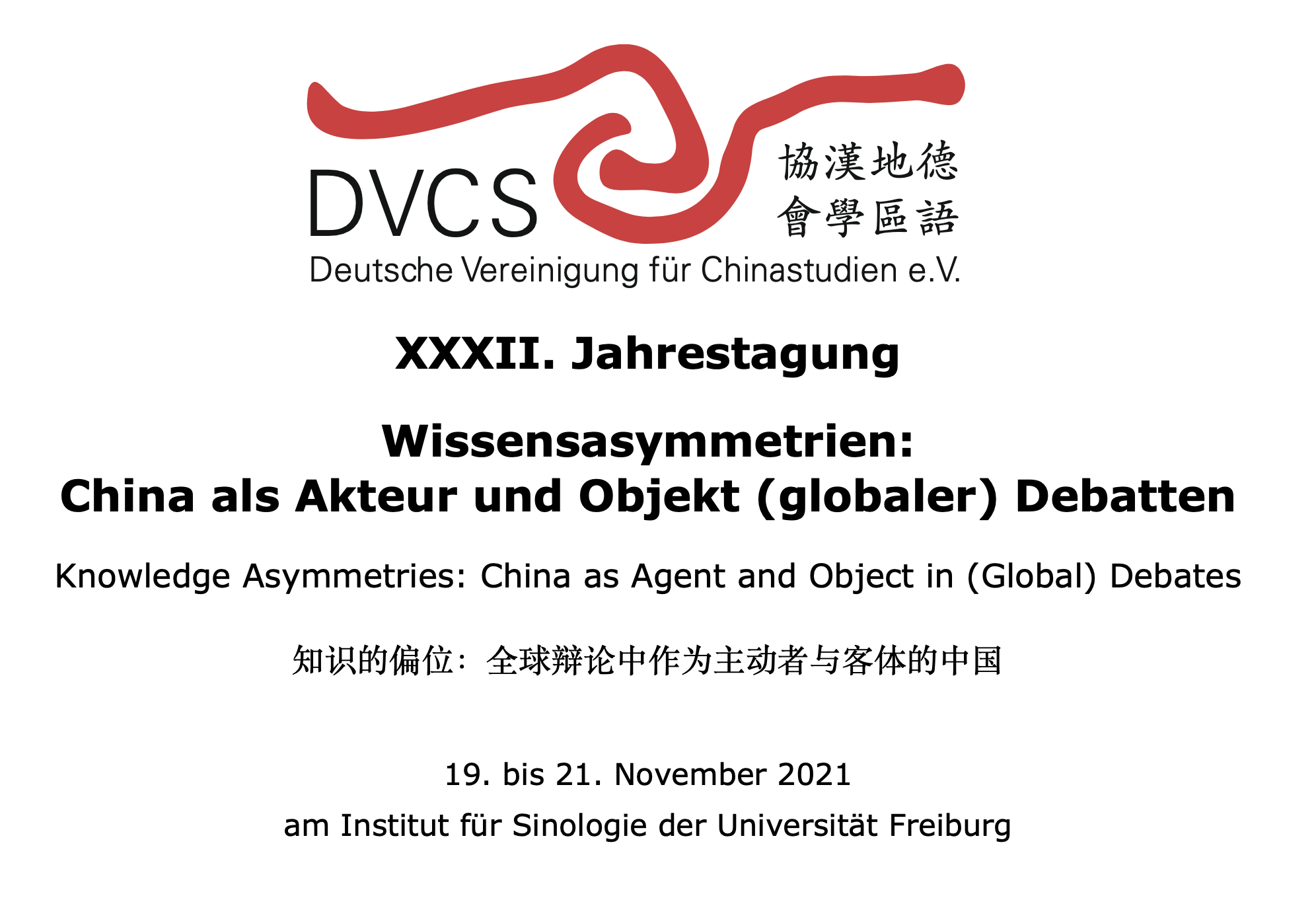
The READCHINA team is cordially inviting you to send in abstracts of contributions for this year’s annual conference of the German Association of Chinese Studies (DVCS) which will be held in person in Freiburg from 19-21 November!
The theme of the conference is: WISSENSASYMMETRIEN:CHINA ALS AKTEUR UND OBJEKT (GLOBALER) DEBATTEN (English: Knowledge Asymmetries: China as Agent and Object in (Global) Debates; Chinese: 知识的偏位:全球辩论中作为主动者与客体的中国). Contributions in English are warmly welcomed!
The conference is organized by JunProf. Dr. Lena Henningsen, Prof. Dr. Daniel Leese and Damian Mandzunowski and will take place at the Institute of Chinese Studies at the University of Freiburg.
For the full Call for Papers as well as all other relevant details, see the designated conference website https://dvcs2021.github.io — and send in the abstracts until 15 July 2021 to DVCS2021@sinologie.uni-freiburg.de.
Live Now: Our Online Publication Series
2021-05-06 00:00:00 +0000
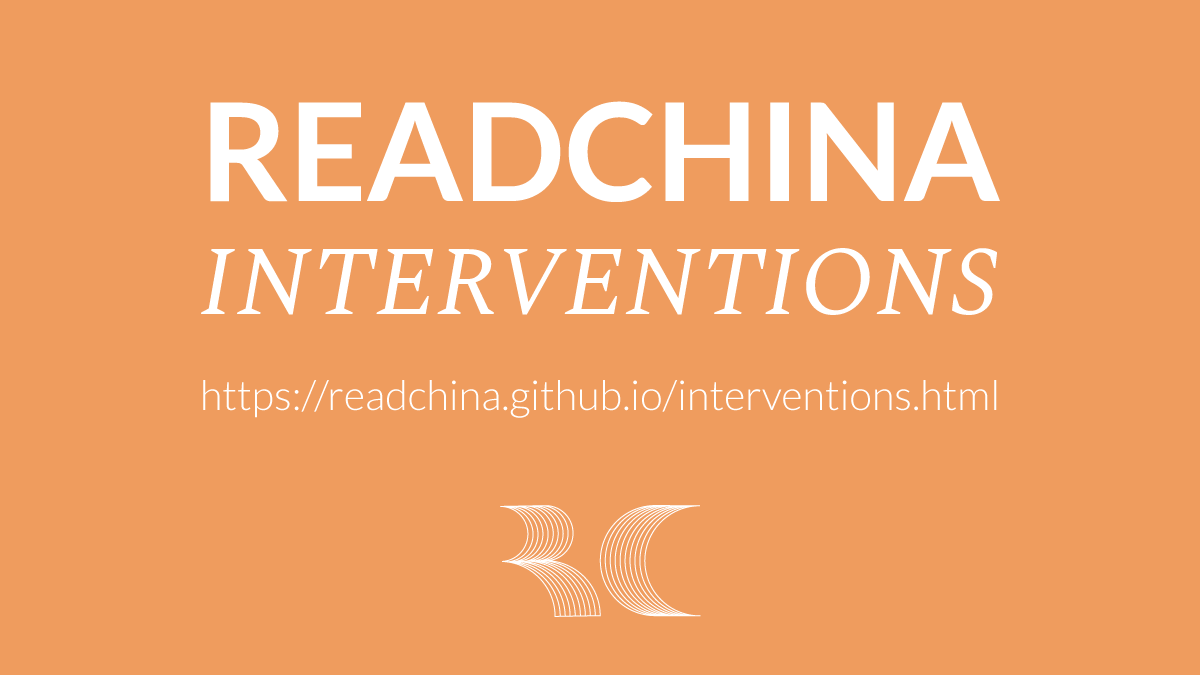
The READCHINA team is excited to announce the start of our online publication series: the READCHINA Interventions! In this new section, we will publish brief pieces with core insights gained from our project(s) and ongoing deliberations by individual researchers about relevant concepts. We are expanding these thoughts in our previous and forthcoming publications too. Our intention in writing the READCHINA Interventions is to spark conversation and provoke thoughts, so we hope you enjoy reading them – and feel free to reach out to us with comments afterward!
Our first two Interventions are out now too. The READCHINA Intervention 01, written by our PI JunProf. Dr. Lena Henningsen, deals with the core question “What is a Reading Act?” In a word, the concept emphasizes the event-like nature of reading by focusing on the readers and the contexts under which readings take place – but to get the whole picture, click here.
The READCHINA Intervention 02, coauthored by Damian Mandzunowski and Lena Henningsen, is slightly more provocative. In asking “Why Poach When You Can Wander?” it deals with the impactful yet (from today’s viewpoint) somewhat problematic metaphor of reading-as-poaching proposed by Michel de Certeau. However, rather than discard is as a whole, we seek and explore a range of alternative ideas and metaphors both found in de Certeau’s writings and proposed by us. Head here to read what we ended up with!
Guest Lecture by Dr. Mareike Ohlberg on Academic Freedom
2021-05-03 00:00:00 +0000
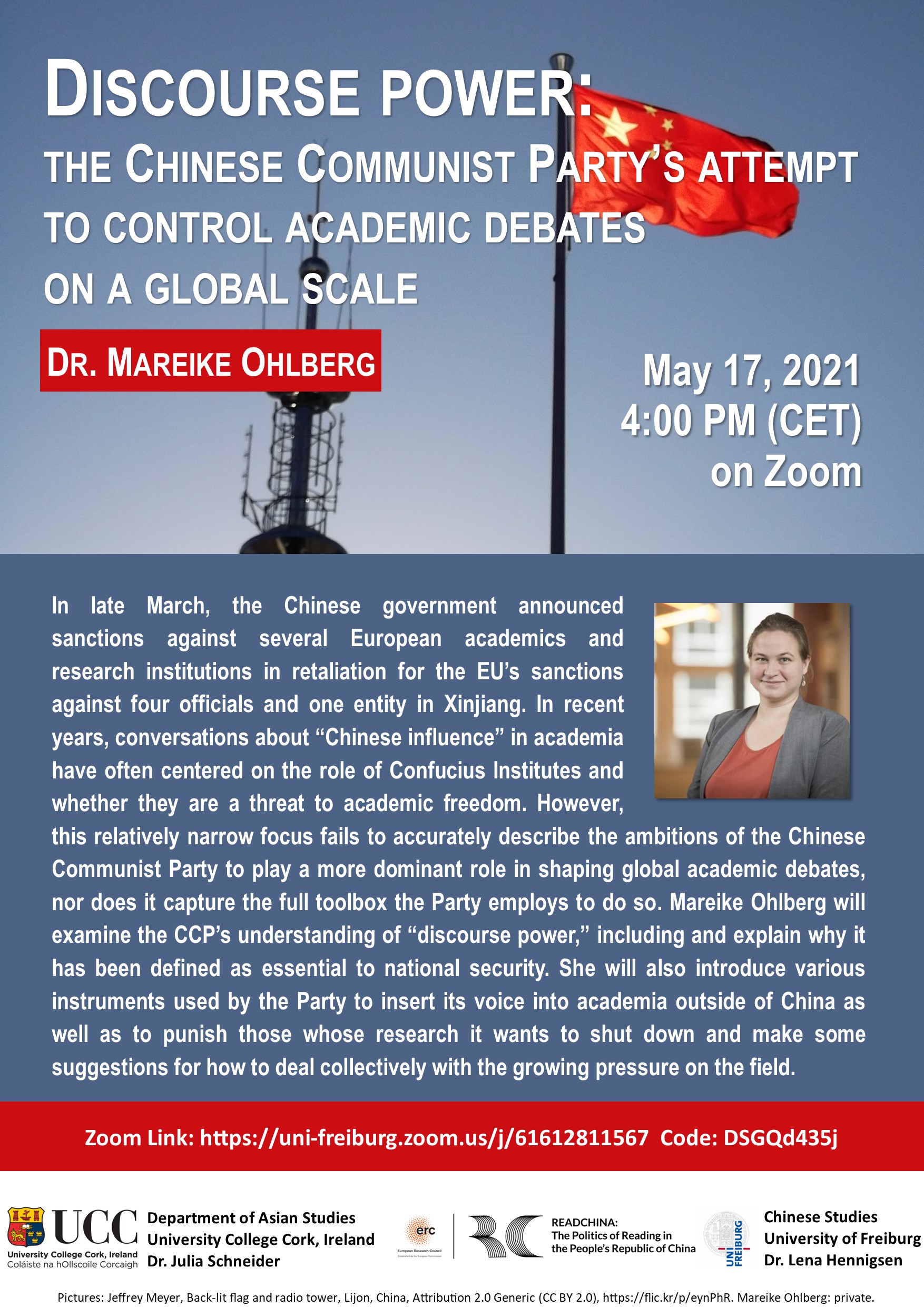
We are pleased to invite you to a guest lecture on on May 17, 2021, at 4pm (Freiburg time) by Dr. Mareike Ohlberg (Senior Fellow, Asia Program at the German Marshall Fund) titled Discourse Power: The Chinese Communist Party’s Attempt to Control Academic Debates on a Global Scale. The lecture is jointly organized by the READCHINA project and the Department of Asian Studies University College Cork, Ireland.
Join the talk via Zoom here with passcode DSGQd435j
Abstract: In late March, the Chinese government announced sanctions against several European academics and research institutions in retaliation for the EU’s sanctions against four officials and one entity in Xinjiang. In recent years, conversations about “Chinese influence” in academia have often centered on the role of Confucius Institutes and whether they are a threat to academic freedom. However, this relatively narrow focus fails to accurately describe the ambitions of the Chinese Communist Party to play a more dominant role in shaping global academic debates, nor does it capture the full toolbox the Party employs to do so. Mareike Ohlberg will examine the CCP’s understanding of “discourse power,” including and explain why it has been defined as essential to national security. She will also introduce various instruments used by the Party to insert its voice into academia outside of China as well as to punish those whose research it wants to shut down and make some suggestions for how to deal collectively with the growing pressure on the field.
Talk by Lena Henningsen on Chinese Harry Potter Fakes
2021-04-29 00:00:00 +0000

We are pleased to announce that READCHINA’s Principal Investigator, JunProf. Dr. Lena Henningsen will hold a lecture during the “Understanding Authenticity in China’s Cultural Heritage” series at the University of Oxford on May 4, 2021, at 3pm (German time). The talks are held online via Zoom. To receive a link, please register here .
The lecture will be part of a double-feature talk on “Chinese Harry Potter Forgeries” alongside Dr Christopher J. Foster. The Harry Potter series has enchanted audiences all around the globe. The immense success of Harry Potter has inspired all sorts of parodies, fan fiction, and even outright forgeries. In this double-feature talk, Dr Christopher J. Foster introduces his collection of Chinese Harry Potter “forgeries”. He discusses how and why he sought out these works, and surveys the great lengths that forgers sometimes went to pass off their products as part of J.K. Rowling’s canon. Not all forgeries are alike, and Chris demonstrates the great range of deceptions that can take place, from pirated printings and unofficial translations, to misappropriated fanfiction, plagiarism of other fantasy series, or outright made-up stories. JunProf. Dr. Lena Henningsen Harry Potter and the China Doll, Harry Potter and Baozoulong, and Harry Potter and the Chinese Foreign Exchange Student at Hogwarts, Lena explicates the meaning of “fake” and its relation to fan culture in specific.
Talk by Damian Mandzunowski on Iconography of Caricatures of Jiang Qing on 21 April at 4 pm
2021-04-19 00:00:00 +0000
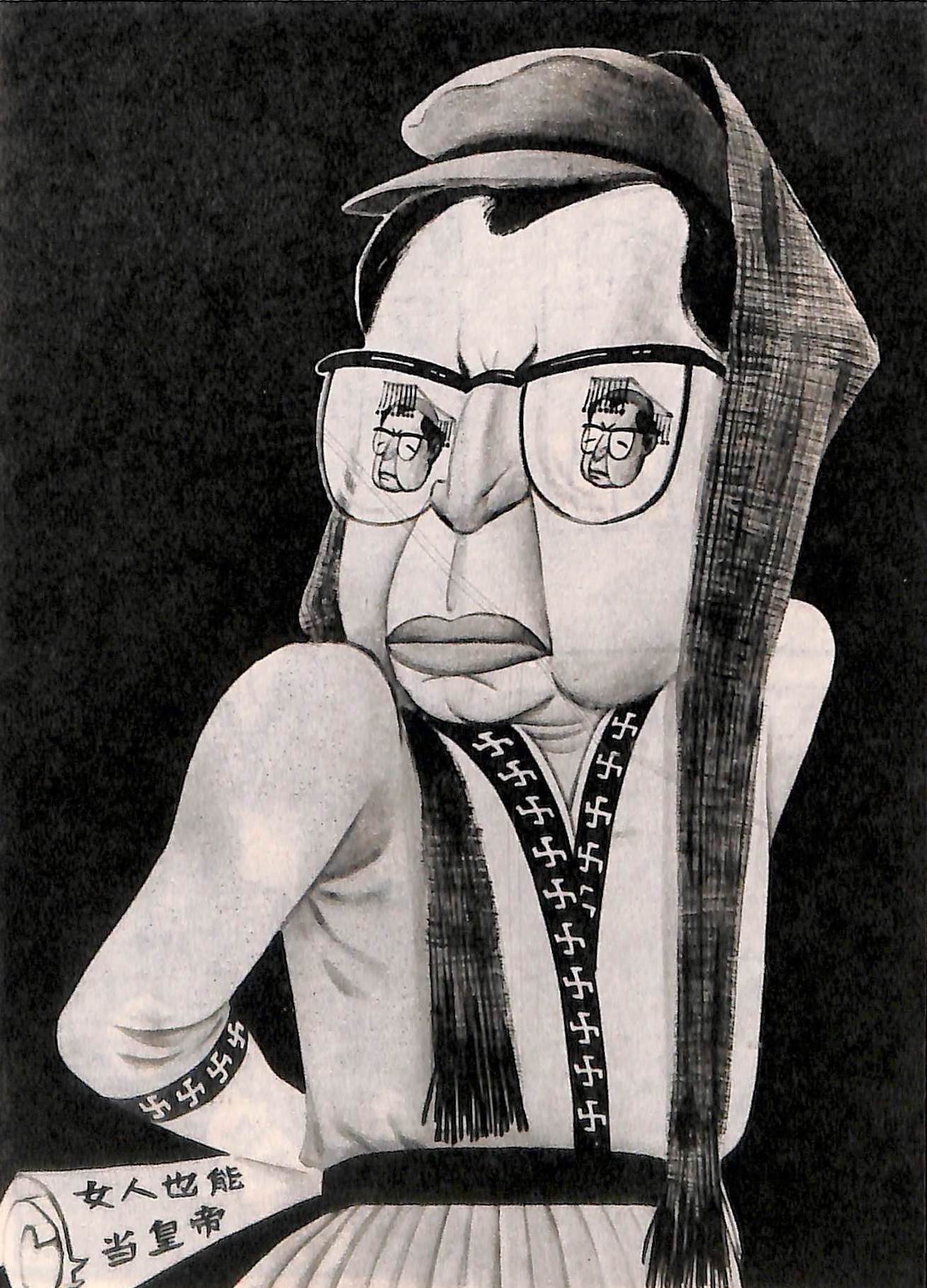
READCHINA’s Damian Mandzunowski will present on 21 April at 4 pm during the international lecture series “Jiang Qing’s Last Revolution: Exploring Alternative Understandings of China’s Past” organized by Silvia Salino at the Department of East Asian Studies at the University of Vienna.
This talk will shed light on visual traces of Jiang Qing in the historical and cultural records that are caricatures created during the campaign to expose, criticize and investigate the Gang of Four in 1976-78. For a few years before and during the radical phase of the Cultural Revolution—roughly from the mid-1960s to the early-1970s—Jiang Qing was widely present: her persona graced propaganda posters and photographs, the model works created under her supervision were staged nationwide and their filmed versions shown in cinemas, and her writings on art and literature were popularized alongside her recommendations for revolutionary attire. Then, in fall 1976, she was gone. Arrested alongside three other former top party leaders and collectively branded a Gang of Four (also known as the “counter-revolutionary Jiang Qing clique”), all new visual depictions of her were banned and the already-existing ones hidden, edited and pulped. Yet, already in early winter of the same year, Jiang Qing was back on countless posters plastered on walls and on signs held up high during mass-manifestations. This time, however, the depictions were far from glamorizing. This talk will showcase some of the most prevailing visual tropes present in the images as well as discuss their larger social-historical meanings. The talk will also exemplify how the visual language of the caricatures was not only closely related to ongoing political transformations of the period, but also intrinsically gendered. In addition, given that Jiang Qing remains a vivid element in Chinese (and global) pop-cultural collective memory, the talk will then investigate how this iconography was (and still is) re-used and re-constructed long after the defamation campaign ended.
To join the talk on 21 April at 4 pm via zoom, press here.
Talk by Lena Henningsen and Duncan Paterson on Manuscript Culture during the Cultural Revolution
2021-04-13 00:00:00 +0000
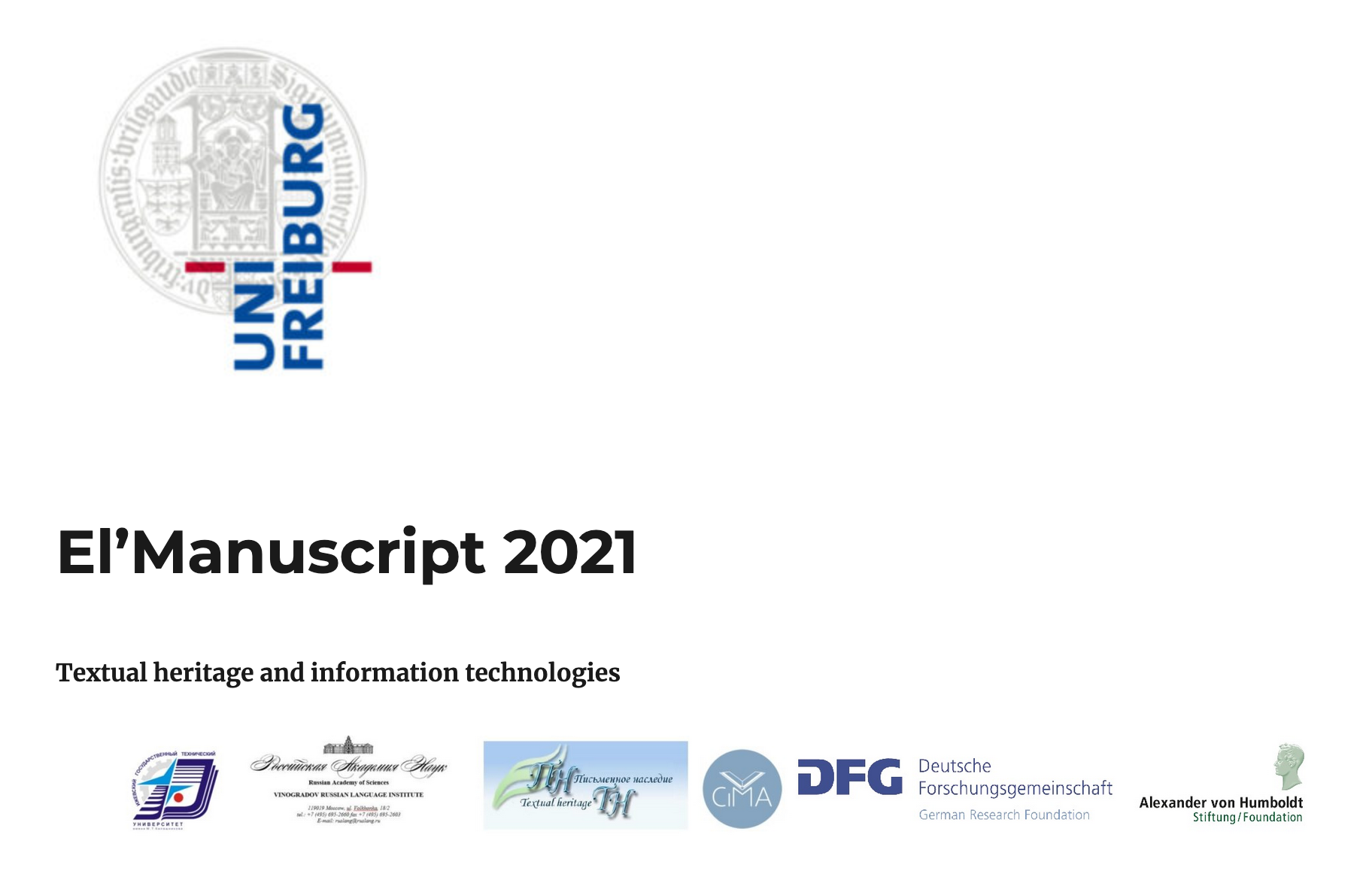
READCHINA’s Principal Investigator JunProf. Dr. Lena Henningsen and READCHINA’s Data Manager Duncan Paterson will jointly present a paper titled “Manuscript Culture During the Cultural Revolution” during the conference El’Manuscript 2021: Textual Heritage and Information Technologies at the University of Freiburg on 14 April 2021 at 10 am. Read more about the conference here
Abstract
The conceptual tools of manuscript studies are rooted in the study of medieval European objects. The circulation of hastily and clandestinely produced manuscripts of entertainment fiction (手抄本 shouchaoben) shaped the transmission of literature in the PRC. Moreover, the materiality of these sources, including the conditions of their production, circulation and consumption significantly impacted on the process in which the texts were (re-)created, often reflecting the scribes experiences during the Cultural Revolution. Presenting the story through diverging witnesses, illuminates the creative rewriting that occurred as the texts circulated. Our editions make these works available to researchers interested in the textual heritage of PRC literature. Using the relatively short Three Times to Nanjing as a case study, we present our editorial pipeline for processing and publishing tei-xml editions of CJK manuscripts. This allow us to critically explore points of tension between East-Asian codicological conventions and exiting standards. We include a discussion of our code contributions to exist-db, and the TEI Guidelines targeting editors of non-Latin source languages.
Digital Lecture Series on the Centenary of the CCP Co-Organized by READCHINA
2021-04-12 00:00:00 +0000
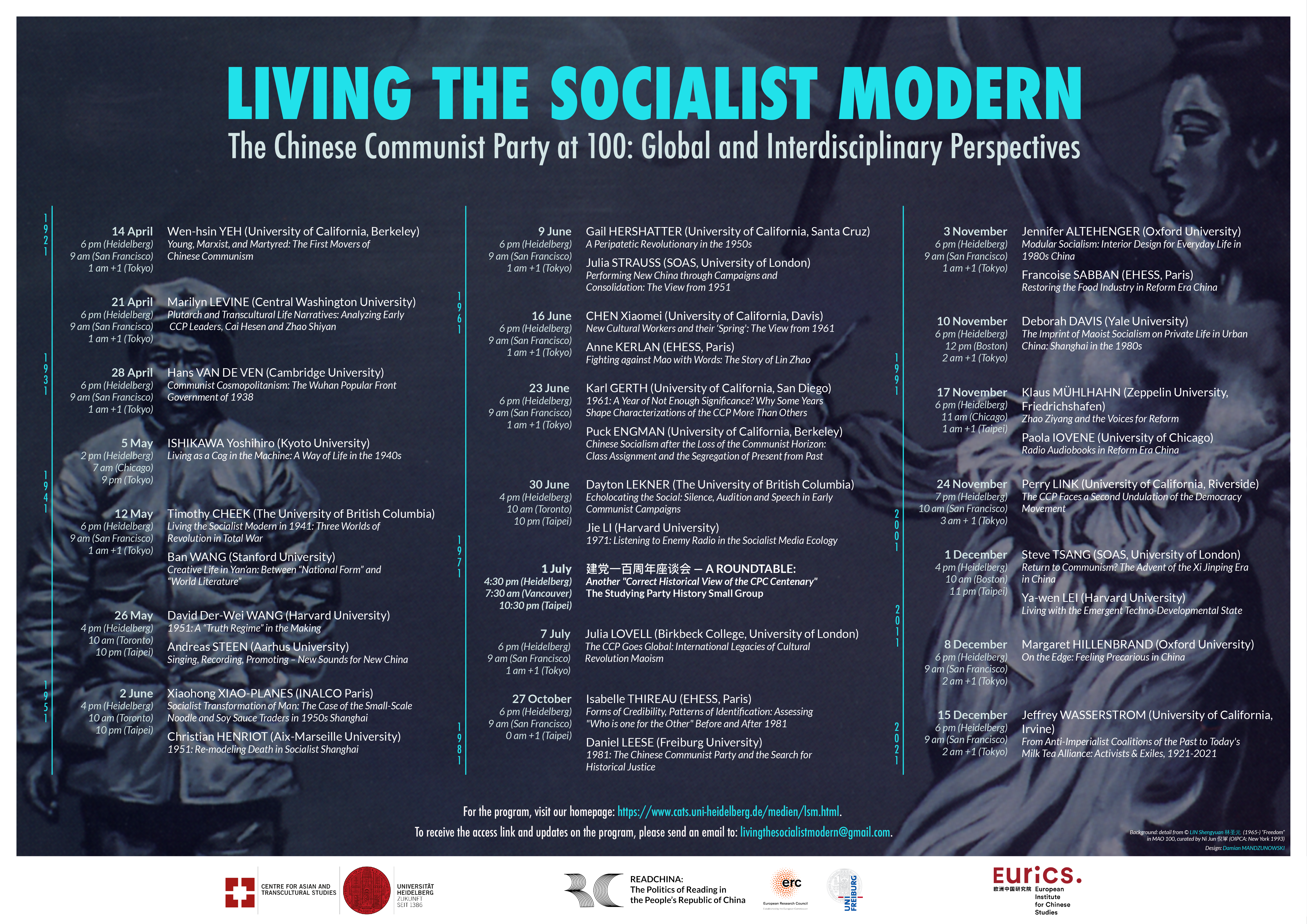
2021 marks the 100th anniversary of the founding of the Chinese Communist Party. What did it mean to “live with the Specter”, to experience what one might call the making of the “Socialist Modern” that found a first point of culmination with the foundation of the CCP in 1921?
We are cordially inviting you to the digital lecture series Living the Socialist Modern: The Chinese Communist Party at 100—Global and Interdisciplinary Perspectives organized by the Center for Asian and Transcultural Studies (CATS) in Heidelberg, in cooperation with the ERC-funded research project READCHINA: The Politics of Reading in the People’s Republic of China in Freiburg and the European Institute for Chinese Studies (EURICS) in Paris.
In this digital lecture series we suggest unpacking the impact of this event on lives on the ground in a long century of Chinese and global history. Deliberately designed to offer alternative “histories” of the Chinese Communist Party, we will attempt to offer interdisciplinary views and experiences of the “Socialist Modern” and its many variants in a century now past, but also in the present and in the future, probing into different positions not only from Political Science and Party History, but also from Everyday History, Anthropology and Cultural Studies, Literary Studies and Sociology, Art History, and more. Each lecture will focus on a specific time slot, marked by ten-year steps in the century of history that we are looking back to: 1921, 1931, 1941, 1951, 1961, 1971, 1981, 1991, 2001, 2011, 2021… Lectures will begin on a particular date and branch out, back and forth, to the decades before and after to provide a long-term view of the situation at hand.
To receive the access link and updates on the program, please send and email here. For the abstracts and program details, visit the conference’s homepage.
Virtual Lecture Series Summary Online Now
2021-03-24 00:00:00 +0000
For all our guests who would like to revisit the virtual lecture series, as well as for those who have missed parts of it, a conference summary has been published at the H-Soz-Kult website. Press here to read it.
Talk at E-Science-Tage on Research Data Practices
2021-03-06 00:00:00 +0000

Matthias Arnold presented the prelimary findings about Procedural Challenges: Machine Learning Tasks for OCR of Historical CJK Newspapers on behalf of the joint research with Duncan Paterson and Jia Xie at the virtual E-Science-Tage 2021: Share Your Research Data conference.
The joint research looks at the use of convolutional neural networks (CNN) in digitizing historical CJK documents and the procedural difficulties with accessibility and reusability of similar research conducted in the PRC. The final results are scheduled to appear in a forthcoming special issue on “Digital Humanities and East Asian Studies” in the International Journal of Digital Humanities.
Talk by Lena Henningsen on Remembering the Cultural Revolution
2021-03-05 00:00:00 +0000
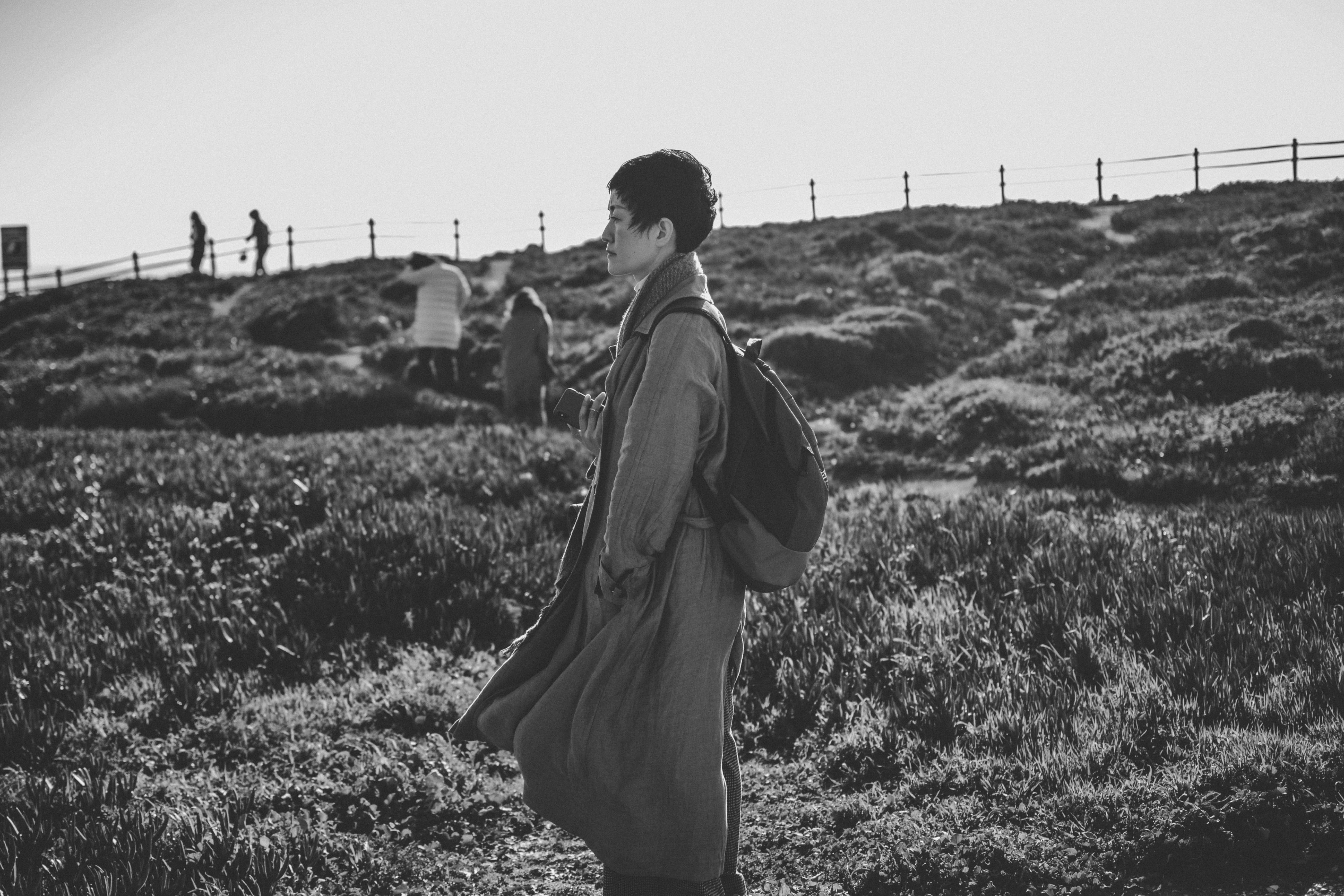
READCHINA’s Principal Investigator, JunProf. Dr. Lena Henningsen, took part in an interdisciplinary virtual workshop titled “Thought provoking impulses on Adaptive and maladaptive memory in brains and machines” at the University of Freiburg on March 4, 2021.
The aim of the talks was to give an introduction to the view on memory from different disciplines. The presentations were as follows: “Imaging memory engrams in the human brain (Psychology)” by Monika Schönauer; “Induction of plasticity using Brain-Computer Interfaces (Sport Science)” by Natalie Mrachacz-Kersting; “Perspectives on memory in artificial learning systems (Computer Science)” by Joschka Boedecker; and “Remembering the Chinese Cultural Revolution (Sinology)” by Lena Henningsen. Concluding remarks were delivered by Andreas Vlachos and Ilka Diester.
Papers Presented at Virtual Lecture Series "Practices of Reading in the People's Republic of China" 2020/21
2021-02-01 00:00:00 +0000
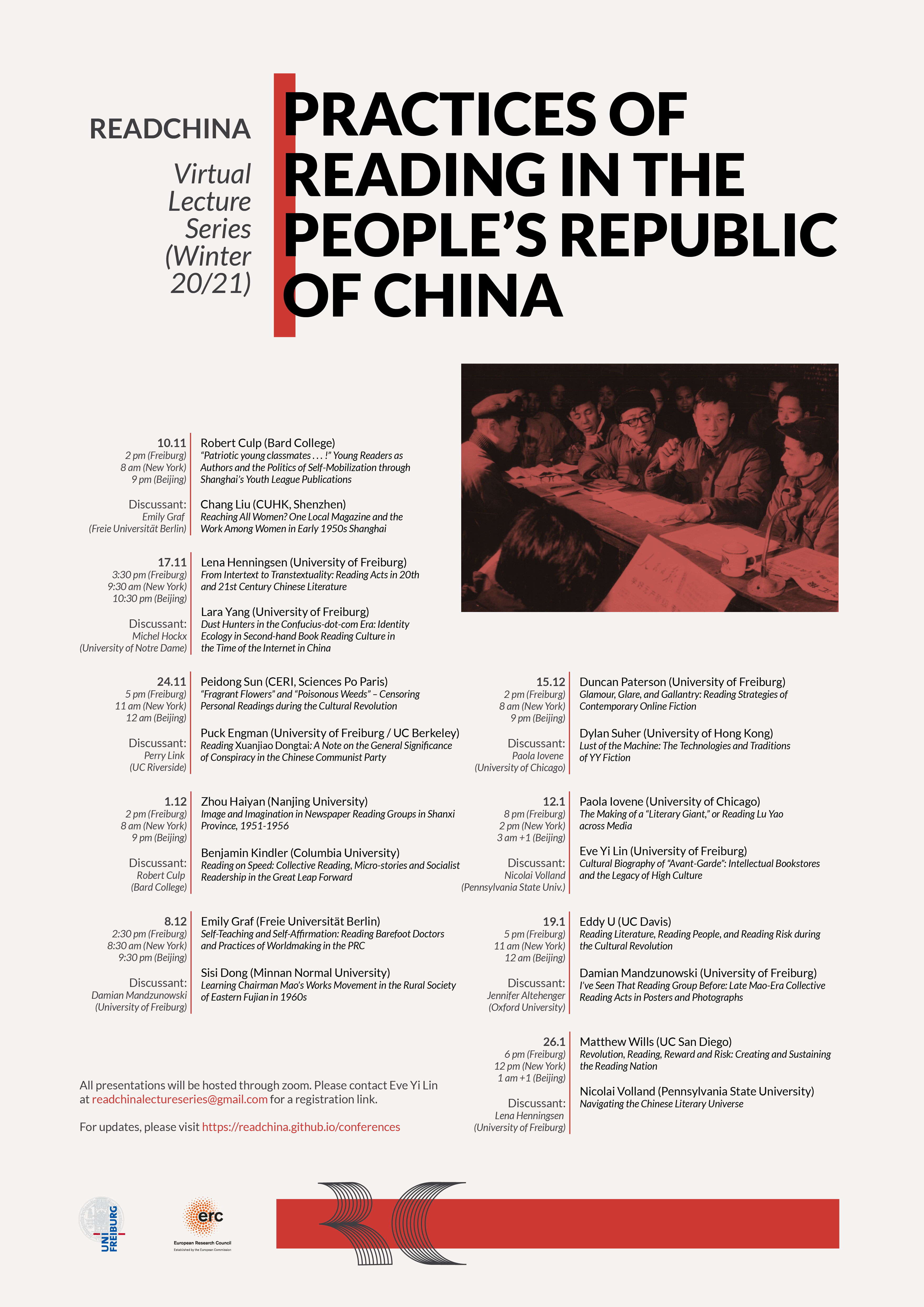
All our project members presented papers during the READCHINA-organized virtual lecture series “Practices of Reading in the People’s Republic of China”:
-
Lena Henningsen presented a paper titled “From Intertext to Transtextuality: Reading Acts in 20th and 21st Century Chinese Literature”; read the abstract here.
-
Lara Yuyu Yang presented a paper titled “Dust Hunters in the Confucius-dot-com Era: Identity Ecology in Second-hand Book Reading Culture in the Time of the Internet in China”; read the abstract here.
-
Duncan Paterson presented a paper titled “Glamour, Glare, and Gallantry: Reading Strategies of Contemporary Online Fiction”; read the abstract here.
-
Eve Yi Lin presented a paper titled “Cultural Biography of “Avant-Garde”: Reading China’s High Culture from the Intellectual Bookstore”; read the abstract here.
-
Damian Mandzunowski presented a paper titled “I’ve Seen That Reading Group Before: Late Mao-Era Collective Reading Acts in Posters and Photographs”; read the abstract here.
VLS 9: Reading Nationally and Transnationally in the PRC
2021-01-19 00:00:00 +0000
The intertwined state of the national and the transnational is a noteworthy issue in (the study of) reading practices. On the one hand, reading can be facilitated by the state and in turn help sustain the national image. On the other hand, reading in a certain national or local space often conceals (and reveals) transnational elements. In the final session of our virtual lecture series both aspects of reading practices will be at the center. First, Nicolai Volland (Penn State University) will propose the model of a literary universe to address the transnational elements within Chinese literary space, as well as the interaction and interplay between its various elements. The second speaker, Matthew Wills (UC San Diego), will disclose how the state media in the PRC fashioned an image of the “reading nation” and fueled the demand for books during the “Criticize Lin, Criticize Confucius” campaign. Lena Henningsen (University of Freiburg) will act as discussant.

Date: 2021-01-26
Time: 6 pm (Freiburg) / 12 pm (New York) / 1 am +1 (Beijing)
To attend: Signup once for your access code or, if you already have, directly join the session via Zoom.
Navigating the Chinese Literary Universe
Nicolai Volland
Abstract:
This presentation proposes the model of a literary universe, as a framework that allows for local agency and a multiplicity of perspectives, in order to push back against the universalizing and centralizing (often Eurocentrist) tendencies of world literary studies. The model I develop in this paper is designed to address some of the largest gaps in existing theories of world literature, namely, the failure to account for local (i.e. historically specific) agency, and the inability to address the role of translated literature vis-à-vis its “original” counterparts. Drawing on an extended astronomical metaphor, this paper suggests that a historically grounded reading of modern Chinese literature needs to take into account the pervasiveness of transnational elements within Chinese literary space, and address the interaction and interplay between these various elements. Chinese reading practices, I argue, are inherently transnational, and modern Chinese literature needs to be perceived as an active and dynamic element of world literary space.
Revolution, Reading, Reward and Risk: Creating and Sustaining the Reading Nation
Matthew Wills
Abstract:
Books need readers and readers need books. This fourth chapter of my dissertation discusses the institutions which encouraged and facilitated propaganda reading during the “Criticize Lin, Criticize Confucius” campaign. In this campaign, the state encouraged campaign participants to denounce Confucianism as a regressive political philosophy and attack Lin Biao as a present-day acolyte of Confucius. In other chapters of my dissertation, I have presented examples of books distributed on mass, the methods used to disseminate them, and inequalities in access to printed material. Building on these examples, I show the important role played by state media in spreading knowledge about books and encouraging people to read. I posit that newspapers and periodicals acted as pseudo-advertisers fashioning an image of the “reading nation” and fuelling demand for books. State media, in other words, turned people into library patrons and bookstore customers. More generally, I register how the campaign both drove and thrived on the dramatic revival of libraries as centers of political activity, the expansion of Xinhua Bookstore’s nationwide distribution network, and the recovery of the second-hand and rare books market. Librarians and booksellers, like publishers and printers, worked in the vanguard of the state’s communication with its subjects. Similarly, libraries and bookstores manifested the reach of the state in bricks and mortar. The variable growth of these institutions in different parts of the country, however, qualified this reach and again highlights the disparity in political communication between urban and rural areas. Tracing this history also highlights the ambiguity built-in to the status of the book in modern China’s politicized spaces. The state encouraged the commodification of books to achieve its political goals, vestiges of past cultural elitism returned, and politics left room for profiteering.
VLS 8: Stealthy Reading and Collective Reading in the Mao Era
2021-01-12 00:00:00 +0000
In the Mao-era, multifaceted strategies of reading were existing next to one another. The eighth session explores two such poles on the spectrum of reading acts. On the one side are hidden readings of suppressed or even forbidden texts during the radical phase of the Cultural Revolution. On the other side are officially organized group reading sessions in the mid-1970s. The first speaker, Eddy U (University of California, Davis) investigates stealthy reading of books, letters, poems, and other material practiced by victims of abuse during the Cultural Revolution for purposes of self-preservation. The second speaker, Damian Mandzunowski (University of Freiburg), analyses depictions of collective reading activities in posters and photographs created during a mass-reading campaign in 1975 to explore their integrative aspects. Both forms of reading are crucial to take into account when researching the history of reading in the Mao era. Jennifer Altehenger (Oxford University) will act as discussant.
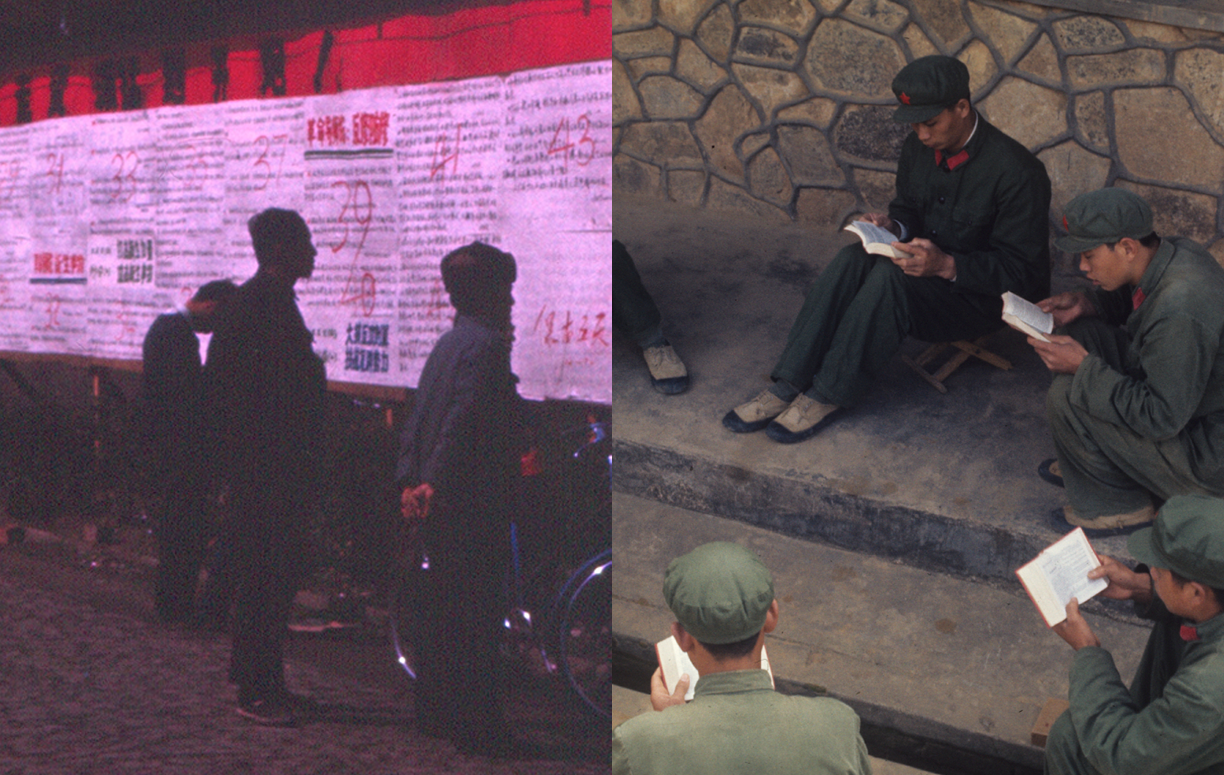
Date: 2021-01-19
Time: 5 pm (Freiburg) / 11 am (New York) / 12 am (Beijing)
To attend: Signup once for your access code or, if you already have, directly join the session via Zoom.
Reading Literature, Reading People, and Reading Risk during the Cultural Revolution
Eddy U
Abstract:
Reading was an essential activity during the Cultural Revolution. Individuals read “big-character posters,” newspapers, and official instructions to assess danger and development. They read Mao’s works to show political devotion. They read their own confessional statement to weigh whether the content could help them fend off abuse. This paper investigates a different but no less important kind of reading for purposes of self-preservation—stealthy reading of books, letters, poems, and other material practiced by victims of abuse. Stealthy reading, which occurred between physical abuses, was crucial for restoring among the victims a sense of hope, control, and autonomy. Because the reading activities occurred surreptitiously, they inevitably involved cautious reading of people nearby and reading of potential risk of punishment. I identify three analytical different types of stealthy reading: reading as healing, reading for safety purposes, and reading for love. Evidence comes from recollections of abused writers.
I’ve Seen That Reading Group Before: Late Mao-Era Collective Reading Acts in Posters and Photographs
Damian Mandzunowski
Abstract:
Officially organized group reading sessions were a constant element in the system of political communication during the Mao era. Yet, how did ordinary women and men know what patterns of behavior were expected of them during such collective reading activities? Visual texts—films, comic books, posters and photographs—were of substantial aid. In this paper, I zoom in on posters and photographs created during the “Campaign to Study the Theories of the Dictatorship of the Proletariat 学习无产阶级专政理论运动” in early 1975. These materials, I show, were employed by state propaganda in order to re-activate memories from previous collective reading activities as well as to communicate to first-time collective readers too. The paper concludes that the relation between the visual depictions of collective reading acts to the formation of actual communities around the activity of collective reading was not only formative, but also sustaining.
VLS 7: Reading Media and Reading Places in Post-Mao China
2021-01-05 00:00:00 +0000
Media and places of reading are often seen as primarily the context of reading acts. Foregrounding these “peripheral” aspects of reading, however, will supplement our understandings of reading cultures and the social-cultural mechanisms behind reading. Moreover, analyzing media and places of reading promotes reevaluations of literary figures and literary history, brings into being new forms of reading, and constantly (re-)defines cultural legacies and cultural concepts in a rapid-changing society such as that of the post-Mao China. In the seventh session, Paola Iovene (University of Chicago) will investigate how local museums and the national radio have recreated the authorial persona of the writer Lu Yao (hailed as a “literary giant”) and popularized his fiction beyond the written page. The other speaker, Eve Lin (University of Freiburg), will discuss the vicissitudes of post-Mao China’s reading culture and its high culture legacy by tracing how the concept of “Avant-Garde” mutates over the years in bookstores. Nicolai Volland (Pennsylvania State University) will act as discussant.
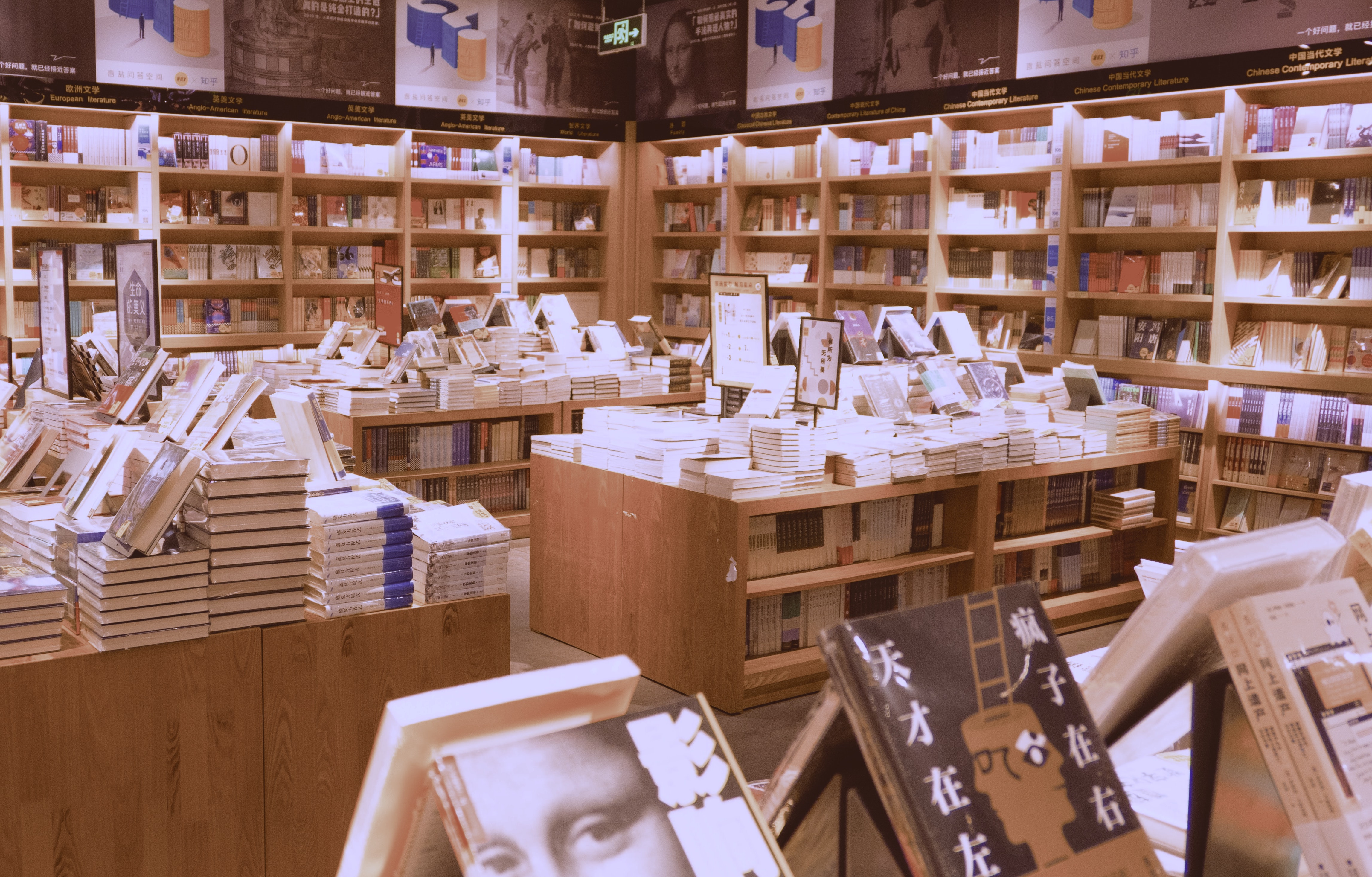
Date: 2021-01-12
Time: 8 pm (Freiburg) / 2 pm (New York) / 3 am +1 (Beijing)
To attend: Signup once for your access code or, if you already have, directly join the session via Zoom.
The Making of a “Literary Giant,” or Reading Lu Yao across Media
Paola Iovene (University of Chicago)
Abstract:
Lu Yao occupies a controversial place in Chinese contemporary literary history. Born to a destitute peasant family from the area around Yan’an in 1949, he published his first novel Life in 1982, won the Mao Dun Literary Prize with the three-volume Ordinary World in 1991, and prematurely died in 1992. His work was initially met with mixed critical reactions and his name is barely mentioned in the influential History of Contemporary Chinese Literature by Hong Zicheng (1999). Nonetheless, a movie, a radio broadcast, and multiple TV series adaptations have made him popular among the youth, and from 2005 onwards, major academic conferences have been organized on his writings, biographies and critical monographs have been published, and four museums dedicated to him have been built. On the cover of the English translation of Life released by Amazon Publishing in 2019 Lu Yao is hailed as a “literary giant,” an epithet that would have been unthinkable just twenty years ago.
Based on research conducted in Shaanxi in Fall 2016, this paper investigates the reading acts that have contributed to Lu Yao’s growing fame, focusing on how local museums and the national radio have recreated his authorial persona and popularized his fiction beyond the written page. Through the case of Lu Yao, we learn how reading acts are imbricated within provincial networks that are distant from and yet connected to the capital and the wealthier coastal cities that have been the hotbed of literary experimentation over the last four decades. As the result of multiple reading acts that deliberately blur the line between the author and his fictional characters, Lu Yao is now seen as a victim of academic elitism and as a model of endurance, hard labor, and sacrifice. His recent reevaluation is an important aspect of the ongoing rewriting of the literary history of the 1980s, as he has come to epitomize a popular form of realism that was (allegedly) repressed by academically trained critics who valued modernist experimentation. Through this process, Lu Yao himself has become a quasi-fictional character at the center of a narrative pitting metropolitan elites against provincial ordinary folks, contrasting their literary tastes and needs and reclaiming a larger role for more readerly forms of writing inspired by the Yan’an Talks.
Cultural Biography of “Avant-Garde”: Reading China’s High Culture from the Intellectual Bookstore
Eve Y. Lin (University of Freiburg)
Abstract:
Bookstores are places with distinctive cultural identities where the encounter of books and reading activities are staged in a well-designed cultural atmosphere. Reading into post-Mao China’s bookstores – charting their historical development, analyzing narratives of their cultural identities and cultural images, and interpreting cultural messages through their spatial designs – reveals new forms of reading in post-Mao China’s consumerist society and its changing reading culture. Moreover, through its sensorial and symbolic space and its self-narration, the post-Mao China’s bookstore helps to define and constantly re-defines cultural legacies and cultural concepts in a rapid-changing society.
This paper explores the symbiotic state between post-Mao China’s high culture legacy (in full fledge during the 1980s) and the consumerist reading culture (deemed as rapidly taking the upper hand since the 1990s) by focusing on the development of China’s bookstores and the changed reading culture revealed in their space. While taking note of the broad historical picture of post-Mao China’s bookstores, this paper will focus on one bookstore for case study: the “Librairie Avant-Garde” (先锋书店),a typical “intellectual bookstore” with cultural reputation and historical value. Tracing how the cultural concept of “Avant-Garde” as a representative for China’s high culture legacy mutates over the years in the bookstore, this paper argues that the process of commercialization in post-Mao China does not “kill” the high culture legacy as much as casts the latter into a prolonged re-shuffling with the consumerist culture, until the distinctions between the highbrow and the popular, modernism and postmodernism, artistic/spiritual autonomy and the consumerist lifestyle become blurred and highly ambiguous. The pictures of the reading culture, and more broadly, of the entire cultural field in post-Mao China, are hence much more intertwined and complex than the one with a clear historical rupture marked by the 1980s-1990s turn.
Two Distinctions for Our Team Members
2020-12-10 00:00:00 +0000
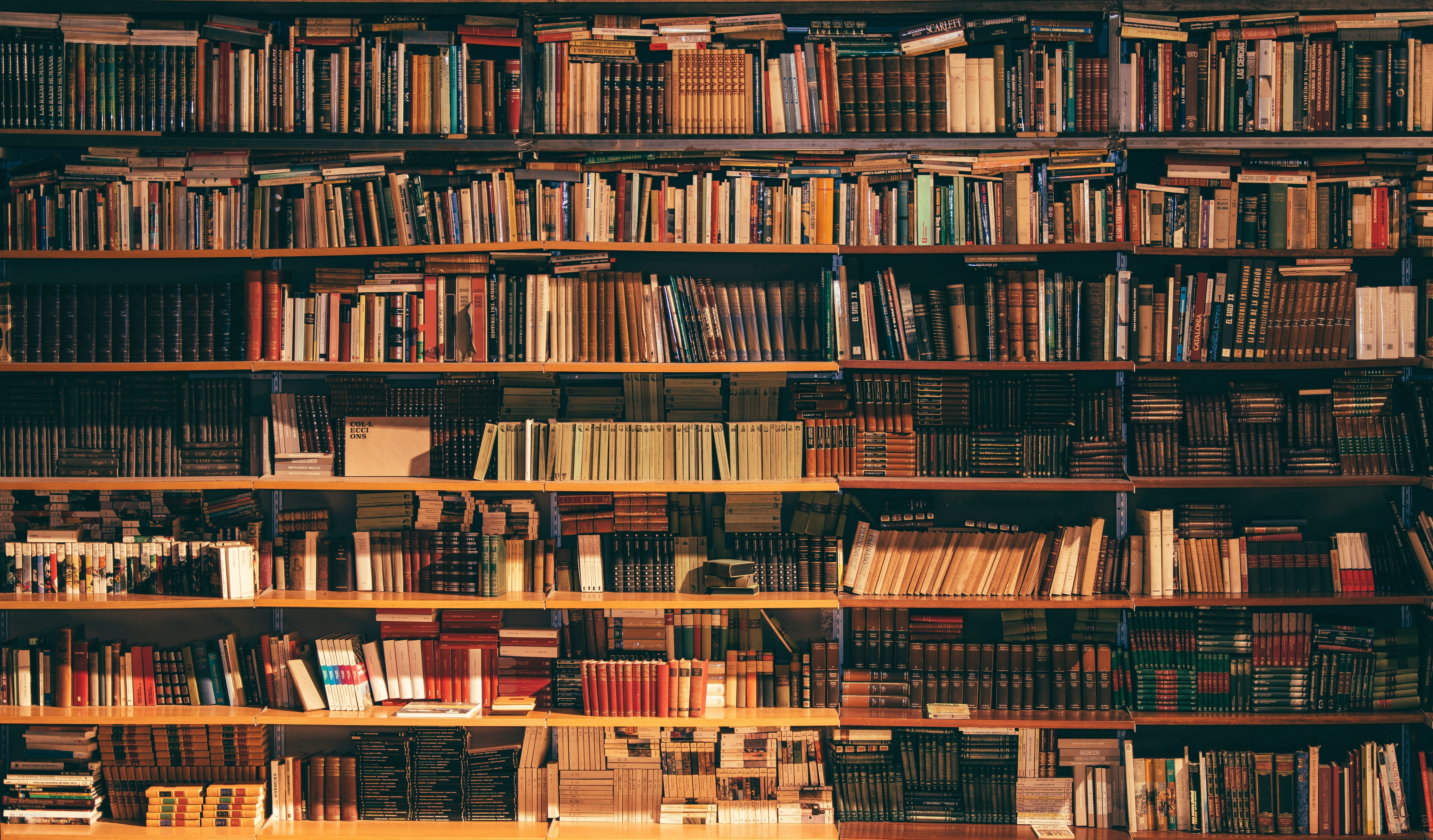
Dr. Lara Yuyu Yang has been named Visiting Scholar at The International Center for Studies of Chinese Civilization (ICSCC) at Fudan University for a period of six months. Lara will take up her visiting scholar position in Spring 2021.
Damian Mandzunowski has been awarded the Max Weber Foundation – German Humanities Institutes Abroad China Travel Grant (Reisestipendium China) for a three-month-long fieldwork and archival research stay in China. Damian will commence the trip, if the situation allows, in March 2021.
We are very happy for both of our colleagues and look forward to seeing the results of their stays in China!
VLS 6: Digital Reading and Online Reading
2020-12-08 00:00:00 +0000
We are living in a world that has been greatly influenced, even transformed, by digital and Internet technologies in various aspects. Reading practices and studies of reading are no exception. In the 6th session, Duncan Paterson (data manager of READCHINA) will address the value of new digital approaches (adopted by the READCHINA team) in the study of reading. He will then discuss the impact and potential insights from reading born-digital texts in contemporary China. The second speaker, Dylan Suher, will unfold his studies on the “YY fiction” – a prominent genre in contemporary Chinese Internet fiction. Not only will he investigate the outline, the origin and genealogy of YY fiction, he will also suggest a re-reading of the older, allegedly realist novel as a work of YY fiction. For both speakers, digital and Internet technologies offer more than a new field in (the study of) reading, but can transform our overall perceptions on reading and on literary interpretation. Paola Iovene (University of Chicago) will act as dicussant.

Date: 2020-12-15
Time: 2 pm (Freiburg) / 8 am (New York) / 9 pm (Beijing)
To attend: Signup once for your access code or, if you already have, directly join the session via Zoom.
Glamour, Glare, and Gallantry: Reading Strategies of Contemporary Online Fiction
Duncan Paterson (University of Freiburg)
Abstract:
This paper explores how digital practices can augment our understanding of reading practices in two parts. The first part concerns digital approaches to the study of reading, as they are implemented throughout the research infrastructure of READCHINA. At its core is the research database ReadAct, which allows researchers to conduct work on heterogeneous aspects of reading in the PRC from within a unified conceptual framework. To the best of our knowledge such a formalized data-model is the first of its kind. While it is true that designing a model that balances the strict demands of machine logic and humanistic research is challenging to both machines and researchers, I argue that the two are not in opposition but mutually enhancing. Machine readers uncover hidden assumptions and argumentative weaknesses in places where human readers do not. Humanistic research questions, on the other hand, can help us to counteract algorithmic biases and reductionism.
The second part, addresses reading of born-digital texts, such as online literature, games, and augmented reality textbooks. As the sheer scale of ephemeral on-screen reading exceeds the ability of human readers to keep up, it unduly distorts our view of reading practices in contemporary China. We can address this blind-spot using the same computational tools responsible for the first non-human authors / literature bots. I argue that born-digital reading, with its distinct legal framework, social setting, and economic incentives can only partially be addressed by concepts that are rooted in the codex. A study of digital reading “on its own terms” can therefore shed light on both reading practices on screen and in print.
Lust of the Machine: The Technologies and Traditions of YY Fiction
Dylan Suher (University of Hong Kong)
Abstract:
This paper will outline “YY fiction,” a key concept in contemporary Chinese internet fiction, and trace its genealogy from the works of the internet literature writer Maoni to Lu Yao, author of realist epics of the early Reform Era, to its purported origins in the classic novel Dream of the Red Chamber. “YY” (yiyin, “lust of the mind”) is a term which is used to describe fiction which satisfies basic human needs and allows for escape into immersive fantasy. This affect is achieved in Maoni’s novel Joy of Life through sprawling, slow-paced narratives that invest heavily in “worldbuilding” and are built around a main character who serves a point of identification for the reader; it is reinforced by an interface and set of practices on the Qidian platform which encourage total and habitual immersion in a text. Although the space of YY is realized through the technologies of the internet, members of the Chinese internet literature community trace back to the quotidian wish-fulfillment of Lu Yao’s Ordinary World, and, ultimately, to the utopian reading community of Dream of the Red Chamber. Re-reading Ordinary World as a work of YY fiction offers a new interpretation of the literary ecology that shaped that novel and blurs the lines arbitrarily drawn between realism and fantasy, utopia and heterotopia.
VLS 5: Rural Reading in Maoist China
2020-12-01 00:00:00 +0000
As a site of reading and of its various representations, rural China has its own contexts and aspects. Nevertheless—or perhaps: because of it—the rural was of great significance for various reading-related campaigns and political movements of the Maoist state. In the first paper of the fifth session, Dr. Emily Graf focuses on “barefoot doctors” in the countryside in relation to reading. By investigating their double roles as both the subject of reading acts and the depicted objects in the representations of reading, Graf shows how barefoot doctors engaged in world-making practices, and asserted their place in a newly mapped world of revolutionary health. The second speaker, Dr. Sisi Dong (lecturer at Minnan Normal University), discusses the development of the Campaign to Study Mao Zedong Thought and His Works (学习毛泽东思想及其著作的运动) in southwestern China's rural societies. Focusing on a small village in Fujian province, Dong analyses the concrete reading situations, related difficulties and corresponding methods to deal with them, as well as the historical impact of the campaign at large. The discussant this week is Damian Mandzunowski, a core member of the READCHINA project.
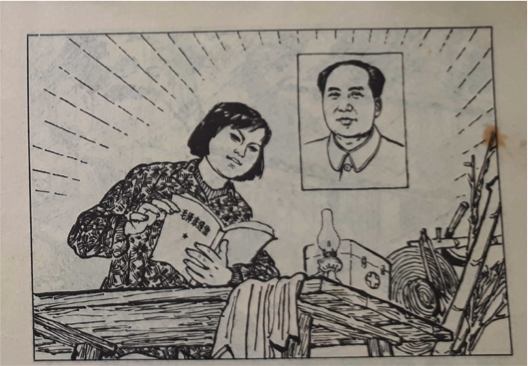
Date: 2020-12-08
Time: 2:30 pm (Freiburg) / 8:30 am (New York) / 9:30 pm (Beijing)
To attend: Signup once for your access code or, if you already have, directly join the session via Zoom.
Self-Teaching and Self-Affirmation: Reading Barefoot Doctors and Practices of Worldmaking in the PRC
Emily Graf (Freie Universität Berlin)
Abstract:
The term “barefoot doctor” (chijiao yisheng 赤脚医生) gained currency in 1968 during the Cultural Revolution, after Mao Zedong’s Directive had insisted that medical work needed to focus on the countryside. Doctors from urban areas were increasingly “sent down” to the countryside to train individuals in basic hygiene and primary medical care, offering classes for part-time health workers, so-called “barefoot doctors”. The image of the barefoot doctor became key in visualizing the revolution of health care in the PRC. This paper investigates the imagined reading practices of barefoot doctors. Three questions lead me through this investigation, starting from a very fundamental question: Did barefoot doctors read? If so, what did they read? Manuals, textbooks and medical journals for the implied barefoot doctor as reader give insights into the making of a new kind of (medical) knowledge. Barefoot doctors were presented as autodidacts, largely self-taught through independent study of “little red (medical) books”, illustrated manuals, political texts, but above all through learning-by-doing in practicing medicine. Collective reading in groups and oral transmission broke with established knowledge transmissions based on medical texts handed down from generation to generation within families or during apprenticeships. The young, low-literate, female barefoot doctor appeared as a new reader and new actor in depictions of revolutionary medicine. Taking a further step into the visual history of barefoot doctors, I inquire how barefoot doctors were depicted as reading in texts and images that aimed for a larger readership beyond the medical field. Depicted “reading acts” by the protagonists of three comic books published in 1970, 1971 and 1976 by the Shanghai People’s Publishing House manifest the importance of such acts to communicate the equal importance of political education and medical education. They, however, also reveal the visual contradictions that arise from arguing for learning-by-doing instead of reading in medical education through the means of visualizing reading barefoot doctors. And, surprisingly, they return to the private and secret reading act as the ultimate way to gain a ‘correct’ political outlook and Weltanschauung. By investigating what barefoot doctors read or were meant to read, and how they are depicted reading, this paper shows how barefoot doctors engage in worldmaking practices, self-constituting and self-affirming their place in a newly mapped world of revolutionary health.
Learning Chairman Mao’s Works Movement in the Rural Society of Eastern Fujian in 1960s
Sisi Dong (Minnan Normal University)
Abstract:
My research focuses on the Learning Chairman Mao’s Works Movement in the rural society. Although the movement has gained much attention from contemporary researchers, most of them have relied on public archives, which means that they mainly analyzed the movements through significant changes in the political system. However, the practices of the mass in local societies are missing. Thanks to the grassroots resources that contain local historical documents from the “collective era”, in recent years, we are able to look at everyday practices in local societies. My main resources in the present research include local archival documents about the Learning Chairman Mao’s Works Movement in the collective era in S village, a village under the administration of the Yongtai County, which I discovered in eastern Fujian since 2016 during my fieldworks. I will structure my talk in four parts. The first part is about the stages of the Learning Chairman Mao’s Works Movement. Secondly, I will talk about difficulties in learning Chairman Mao’s works in rural societies. And then the third part is about the methods for solving the above problems. Finally, I will discuss the influences brought by this movement.
VLS 4: Reading Practices, Social Practices, and the Everyday
2020-11-24 00:00:00 +0000
Different from the privatized view of reading, in the Chinese cultural field, reading through a certain medium or of a certain artistic form often binds the individual to macroscopic social programs and to the politics of the everyday. In the fourth session, Haiyan Zhou will discuss how the reading of images of labor are linked to the broader image of the global socialist movement presented in newspapers in the 1950s China. The other speaker, Benjamin Kindler, will then discuss the practices of the Chinese literary form “short short story” across a long historical arc, highlighting the extend to which this form dislocates reading from its location in an individual subject, makes room for collective reading, and transforms the contents of everyday life. Robert Culp will be acting as discussant to this session.
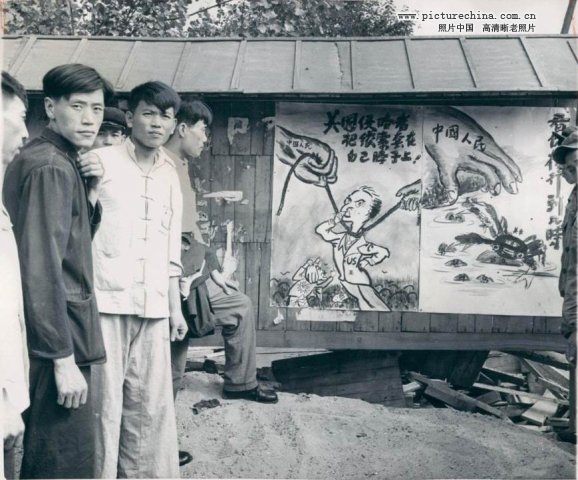
Date: 2020-12-01
Time: 2 pm (Freiburg) / 8 am (New York) / 9 pm (Beijing)
To attend: Signup once for your access code or, if you already have, directly join the session via Zoom.
Image and Imagination: The Politics of labor in Newspaper Reading Groups (1950-1956)
Haiyan Zhou (Nanjing University)
Abstract:
The research of China’s propaganda system is an important issue in China studies. But previous research doesn’t focus on how exactly did the propaganda system influence common people, and how people in turn adopted the official discourse in their individual social practice. There are some unanswered questions. 1. How do people produce and share meaning during collective newspaper reading, which is essentially a practice of political discourse? 2. How does this discursive practice transform into other types of social practices (political, societal, cultural), depict new types of social landscape, and propel the formation of new types of social relationship? In the case study of the stories of Xigou, I will argue that images and pictures with verbal depictions have facilitated cognition, and inspired imagination and subsequent actions, which in turn contributed to a process of meaning production that influenced the society. In the 1950s, the images of labor were linked to the broader image of the global socialist movement presented in newspapers, which formed the blueprint for the future of the “new China”. By reading these stories, people could “see” a new China, see their own positions in this new China, and imagine their own lives in the future. The actions of newspaper reading groups, therefore, have played an important role in the communal imagination of the new China.
Maoist Miniatures: The Proletarian Everyday, Collective Reading and the Politics of Revolutionary Form
Benjamin Kindler (Columbia University)
Abstract:
Across an extended historical arc, from the 1930s up to the early reform period, Chinese authors and literary theorists located in “small forms” (xiao xingshi) the possibility of a cultural practice that would embody the ambitions of the total transformation of social relations. This paper develops a genealogy of one particular instance of such small forms, namely the “short short story”, which, having appeared under various names at different historical and political junctures – the qiangtou xiaoshuo, xiao xiao shuo, and weixing xiaoshuo – marks an as of yet understudied dimension of Chinese revolutionary culture. The paper undertakes this analysis from the perspective of the historical avant-garde, tracing the recurrent emergence and transformation of this form with a view to the production of a practice of reading that would not be beholden to the extended temporalities and exacting demands of the long-form novel. This fractured and uneven genealogy takes in the role of Japanese proletarian literature in China, the politics of form in the Great Leap Forward, and the relations between textual and visual media. At its most radical, the practice of the short short story sought to dislocate reading from its location in an individual subject and its temporal bifurcation from the time of labour in order that collective reading would take place in the interstices of collective labour itself, as a basis on which to transform the contents of everyday life.
VLS 3: Readership in the Context of Heightened Political Controls
2020-11-17 00:00:00 +0000
Politics has always had an impact on readership in a given society. In Maoist China, the degree of political controls over the practices of reading and communication becomes particularly interesting. The third session will reach this topic from the angles of the receivers and the reception/dissemination processes of political forces. The first talk, Peidong Sun discusses the state censorship on personal readings during the Cultural Revolution, with further suggestions on the limitations of censorship in the everyday life and reading. The second talk, given by Puck Engman, suggests an understanding of political communication in a context of “decoding.” A top-secret bulletin for the political elites will be discussed as a case, with a focus on how the intelligence provided through this bulletin is circulated and consumed. Perry Link (UC Riverside) will be acting as discussant to the session.
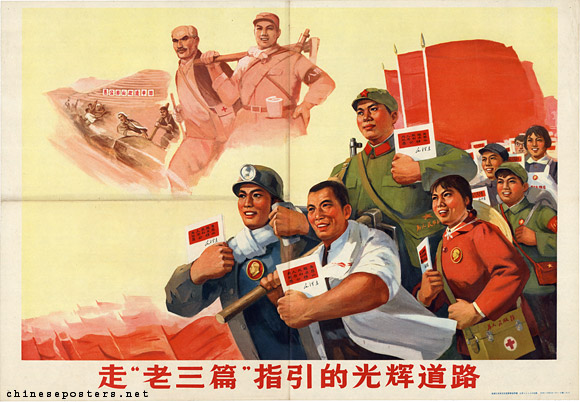
Date: 2020-11-24
Time: 5 pm (Freiburg) / 11 am (New York) / 12 am (Beijing)
To attend: Signup once for your access code or, if you already have, directly join the session via Zoom.
“Fragrant Flowers” and “Poisonous Weeds”: Censoring Personal Readings during the Cultural Revolution
Peidong Sun (CERI, Science Po Paris)
Abstract:
This paper studies the dynamic relationship between censorship and readership in the cultural governance of China. Using previously untapped CCP documents, private archival collections, oral history, personal and work journals, I examine the motivations, mechanisms, impact, and evolution of state censorship on personal readings during the Cultural Revolution (1966-1976). Specifically, I explore how books that were labeled “fragrant flowers” (xiang hua 香花) and “poisonous weeds” (du cao 毒草) evinced the state’s cultural sensibility and its interactions with official censorship. On the one hand, through “singing red and striking black” (chang hong da hei 唱红打黑), the system of cultural governance was both normative and punitive: official censorship and self-censorship induced “political side-taking” (zheng zhi zhan dui 政治站队) and “habitual following” (xi guan xing jin gen习惯性紧跟) within the society, which in turn normalized political power and transformed censorship into a cultural norm. On the other hand, a thriving literary underground, as seen in the hoarding of forbidden titles and their partial unbanning since 1970, suggests the limitations of censorship and shows how networks of information percolated through official politics and entered everyday life through reading and writing.
Reading the Xuanjiao Dongtai: A Note on the General Significance of Conspiracy in the Chinese Communist Party
Puck Engman (University of Freiburg/UC Berkeley)
Abstract:
Some fifty years ago, Franz Schurmann proposed that the investigation of the Chinese Communist Party’s system of communication should move into “the context in which the decoding of communication takes place.” Today, students of Chinese political communication still favor the field of production and representation over the challenging terrain of influence and reception. Historians of the People's Republic of China have become highly sensitive to the power of language and, to a lesser degree, to how it was conditioned by the institutional context that a former aide to Premier Zhao Ziyang has labeled "documentary politics.” However, a complete understanding of political process cannot be formed on the basis of the construction of state categories alone, but requires equal attention to the means of their dissemination and how formalized language was translated into terms of everyday discourse at the level of decoding. This note represents the first few steps in the exploration of a newly available corpus: the Xuanjiao dongtai was a top secret bulletin and a must-read for members of China’s political elite between 1953 and 1966. I will look at the consumption and circulation of the intelligence provided through this bulletin at the very top of the party hierarchy and present some preliminary thoughts on how we might think of political control in the context of decoding.
VLS 2: Textuality and Materiality in Reading Practices
2020-11-10 00:00:00 +0000
Textuality and materiality are two key properties of reading practices that are often studied separately. The second session, however, engages both into discussion through back-to-back talks. In the first talk, Lena Henningsen will share her thoughts on intertextuality and transtextuality based on the reading of Chinese science fiction. In the second talk, Lara Yuyu Yang treats the second-hand book reading practices as mostly material-centred, and goes on to discuss the tension between materiality and digitalization in China’s online second-hand book reading culture. The role of discussant is taken by Michel Hockx (University of Notre Dame)
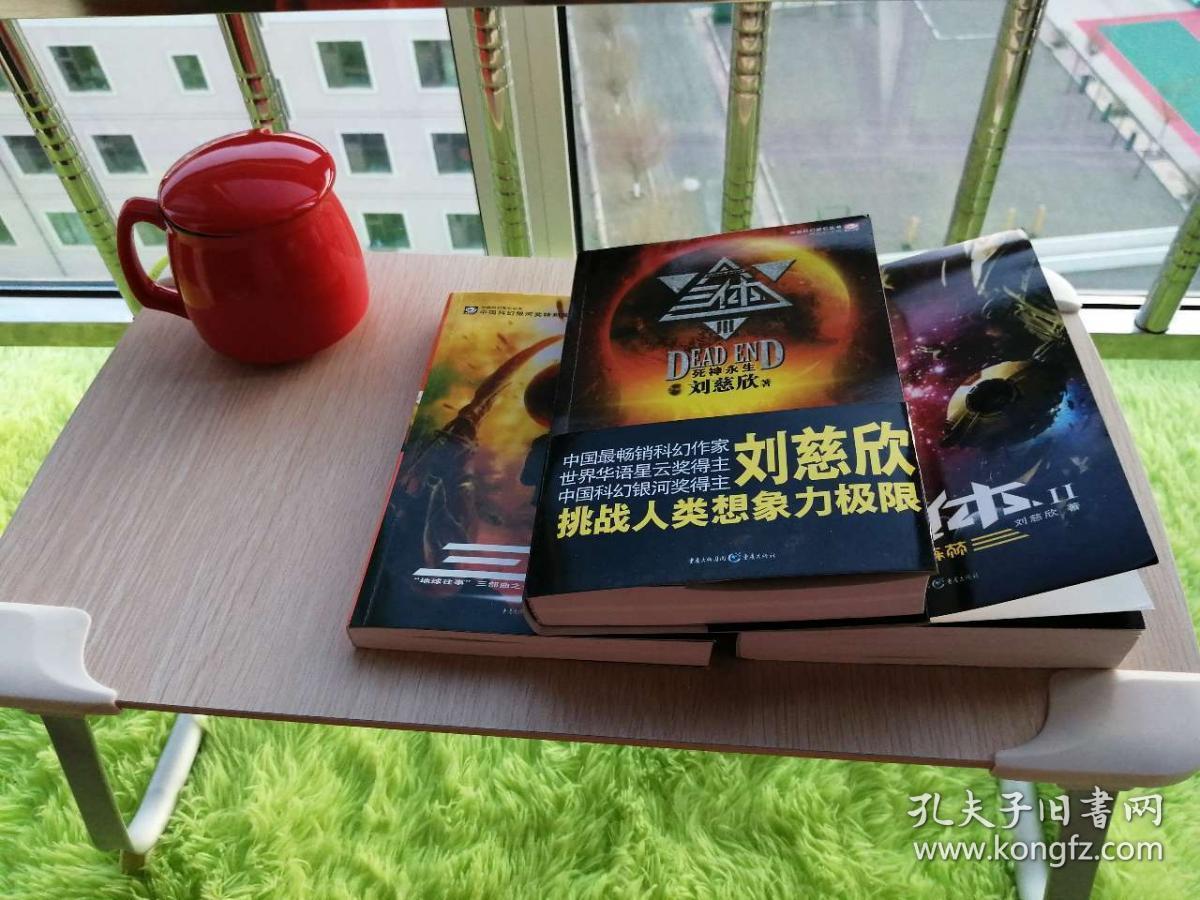
Date: 2020-11-17
Time: 3:30 pm (Freiburg) / 9:30 am (New York) / 10:30 pm (Beijing)
To attend: Signup once for your access code or, if you already have, directly join the session via Zoom.
From Intertext to Transtextuality: Reading Acts in Chinese Science Fiction as Interfaces to (World) Literature
Lena Henningsen (University of Freiburg)
Abstract:
In this paper, I propose the concept of transtextuality as an expansion of intertextuality. Transtextuality arises when two texts operate as interfaces to each other. Text and intertext open up into a transtextual space in which they mutually impact on each other, serving as interpretative frames to each other. The focus in this paper is on a particular type of intertextuality which I refer to as “reading acts”. In my analysis, these refer to scenes in which the protagonists of literary texts read other texts. The sample for this paper consists of Chinese science fiction texts. Reading acts, intertextuality and transtextuality are, of course, neither a privilege of Chinese fiction nor of Chinese science fiction. Rather, literary figures often read themselves, and science fiction seems to be a particularly intertextual genre. What I am interested in, however, are two concerns, one related to literary and intellectual history in China and one related to theorizing intertextuality, interfaces and transtextuality. I aim at situating the texts within their respective historical and literary field in order to trace which texts were popular at what times in China, how they were read and in how far this impacted both on notions of the intertext and on interpretations of Chinese literary texts. The analysis serves as an examination of the literariness, the literary status and the literary claims of the texts at hand. Employing the frameworks of the interface and of transtextuality on different forms of intertextual references in Chinese science fiction, I argue that, first, these texts provide their readers with knowledge about and interpretations of science fiction literature and beyond. Second, the texts reflect on the role of literature and, third, they make claims about their own literariness and position within the literary cosmos of their time and within the literary canon, be it a canon of science fiction literature or of world literature.
Dust Hunters in the Confucius-dot-com Era: Identity, Materiality and Sensory Attachments in Second-hand Book-reading Culture in the Time of the Internet in China
Lara Yuyu Yang (University of Freiburg)
Abstract:
What distinguishes a used book from a new book? After a new book has travelled between countless anonymous hands of book sellers, readers, garbage dealers and librarians etc., it is gradually remoulded into a singular entity with traces of marks and stains. I refer to these traces as “dust” in my work. These are material changes that manifest hints of reading activities. It is the dust that classifies a book into the “second-hand” category. Every reader of second-hand books, in this sense, is a dust hunter, and their reading practices, as I will maintain, are mostly material-centred. However, the dust attached to the physical books cannot necessarily be conveyed onto the internet when the books are digitalised. How, then, is it possible, both logically and pragmatically, for dust hunters to interact with other practitioners on the material aspects of a book through digitalised platforms? By analysing three online second-hand book-selling platforms, including kongfz.com (孔夫子), booyee.com.cn (布衣书局) and the Déjà vu (多抓鱼) app, with a view to analysing the historical transformation of this reading culture, in this talk I focus on the cultural identities of dust hunters in China from 2003 to the present, a period that I call, after the most influential platform, the “Confucius-dot-com era”. I argue that, traversing the gap between on and offline systems, the identity hierarchy and the cultural expectations placed on dust hunters have been altered with a new ecology, which has further restructured the field and induced sensory changes in second-hand book-reading practices.
VLS 1: Target Audiences of Official Publications in Early PRC
2020-11-03 00:00:00 +0000
The initial session concerns the target audiences of official publications in the early PRC with Emily Graf (Free University of Berlin) as discussant. The first talk, by Robert Culp, focuses on the young readers of the Youth League publications in Shanghai. Those readers gained authorial voices while serving as a self-mobilizing collective subject under Maoism. The second talk by Chang Liu, focuses on a short-lived official women’s magazine. The magazine failed allegedly because of its gendered perspective. The talk reveals the situation of the magazine’s target audience at the time.
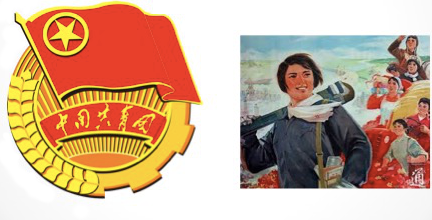
Date: 2020-11-10
Time: 2 pm (Freiburg) / 8 am (New York) / 9 pm (Beijing)
To attend: Signup once for your access code or, if you already have, directly join the session via Zoom.
Patriotic young classmates…! Young Readers as Authors and the Politics of Self-Mobilization through Shanghai’s Youth League Publications
Robert Culp (Bard College)
Abstract:
In 1951 at the height of the Resist America, Aid Korea Campaign, youth league publications in Shanghai were filled with testimonials by student volunteers for military cadre training schools, student reporters’ accounts of their school’s volunteer recruitment drives, and volunteers’ guidance on how to convince parents to agree to let young Shanghainese students abandon their studies to join military forces on the Korean front. Youth league publications, in other words, were co-authored by the very categories of educated youth (zhiqing) and young workers (qinggong) that composed their intended readership. In this paper I survey Shanghai New Democratic Youth League publications produced for early 1950s political campaigns to explore how testimony from youth activists were incorporated into the publications to create texts that were often multi-vocal in various ways. This multi-vocality created an echoing effect that served to realize a mass line politics discursively (“from the masses, to the masses”). Youth authors’ testimonials authenticated the state’s political messages by having them voiced already and seemingly spontaneously by the target audience. Youths seemed to be directly appealing to other youths, with the youth league’s and party’s mediating roles largely muted or erased. Young activists’ reflexive narratives also contributed to constituting and empowering them as state subjects. In broader, comparative terms, this process points to ways that Maoism eroded the distinction between author and reader, with complex implications for discursive (and perhaps political) authority, as “the people” appeared to emerge as a self-mobilizing collective subject, speaking to itself.
Reaching All Women: One Local Magazine and ‘the work among women’ in Early 1950s Shanghai
Chang Liu (Chinese University of Hong Kong, Shenzhen)
Abstract:
The period from 1949 to the early 1950s saw the short-lived publication of a number of women’s magazines such as Beijing Women, Tianjin Women, and Northeast Women by the newly established regional women’s federations. Despite the CCP’s rich experience in propaganda and Shanghai’s resourcefulness as China’s centre of the print industry and women’s education, the official publication of Shanghai Women’s Federation Modern Women, also failed its objectives and stopped issuing within two years. This paper explores the short history of Modern Women, especially the editorial concerns behind it. Since the Federation was an organ of the Party, the magazine was born with a mission in women-work. Drawing on archives and interviews, the paper argues that the Federation’s attempt to reach all women through the magazine was undermined by women’s high rate of illiteracy and the gaps in the life experience among different classes. Young cadres did not share the experience of workers and housewives, nor were the latter able to write their own stories. When the Federation adopted a new strategy of approaching women personally in their mundane life, it also stopped publishing the magazine. Modern Women thus reveals the intersection of gender and class in the Federation’s women-work. It also shows the congruity and incongruity of the Party’s political principles with the objective of women’s liberation, as well as the Federation’s pragmatism in women-work. Therefore, the paper offers a gendered perspective to understand the CCP’s adaptation to state-formation and city governing in the early 1950s.
Visual Repository of People Reading during China's Long Twentieth Century
2020-10-02 00:00:00 +0000
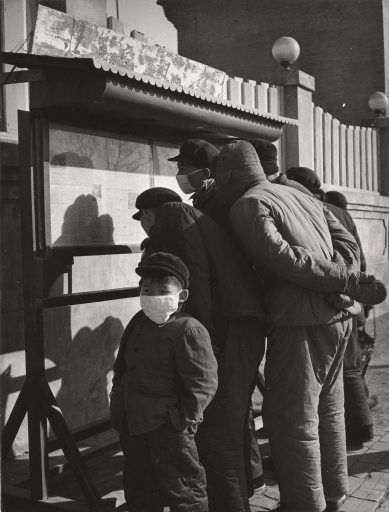 Source: Fernand Gigon / Fotostiftung Schweiz
Source: Fernand Gigon / Fotostiftung Schweiz
READCHINA’s Damian Mandzunowski is curating a digital repository of images of people engaging in the act of reading in China during the long twentieth century. Although other visual texts—such as posters, paintings, and films—shall be eventually included in the collection as well, its primary focus is on photographic depictions of reading.
When discussing the relationship between photography and history, Roland Barthes suggested that they add layers of “infraknowledge” to the researched subject; layers only hardly found elsewhere. The initial idea to start the collection of photographs of reading acts arose from a similar desire: to assemble a large body of evidence that can potentially expand our understanding of where, when and how people in China consumed texts. Given that, as described by John Berger, photographs “quote from appearances”, and that, as Susan Sontag impactfully theorized, photographs are “an ethics of seeing” that “miniaturize experience [and] transform history into spectacle”, the images here collected need to be seen in the given context of their creation and (intended) usages. Yet, and herein perhaps lies the essential power of images, first and foremost these photographs transfer us in time and space; they invite us to read over the shoulder of the historic reader in China.
Visit Reading Acts in Twentieth-Century China to see the images and to further read about the curatorial process. Get in touch with Damian on twitter @zhong_daming.
Humboldt-Fellowship Award for Dayton Lekner
2020-09-21 00:00:00 +0000
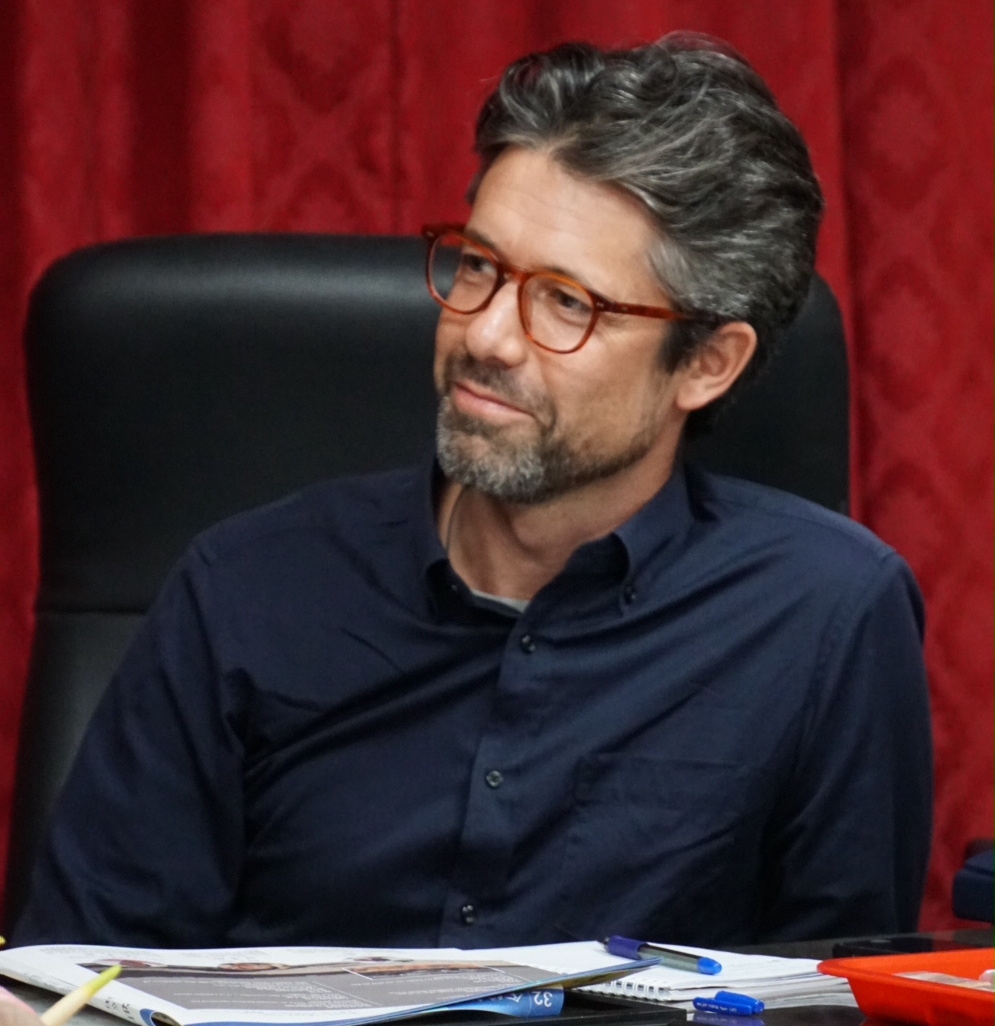 Dayton Lekner has been awarded a prestigious Alexander von Humboldt fellowship and will join the institute in spring 2021 and cooperate with the READCHINA team. Lekner will work on a social history of listening in the Mao era PRC, taking a three-tiered approach to explore state intent, local practices, and individual perceptions of the sonic during the formative years of the PRC. We are looking forward to welcoming him in Freiburg!
Dayton Lekner has been awarded a prestigious Alexander von Humboldt fellowship and will join the institute in spring 2021 and cooperate with the READCHINA team. Lekner will work on a social history of listening in the Mao era PRC, taking a three-tiered approach to explore state intent, local practices, and individual perceptions of the sonic during the formative years of the PRC. We are looking forward to welcoming him in Freiburg!
The Role of Women in Society Through the Lens of Chinese Science Fiction Literature
2020-07-01 00:00:00 +0000
Guest virtual lecture by Frederike Schneider-Vielsäcker (FU Berlin)
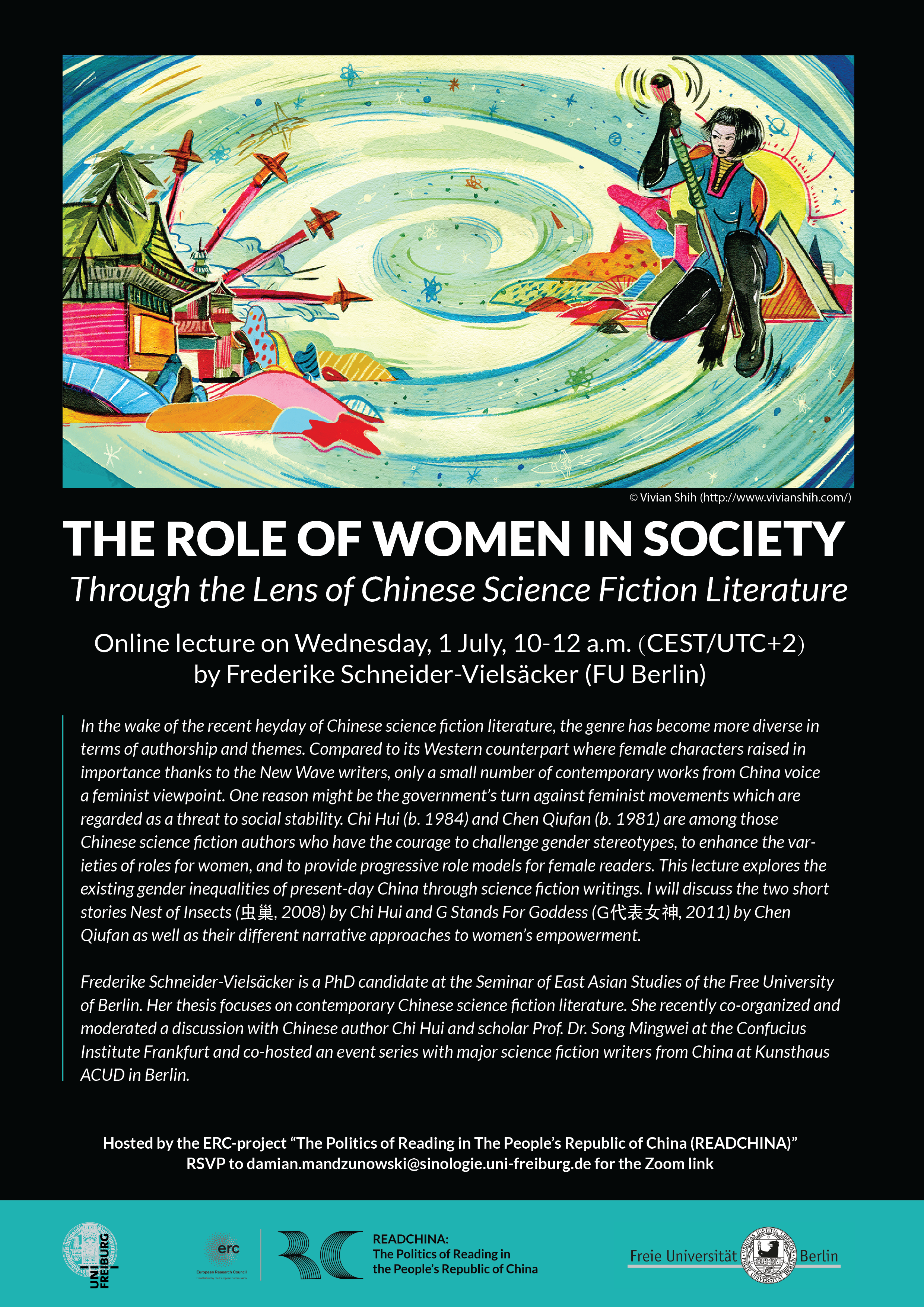
In the wake of the recent heyday of Chinese science fiction literature, the genre has become more diverse in terms of authorship and themes. Compared to its Western counterpart where female characters raised in importance thanks to the New Wave writers, only a small number of contemporary works from China voice a feminist viewpoint. One reason might be the government’s turn against feminist movements which are regarded as a threat to social stability. Chi Hui (b. 1984) and Chen Qiufan (b. 1981) are among those Chinese science fiction authors who have the courage to challenge gender stereotypes, to enhance the varieties of roles for women, and to provide progressive role models for female readers. This lecture explores the existing gender inequalities of present-day China through science fiction writings. I will discuss the two short stories Nest of Insects (虫巢, 2008) by Chi Hui and G Stands For Goddess (G代表女神, 2011) by Chen Qiufan as well as their different narrative approaches to women’s empowerment.
Bio
Frederike Schneider-Vielsäcker is a PhD candidate at the Seminar of East Asian Studies of the Free University of Berlin. Her thesis focuses on contemporary Chinese science fiction literature. She recently co-organized and moderated a discussion with Chinese author Chi Hui and scholar Prof. Dr. Song Mingwei at the Confucius Institute Frankfurt and co-hosted an event series with major science fiction writers from China at Kunsthaus ACUD in Berlin.
Papers Presented at Association for Asian Studies (AAS) Annual Conference 2020 - CONFERENCE CANCELLED
2020-03-26 00:00:00 +0000
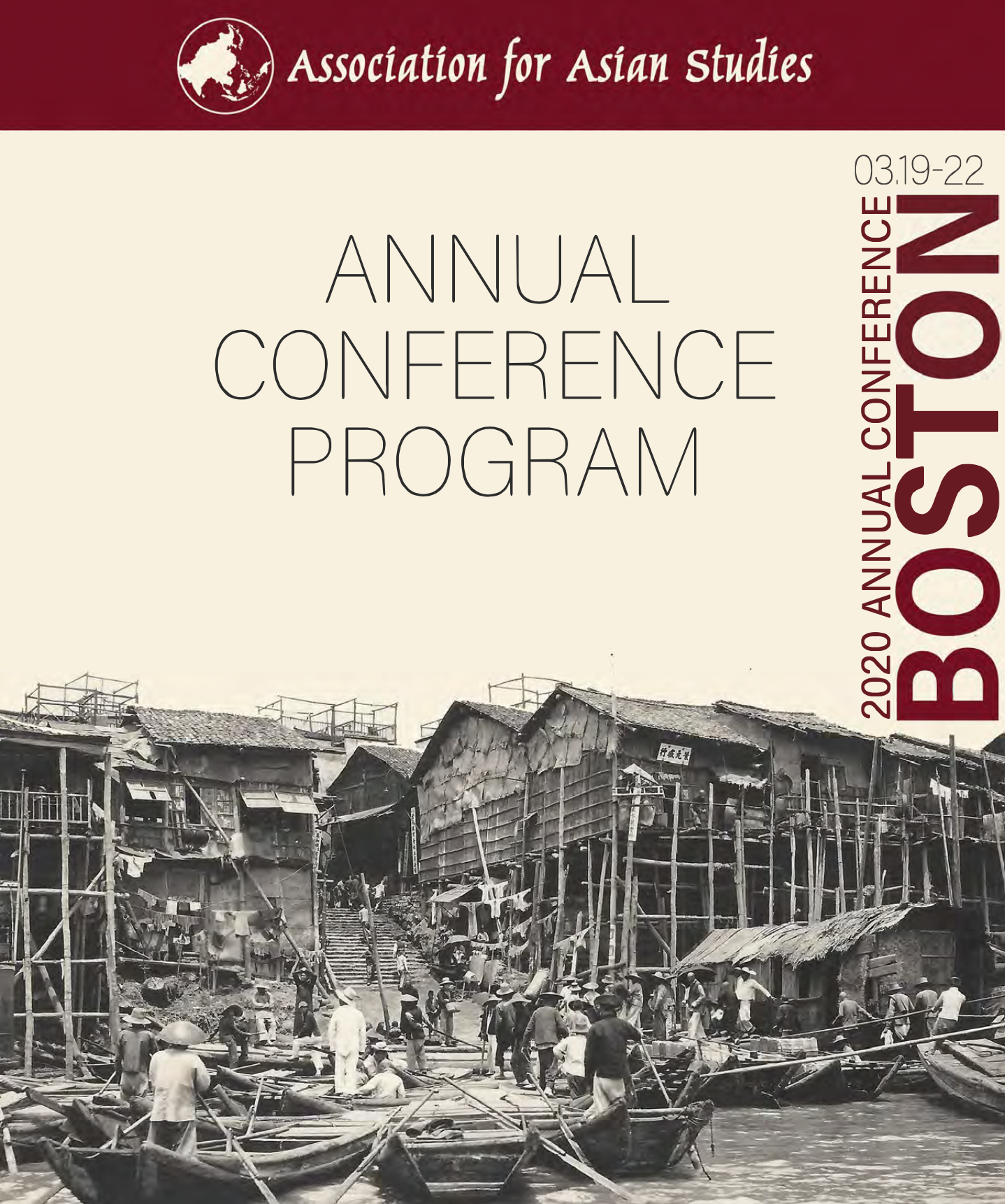
Two project members were to take part in the 2019 Annual Conference of the Association for Asian Studies (AAS) planned to be held in Boston, 21-24 March 2020. Due to the global COVID-10 pandemic, the conference has been cancelled.
-
Lena Henningsen was to present a paper titled “Books as Interfaces: Reading Acts in Chinese Fiction””;
-
Damian Mandzunowski was to present a paper titled “Communicating Political Change during Rituals of Collective Reading in Mid-1970s China”.
The conference program can be downloaded here.
Black Skin, Yellow Masks: Translation and Representation of Africa in China from 1949 to 1965
2020-01-14 00:00:00 +0000
Guest talk by Mingqing Yuan, MA (Bayreuth University)
This paper intends to review the translation and introduction of African literature and representation of Africa and blackness in China from 1949 to 1966 to see how Africa and blackness, as the colonised racialized other, feature in China’s nation building, conceptualization of revolution and perception of the world. It will focus on the magazine Yiwen (《译文》,后《世界文学》) and its selected translation and introduction of African literature as well as the play War Drums on the Equator (《刚果战鼓》, 1965), which uses blackface to represent Congolese people. Questions in regard to the selection, circulation, context and impacts of these works will be closely looked at. Both translated works and literary representation of Africa not only reflect the effort of “socialist cosmopolitan” to define itself, world literature and revolution, but also jointly construct blackness, nation and the world both conceptually and emotionally.
Barefoot Doctors on the Move: Tracing a Concept and its Image Across Space
2019-11-26 00:00:00 +0000
Guest talk by Dr. Emily Graf (FU Berlin)
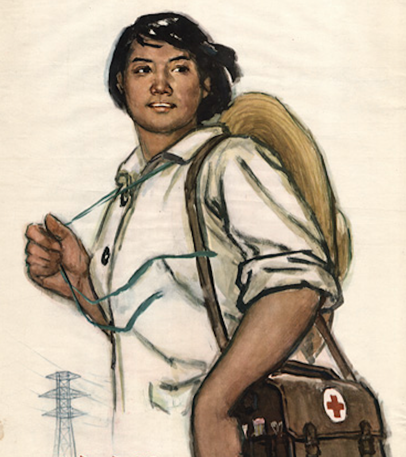
The term “barefoot doctor” (chijiao yisheng 赤脚医生) gained currency as a term and concept with Mao Zedong’s Directive in 1968, in which he insisted that medical work needed to be focused on the countryside. This involved great change for the health sector of the PRC that had previously been dominated by the strategies of the Health Ministry, which was run with the support of Soviet specialists, and which focused on fully-trained doctors in urban areas, aiming at developing higher expertise and specialization in their respective medical fields. With Mao’s Directive, doctors from urban medical establishments were increasingly “sent down” to the countryside to work in medical centers of the People’s Communes and train individuals in basic hygiene and primary medical care. Here they would offer classes for part-time health workers. The term barefoot implied that these newly-trained health workers would, ideally, also continue to work in the fields, which farmers did barefoot due to the flooded rice fields. Hence the term. By the early 70s, barefoot doctors added up to over one million and the basic health care coverage in rural areas increased drastically to finally cover up to 90%. The image of the barefoot doctor thus became key in visualizing the revolution of health care not only within the PRC during the Cultural Revolution, when it circulated in form of posters, but also globally. Images of the barefoot doctor as a symbol of support for and aid to Africa, for example, were key in creating a transcultural visual rhetoric of the Revolution. While in 1978 the “barefoot doctor” concept was viewed favorably by the World Health Organization (WHO), the term and practice would lose its recognition in the PRC after the Reform and Opening Period. This talk traces the history of the concept of rural health care in China and inquires how the image and concept of the barefoot doctor in particular moved beyond China. How did it travel? How was it received? And how did it shape how rural health care and community health workers are conceived in debates on Global Health today?
Bio
Emily Graf is a postdoctoral researcher at the Institute of Chinese Studies at the Freie Universität Berlin. She received her PhD in 2018 in Sinology and Transcultural Studies from Heidelberg University. Her primary research focuses on author museums dedicated to Lu Xun in the PRC, Bertolt Brecht in the GDR and Lai He in Taiwan. Taking a global perspective, she investigated how each author is represented as a left-wing writer and revealed how “world literary heritage” is thereby constructed through the display of their literary estates. A Visiting-PhD Fellowship at Renmin University of China, Beijing (2013-14) enabled her to visit author museums across China and Taiwan, interviewing museum directors, staff and visitors. She has taught classes on the writers Lu Xun and Lai He, on the contemporary writer Yan Lianke, as well as on past and present cultural politics in the PRC. In her recent research, she approaches the visual and cultural history of “barefoot doctors” and its relation to the field of Global Health.
Monday, Nov. 25, 2019: 18:00-19:30, Erbprinzenstraße 12 (Seminarraum Institut für Sinologie)
Papers Presented at Annual Meeting of the German Association for China Studies (DVCS) 2019
2019-11-19 00:00:00 +0000
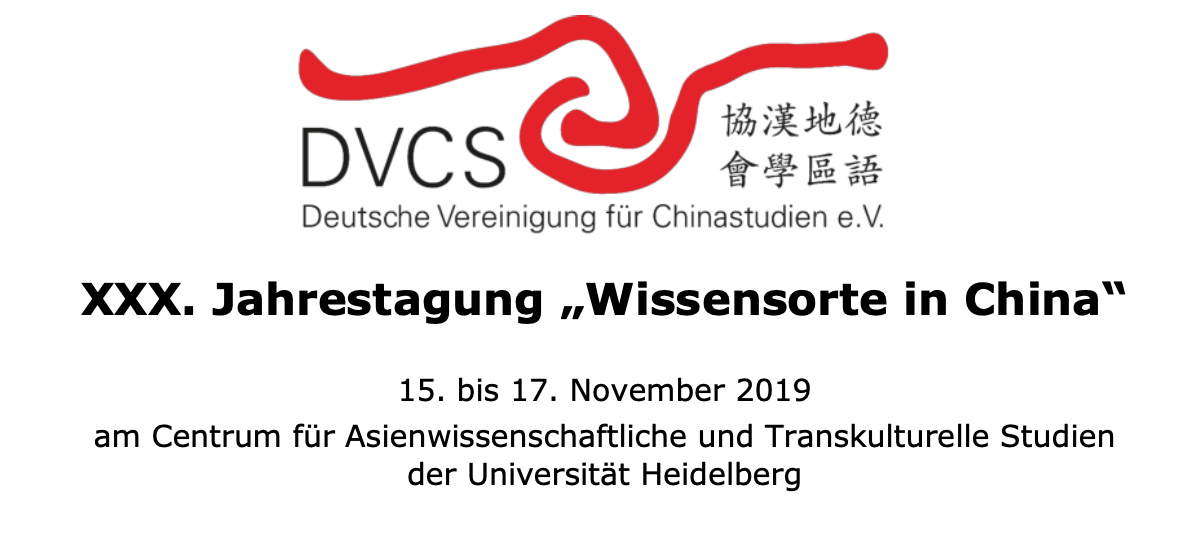
Three project members presented papers during the XXX. Annual Meeting of the German Association for China Studies ‘Places of Knowledge in China’ (XXX. Jahrestagung der Deutschen Vereinigung für Chinastudien ‘Wissensorte in China’) held in Heidelberg, 15-17 November 2019:
-
Lena Henningsen presented a paper titled “Fiktionale Literatur als Wissens-Ort”;
-
Eve Yi Lin presented a paper titled “‘Avant-Garde’ for Sale: China’s Independent Bookstores in Time of Consumerism”;
-
Damian Mandzunowski presented a paper titled “Spaces of Reading Groups—Reading Groups as Spaces”.
Read the respective abstracts here and the conference program can be downloaded here.
Papers Presented at Contemporary China Graduate Workshop 2019
2019-11-05 00:00:00 +0000

Two project members presented papers during the Contemporary China Graduate Workshop held at the University of Freiburg, 1-3 November 2019:
-
Damian Mandzunowski presented a paper titled “Communicating Three Loves: Collective Reading Activities in Early Reform Era China”.
-
Lara Yuyu Yang presented a paper titled “Archaistic Perfection: The Production of the Woodblock-Printed Edition of The Communist Manifesto in 1970s China”;
The conference program can be downloaded here.
Revolutionary Fibres: Materials and Industrial Design in Maoist China
2019-07-23 00:00:00 +0000
Guest talk by Dr. Jennifer Altehenger (King’s College London)
23.7.2019 16-18 Uhr Erbprinzenstr. 12, 79098 Freiburg
The People’s Republic of China is one of the world’s main producers of engineered woods and wood furniture today. Plywood, particleboard, and fibreboard (which can be made of different fibres including timber and bamboo) are widely used for furniture manufacture in China and abroad, and they are familiar materials to many Chinese citizens, even if they do not know it. Older generations often associate these materials with the increased availability of consumer goods brought about by the economic reforms of the “post-Mao” period after 1978. And yet, as this paper illustrates, these materials and many of the different objects made from them have a distinctly Maoist history and heritage. Throughout the first decades of CCP rule, engineers, chemists, timber experts and material scientists working in factories and research institutes, but in also in local communes, conducted experiments to find the best recipe for producing ‘modern materials’ and especially engineered woods, and for working with the woods most readily available such as bamboo. Designers in arts academies, factory workshops, and handicraft cooperatives, meanwhile, sought to create advanced furniture for the masses. The ideal socialist furniture would combine cost-efficient and durable materials with space-saving, functional, and equally cost-efficient designs. And all of this was to be easily mass-produced in advanced factories. In the end, much of this ideal furniture and many of these materials were only produced as prototypes, restricted to urban consumers, or sold for export. Still, their stories can help reconsider the history of the Mao period and explore the role materials and design were supposed to play and actually played in bringing a socialist modern into everyday life. This talk, part of a larger project on the everyday history of industrial design since 1949, will discuss these larger themes by looking at two examples in particular: research into and production of fibreboard and particleboard in Beijing and Tianjin, and the work of one experimental bamboo goods factory in Fuzhou.
Bio
Jennifer Altehenger studied at Cambridge, Qingdao and Heidelberg, and is Senior Lecturer in Contemporary Chinese History at King’s College London. She is the author of Legal Lessons: Popularizing Laws in the People’s Republic of China (Harvard Asia Center, 2018). She has also published articles and chapters on the history of propaganda, lexicography, and on China’s links to other socialist countries. Funded by the British Academy and the UK Arts and Humanities Research Council, her current work examines the history of materials and everyday industrial design in the PRC. Mit freundlicher Unterstützung des Konfuzius-Instituts an der Universität Freiburg.
Papers Presented at International Convention of Asia Scholars (ICAS) 2019
2019-07-21 00:00:00 +0000
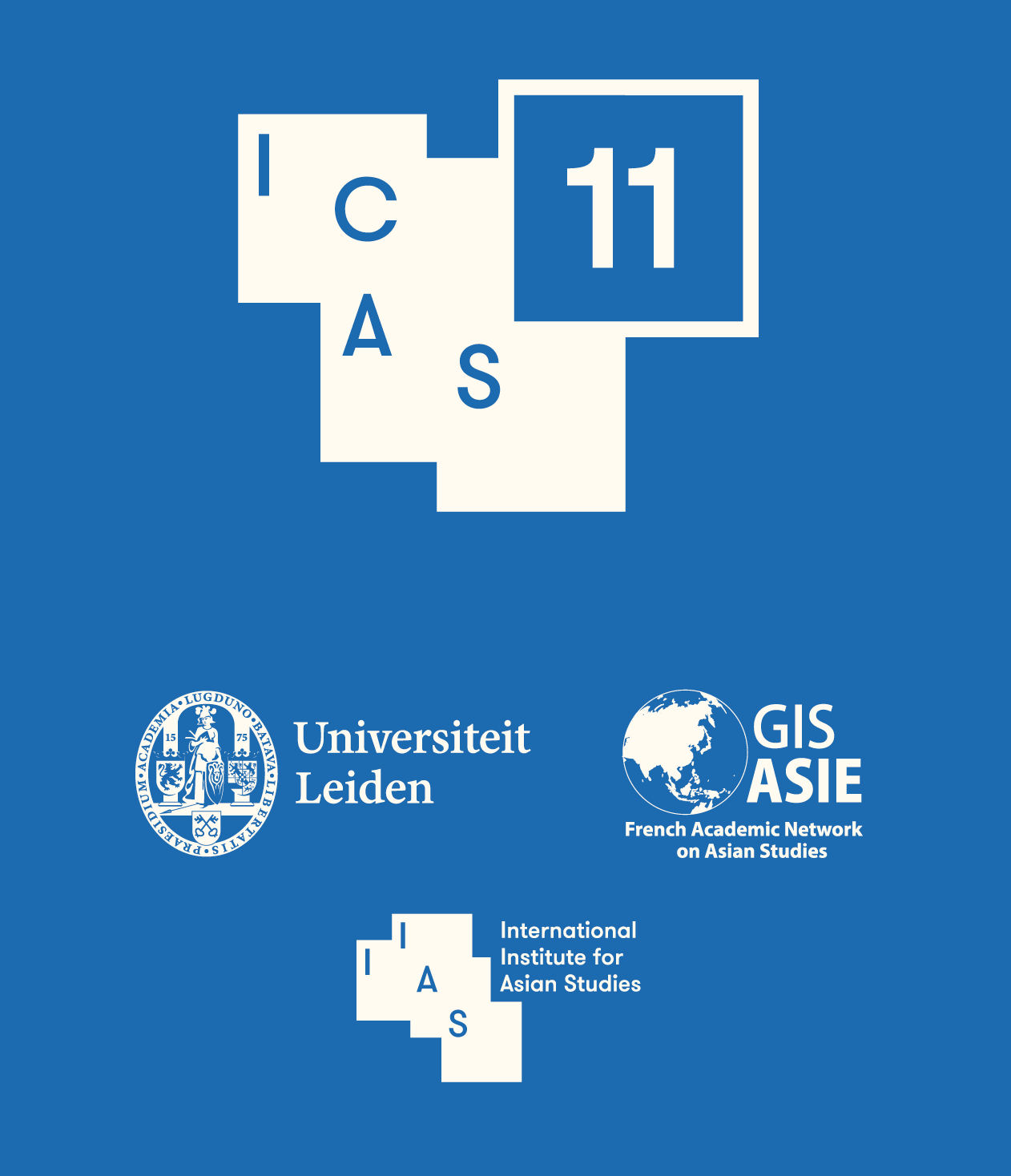
Two project members presented papers during the 11th International Convention of Asia Scholars (ICAS) held in Leiden, 16-19 July 2019:
-
Lena Henningsen presented a paper titled “Cosmopolitanism and World Literature During the Chinese Cultural Revolution”;
-
Damian Mandzunowski presented a paper titled “Reading Groups and the Pursuit of Civility in Early Reform Era Tianjin”.
The conference program can be downloaded here.
Papers Presented at Association for Asian Studies (AAS) Annual Conference 2019
2019-03-26 00:00:00 +0000
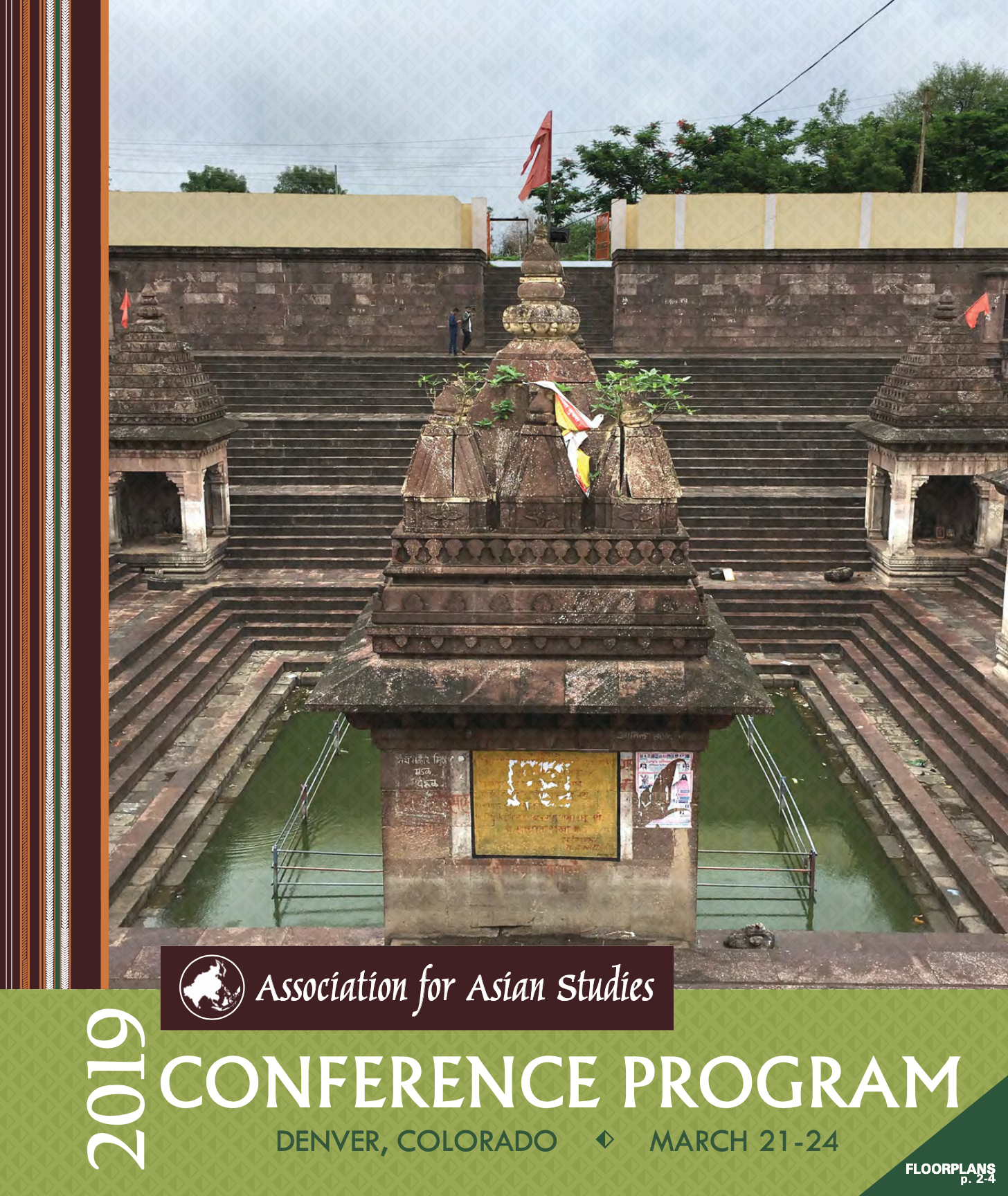
Two project members took part in the 2019 Annual Conference of the Association for Asian Studies (AAS) held in Denver, 21-24 March 2019:
-
Lena Henningsen presented a paper titled “Creative Copyist: Cultural Revolution Shouchaoben and “Secondary Authorship””;
-
Lara Yuyu Yang took part in a roundtable discussion titled “Chinese Grassroots Reading across Time”.
The conference program can be downloaded here.
The Chinese Internet: Freedom and Control on the Chinese Internet
2019-01-22 00:00:00 +0000
Guest lecture by Prof. Dr. Perry Link (UC Riverside)
 The appearance of the Internet in China gave a huge boost to free expression by Chinese citizens, not only because it provided vast new sources of information but also because it offered platforms from which people could speak to the world, whether anonymously or not. The Chinese regime, rightly perceiving a major challenge to the control of information it had long coveted, established effective systems of censoring the Internet and—even more effectively—of prescribing what should go onto the Internet in the first place. Newspapers, magazines, and websites are regularly advised about which topics to stress and which to downplay, even to the detail of which page a news item should appear upon and what size characters should be used in its headline.
The appearance of the Internet in China gave a huge boost to free expression by Chinese citizens, not only because it provided vast new sources of information but also because it offered platforms from which people could speak to the world, whether anonymously or not. The Chinese regime, rightly perceiving a major challenge to the control of information it had long coveted, established effective systems of censoring the Internet and—even more effectively—of prescribing what should go onto the Internet in the first place. Newspapers, magazines, and websites are regularly advised about which topics to stress and which to downplay, even to the detail of which page a news item should appear upon and what size characters should be used in its headline.
Bio
Perry Link teaches and writes about modern Chinese language, literature, popular culture, and politics. He is professor emeritus of East Asian Studies at Princeton University and is currently Chancellorial Chair for Teaching Across Disciplines at the University of California at Riverside. His most recent single-authored book is An Anatomy of Chinese: Rhythm, Metaphor, Politics, and he is author, co-author, or editor of nineteen other books. Two of these are widely-used Chinese language textbooks. He has written about popular Chinese fiction and the popular Chinese performing art called xiangsheng (“comedians’ dialogues”). He has translated the work of leading Chinese dissident writers including Liu Binyan, Fang Lizhi, and Liu Xiaobo, and serves on the boards of directors of several human rights organizations. He writes and does interviews for the Western press and has been a regular contributor to The New York Review of Books. His current project is a biography of Liu Xiaobo, the 2010 Nobel Peace Prize winner who died in July, 2017 while serving an eleven-year prison sentence for “suspicion of subverting the state.”
China’s Authoritarian Renaissance and the Scholarly Response
2018-12-19 00:00:00 +0000
Guest talk by Dr. Daniel Koss (Academia Sinica)
Over the past decade, scholarship on Chinese politics and society has been gaining in diversity, with significant contributions to both social science and to area studies. In addition, since the authoritarian turn of 2013, productive skepticism has replaced previously confident arguments about the gradual institutionalization of Chinese authoritarianism, the superiority of quasi- liberal tactics even in the country’s non-democratic setting, an advance of market regulation in economic governance, and optimism about accommodating the rising global power into the existing international order. There are indications that the search for better-fitting arguments will result in fruitful dialogue between area specialists and social scientists, while avoiding the risk of China being classified as one of the rare remaining cases of fully functional, unambiguously non-democratic regimes. The veil of ignorance over the question whether strong-armed methods signify unparalleled strength, or rather whether China’s authoritarian renaissance is headed for an impasse, is already provoking vivid debate.
Bio
Daniel Koss is an Assistant Research Fellow at the Institute of Political Science at Academia Sinica, Taipei; and an Academy Scholar at the Harvard Academy for International and Area Studies. He studies political parties through cases from East Asia, with a distinct focus on historical legacies and their transmission to the present. His first book is on the Chinese Communist Party, and his articles have appeared in The Journal of Asian Studies and Studies of Comparative International Development.
Cinema at the Grassroots: Film Exhibition and Reception in Mao’s China
2018-12-01 00:00:00 +0000
Guest lecture by Prof. Dr. Jie Li (Harvard University)
The field of Chinese cinema studies has flourished over the last three decades, but most scholars have focused on film texts and their production histories. What did cinema mean to their audiences in China? How were films shown, experienced, and remembered at the grassroots? My book project shifts the focus from “Chinese cinema” to “cinema in China” by examining exhibition, reception, and audiences. It does so by asking three sets of questions: Where were the movies in China? Who showed and watched movies? What did audiences see and remember from the films? Whereas most existing studies consider cinema as a manifestation of urban modernity, cinema at the grassroots refers to movie screening sites in villages, townships, and counties as well as urban factories and neighborhoods, and cinemagoing as a part of people’s everyday lives. I also consider grassroots as a methodological approach that is both bottom-up and reception-oriented, drawing on local archives, flea market materials, oral histories, memoirs, and ethnographic fieldwork.
Bio
Jie Li is a John L. Loeb Associate Professor of the Humanities at the Department of East Asian Languages and Civilizations at Harvard University. She is the author of Shanghai Homes: Palimpsest of Private Life and co-editor of Red Legacies in China: Cultural Afterlives of the Communist Revolution.
Relationale Sinologie? Netzwerkanalyse als Tool für die sinologische Forschung
2018-11-14 00:00:00 +0000
Guest talk Dr. Henrike Rudolph (Erlangen University)
Dieser Workshop soll eine Einführung in die Methoden und Theorien der historischen Netzwerkforschung geben und einige Beispiele zu Netzwerkforschungen aus dem Bereich der Sinologie vorstellen. Das Hauptaugenmerk des Workshops liegt jedoch auf der praktischen Arbeit mit Netzwerken. Wir wollen gemeinsam Ideen entwickeln, wie man Netzwerkvisualisierungen und -analysen in kleinem Rahmen in eigene Seminar- und Abschlussarbeiten einbauen kann, wie man Daten dafür aufbereiten und strukturieren muss und welche Hilfsmittel zur Visualisierung zur Verfügung stehen. Softwarekenntnisse (und auch Chinesisch-Kenntnisse) werden nicht vorausgesetzt, sodass auch Studierende der ersten Bachelorsemester eingeladen sind, am Workshop teilzunehmen.
Bio
Henrike Rudolph ist wissenschaftliche Mitarbeiterin am Institut für Sinologie der Universität Erlangen. Sie hat in Hamburg Sinologie und Politikwissenschaften studiert und wurde dort 2017 mit einer Arbeit über das Gesundheitswesen während der Republikzeit promoviert. Zu ihren Forschungsinteressen gehören neben der Historischen Netzwerkforschung die Minderheitenparteien im modernen China, Bildungsgeschichte sowie die Geschichte der deutsch-chinesischen Beziehungen
I Just Want to Be Normal
2018-09-11 00:00:00 +0000
Conference Talk at TEI 2018 Tokyo, Japan
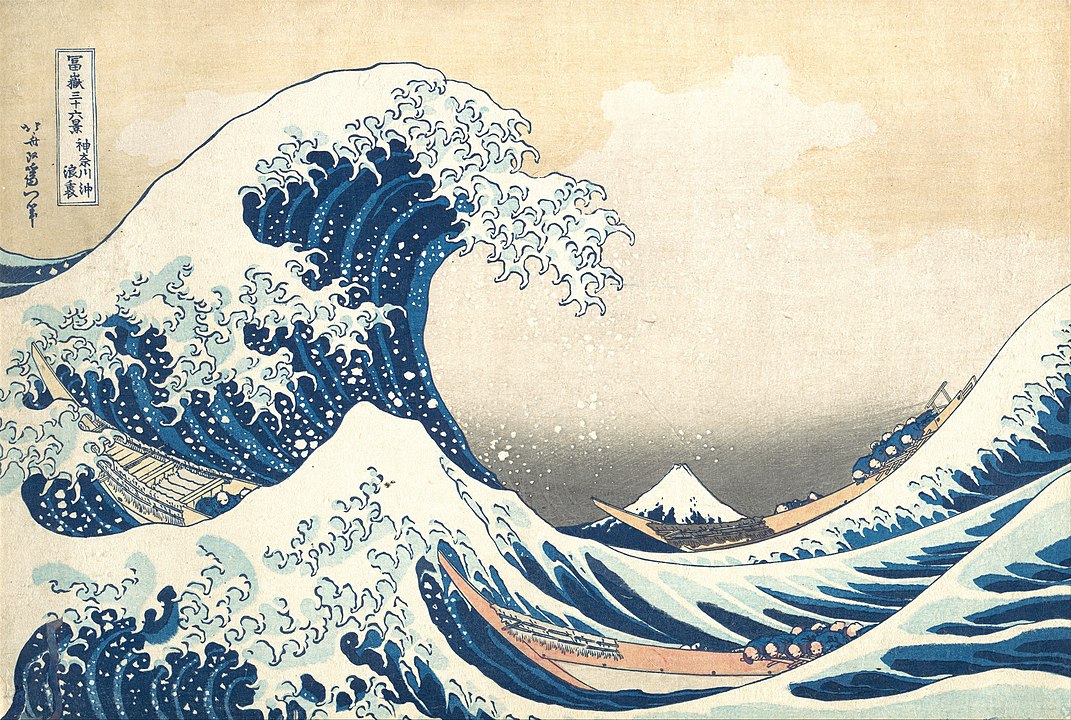
Duncan Paterson joined fellow panelist on Confronting Challenges in Marking Up Pre-modern East Asian Documents to present his work on character normalization in Unicode and TEI.
The work presented at the conference is based on a number of technical issues whose implementation and discussion can be found at the TEI central repository issue tracker.
Paper Presented at European Association for Chinese Studies (EACS) Biennial Conference 2018
2018-09-03 00:00:00 +0000

One project member presented a paper during the 2018 Biennial Conference of the European Association for Chinese Studies (EACS) held in Glasgow, 29 August-1 September 2018:
- Lena Henningsen presented a paper titled “China on the map of world literature during the ‘long 1970s’”; read the abstract here.
The conference program can be downloaded here.
Papers Presented at Association for Asian Studies (AAS) Annual Conference 2018
2018-03-27 00:00:00 +0000
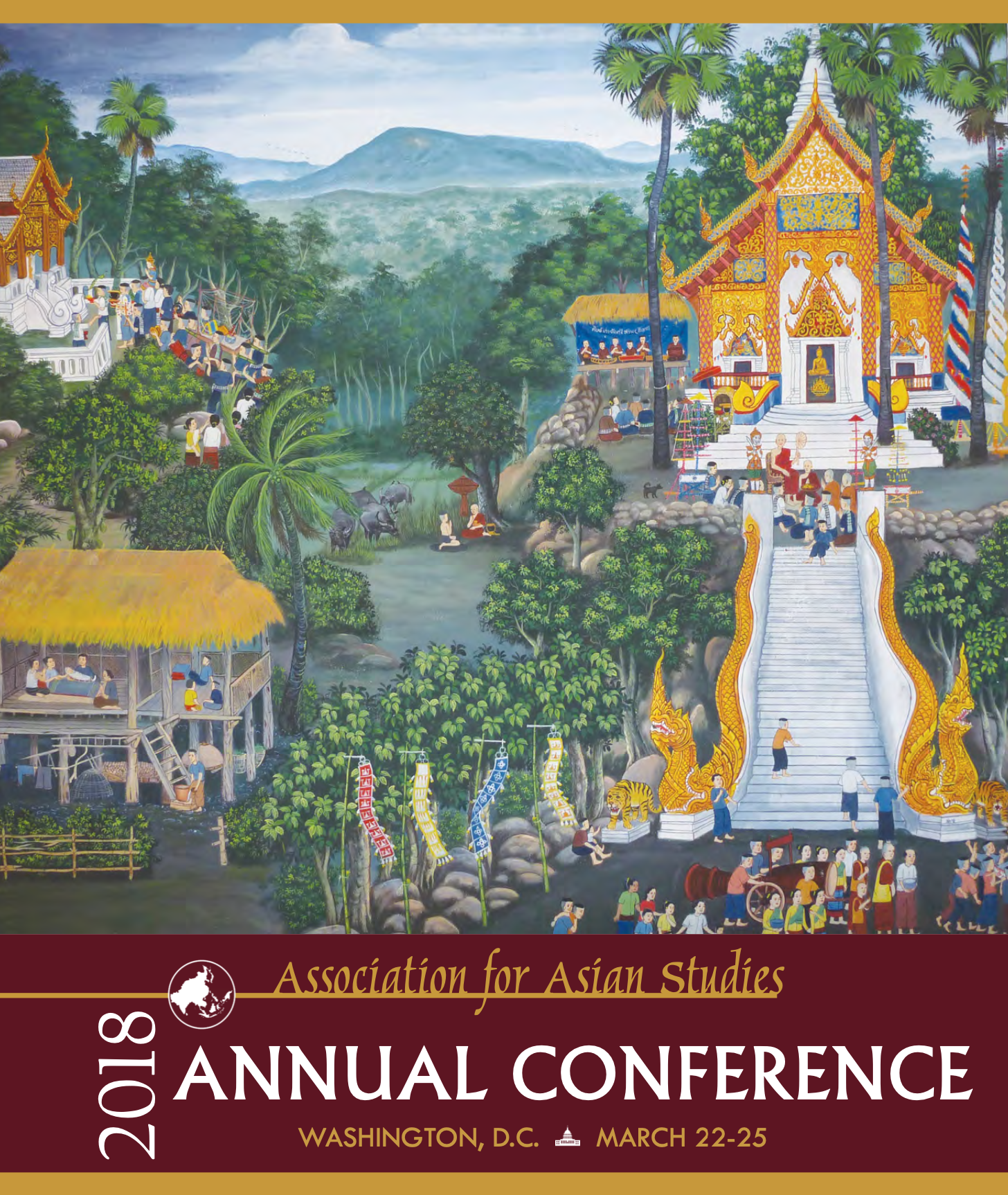
Three project members presented papers during the 2018 Annual Conference of the Association for Asian Studies (AAS) held in Washington, D.C., 22-25 March 2018:
-
Lena Henningsen presented a paper titled “Reading That Matters! Life-Writing about Reading Practices in 1970s China”;
-
Lara Yuyu Yang presented a paper titled “Archaism in Book Culture in the Mao Era”;
-
Damian Mandzunowski presented a paper titled “Caricaturing Jiang Qing: Manhua and the Anti-Gang of Four Campaign, 1976-1981”.
The conference program can be downloaded here.

